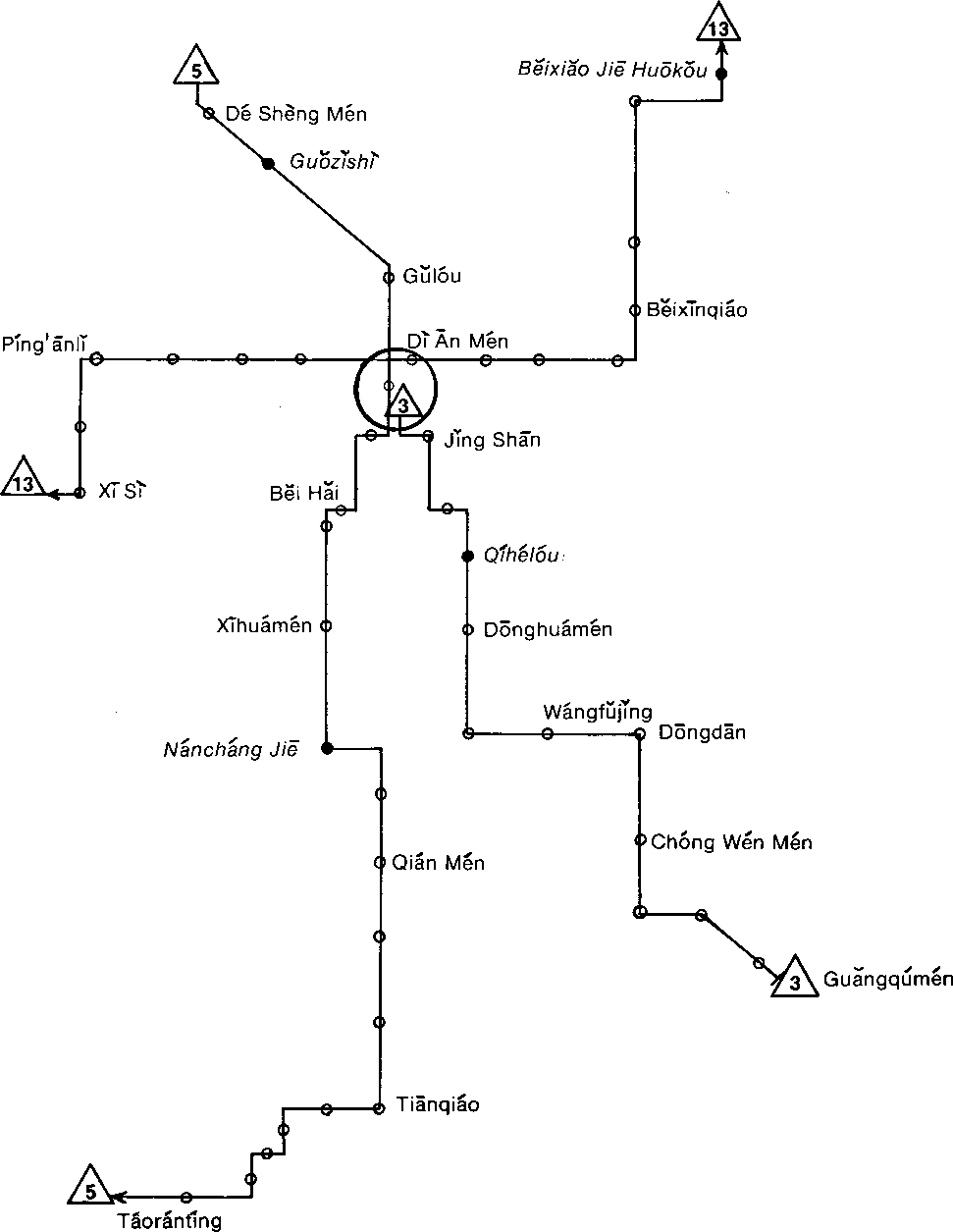
A MODULAR APPROACH
STUDENT WORKBOOK
MODULE 5: TRANSPORTATION
MODULE 6: ARRANGING A MEETING
AUGUST 1979
Copyright ©1980 by John H. T. Harvey, Lucille A. Barale, Roberta S. Barry, and Thomas E. Madden
Standard Chinese: A Modular Approach originated in an interagency conference held at the Foreign Service Institute in August 1973 to address the need generally felt in the U.S. Government language training community for improving and updating Chinese materials to reflect current usage in Beijing and Taipei.
The conference resolved to develop materials which were fléxible enough in form and content to meet the requirements of a wide range of government agencies and academic institutions.
A Project Board was established consisting of representatives of the Central Intelligence Agency Language Learning Center, the Defense Language Institute, the State Department’s Foreign Service Institute, the Cryptologic School of the National Security Agency, and the U.S. Office of Education, later joined by the Canadian Forces Foreign Language School. The representatives have included Arthur T. McNeill, John Hopkins, and John Boag (CIA); Colonel John F. Elder III, Joseph C. Hutchinson, Ivy Gibian, and Major Bernard Muller-Thym (DLl); James R. Frith and John B. Ratliff III (FSl); Kazuo Shitama (NSA); Richard T. Thompson and Julia Petrov (OE); and Lieutenant Colonel George Kozoriz (CFFLS).
The Project Board set up the Chinese Core Curriculum Project in 197^ in space provided at the Foreign Service Institute. Each of the six U.S. and Canadian government agencies provided funds and other assistance.
Gerard P. Kok was appointed project coordinator, and a planning council was formed consisting of Mr. Kok, Frances Li of the Defense Language Institute, Patricia O’Connor of the University of Texas, Earl M. Rickerson of the Language Learning Center, and James Wrenn of Brown University. In the fall of 19775 Lucille A. Barale was appointed deputy project coordinator. David W. Dellinger of the Language Learning Center and Charles R. Sheehan of the Foreign Service Institute also served on the planning council and contributed material to the project. The planning council drew up the original overall design for the materials and met regularly to review their development.
Writers for the first half of the materials were John H. T. Harvey, Lucille A. Barale, and Roberta S. Barry, who worked in close cooperation with the planning council and with the Chinese staff of the Foreign Service Institute. Mr. Harvey developed the instructional formats of the comprehension and production self-study materials, and also designed the communication-based classroom activities and wrote the teacher’s guides. Lucille A. Barale and Roberta S. Barry wrote the tape scripts and the student text. By 1978 Thomas E. Madden and Susan C. Pola had joined the staff. Led by Ms. Barale, they worked as a team to produce the materials subsequent to Module 6.
All Chinese language material was prepared or selected by Chuan 0. Chao, Ying-chih Chen, Hsiao-Jung Chi, Eva Diao, Jan Hu, Tsung-mi Li, and Yunhui C. Yang, assisted for part of the time by Chieh-fang Ou Lee, Ying-ming Chen, and Joseph Yu Hsu Wang. Anna Affholder, Mei-li Chen, and Henry Khuo helped in the preparation of a preliminary corpus of dialogues.
Administrative assistance was provided at various times by Vincent Basciano, Lisa A. Bowden, Jill W. Ellis, Donna Fong, Renee T. C. Liang, Thomas E. Madden, Susan C. Pola, and Kathleen Strype.
The production of tape recordings was directed by Jose M. Ramirez of the Foreign Service Institute Recording Studio. The Chinese script was voiced by Ms. Chao, Ms. Chen, Mr. Chen, Ms. Diao, Ms. Hu, Mr. Khuo, Mr. Li, and Ms. Yang. The English script was read by Ms. Barale, Ms. Barry, Mr. Basciano, Ms. Ellis, Ms. Pola, and Ms. Strype.
The graphics were produced by John McClelland of the Foreign Service Institute Audio-Visual staff, under the general supervision of Joseph A. Sadote, Chief of Audio-Visual.
Standard Chinese: A Modular Approach was field-tested with the cooperation of Brown University; the Defense Language Institute, Foreign Language Center; the Foreign Service Institute; the Language Learning Center; the United States Air Force Academy; the University of Illinois; and the University of Virginia.
Colonel Samuel L. Stapleton and Colonel Thomas G. Foster, Commandants of the Defense Language Institute, Foreign Language Center, authorized the DLIFLC support necessary for preparation of this edition of the course materials. This support included coordination, graphic arts, editing, typing, proofreading, printing, and materials necessary to carry out these tasks.
/ / James R. Frith, Chairman
1/ Chinese Core Curriculum Project Board
MODULE 5: TRANSPORTATION
UNIT 2 C-2 Workbook......................
MODULE 6: ARRANGING A MEETING
UNIT 2
UNIT 3
C-2 Workbook.....................
UNIT 1+
UNIT 5
UNIT 6
UNIT 7
UNIT 8
The vocabulary in this exercise is useful for traveling by bus. There are two short conversations. The first conversation takes place between an American man and a Chinese woman at a bus stop in Beijing. The second is between the American man and the ticket seller on a bus.
You will hear each conversation three times. The third time, each sentence will be followed by a pause. During each pause, translate into English. Then compare your version with the suggested translation given on tape.
Here are some expressions you will need for this exercise: shàng ban; xià ban liǎngsān biéde shíhou Běihǎi Gōngyuán gàosu zhǔnbèi
(to go to work; to leave wor (two or three)
(other times)
La famous park in Běijīngl
Lalternate pronunciation for gàosong, "to tell"l]
(to prepare, to get ready)
This exercise will give you more practice with words used in bus travel. You will hear this conversation, between an American student and a Chinese student in Taipei, three times. After listening to it for the second time, answer the questions on the next page.
Here are some expressions you will need for this exercise: shǎo (to be few)
siJi (driver of a hired vehicle)
huì (will)
Wo bú tai qīngchu. (I’m not too clear on that.)
QUESTIONS
1. How long has the American been in Taipei?
2. What is the American going to do today?
3. How many stores are there in Ximending?
( ) a few ( ) not too many ( ) quite a few ( ) many
U. What bus is the American advised to take?
5. Where is he supposed to board the bus?
( ) at the outside door of the school
( ) at the gate outside the school
( ) outside the school entrance
6. How often does the bus run? _________________________________________
This exercise will give you more practice with words used to discuss a trip. You will hear the conversation, between an American student and his Chinese friend in Taipei, three times. As you listen to it for the third time, answer the questions below.
|
Here are some expressions you will need for this exercise: | |
|
fang Jià |
(to close for a holiday) |
|
chuán |
(ship, boat) |
|
wèishénme |
(why) |
|
hǎowán |
(to be fun Clit., "good for relaxing”!) |
|
Jīlóng |
Ca city in Taiwan! |
|
Gōnglùjú |
(Bureau of Highways CTaiwan!) |
QUESTIONS
1. Where is the American going on his vacation?
2. Where does he have to go to board the boat?
3. Has he been there before? ( ) Yes ( ) No
U. For which bus run does the American want to know the time schedule?
( ) the first ( ) the last
This exercise is a series of questions about what bus routes go where. The information you will need to answer the questions is given in Display I, a map of the Běijīng bus routes.
The following example is the first item on the tape.
TAPE: Cong Qian Men dào Xī Si zuò jīlù chē?
YOU: Zuò Ērshièrlù chē.
TAPE: Guòle Xī Si, xià yízhàn shì bu shi Píng’ānlī?
YOU: Xià yízhàn bú shi Píng’ānlī?
TAPE: Ērshièrlù chē shì bu shi qù Dì An Men?
YOU: Bu. qù. Èrshièrlù chē bú qù DÌ An Men.
This exercise contains the names of many places in Běijīng, most of which you have probably never had the chance to pronounce. Therefore you will need to rely on your ability to read Pinyin romanization.
This exercise gives you an opportunity to describe when one person is doing something in relation to when another person is doing something.
Using the information in Display II, you will answer questions about the activities of the four persons listed there. These four persons are representatives of a Taipei publishing firm. Each will be in a particular city for one calendar month. The display shows when they will be in what cities on business.
Here is an example from the exercise:
TAPE: Lī Xiānsheng jīyuè qù Taizhōng gōngzuò?
YOU: Tā Jiǔyue qù Taizhōng gōngzuò.
TAPE: Tā zài Taizhōngde shíhou, Zhào Xiǎojiě zài nāli?
YOU: Lī Xiānsheng zài Taizhōnde shíhou, Zhào Xiǎojiě zài Jīlōng.
TAPE: Zhāng Xiānsheng ne?
YOU: Lī Xiānsheng zài Taizhōngde shíhou, Zhāng Xiānsheng zài
- Xianggang.
DISPLAY I
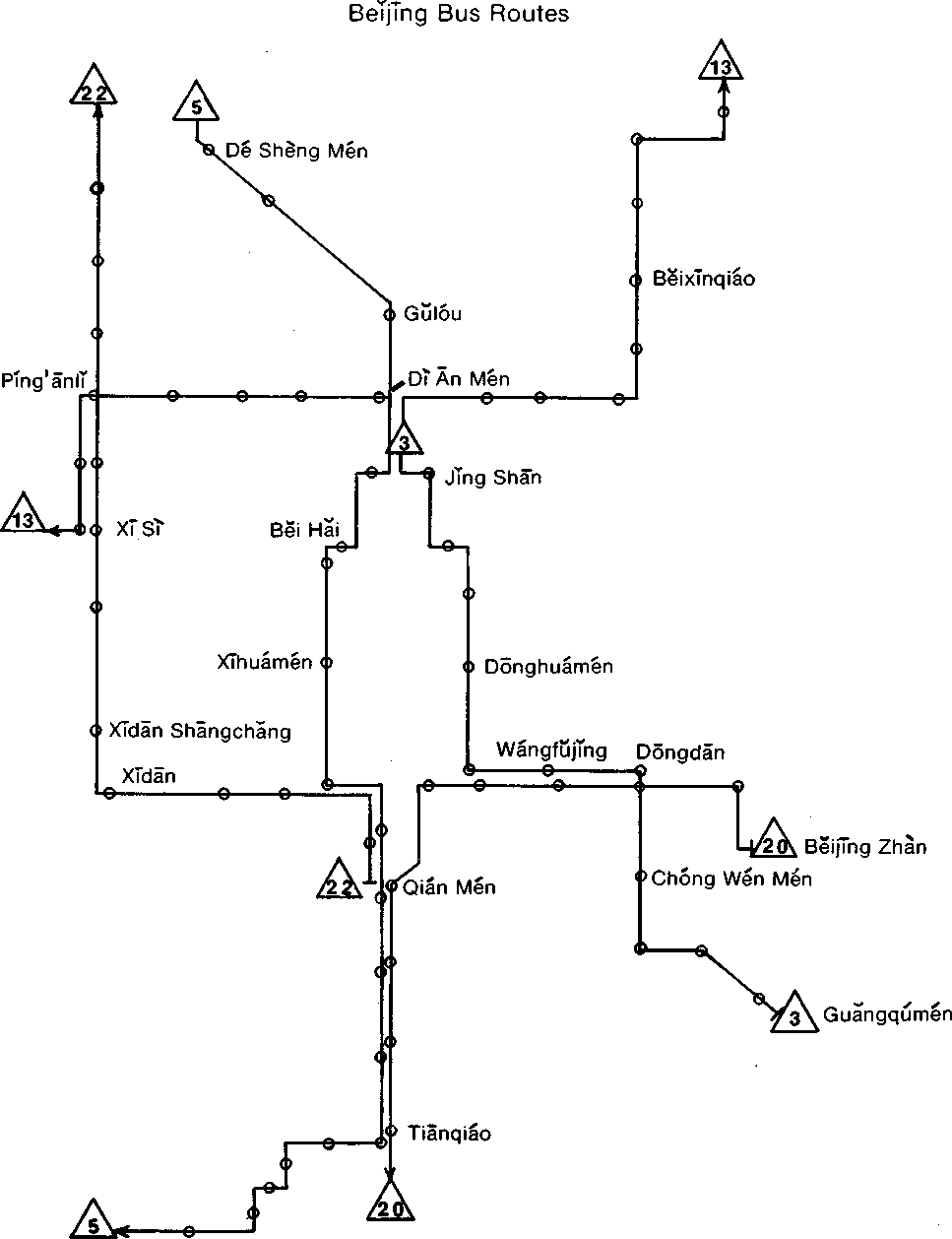
Táoránfírig
For this exercise, you will need the word Dōngjīng, ’’Tokyo."
DISPLAY II
SEPTEMBER
OCTOBER
NOVEMBER
Mr.- Lǐ Miss Zhao Mr. Zhāng Miss Lin
|
Taizhong |
Jilong |
Hong Kong |
Tokyo (Dōngjīng) |
|
Tokyo (Dōngjīng) |
Tainan |
San Francisco |
Taizhong |
|
Hong Kong |
Gaoxiong |
Tokyo (Dōngjīng) |
San Francisco |
In this exercise you take the part of a visitor in Beijing. You are interested in visiting some of the sights in the suburbs of the city. Before you make plans to visit these places, you need to find out information concerning the transportation going there. (What bus? How often do they run? How late do they run?)
Display III lists the places you are thinking of visiting. Fill in the information about transportation to each place.
Here is an example from the tape:
YOU: Dao Yìhéyuán qù, zuò jīlù chē?
TAPE: Zuò Sānshièrlù chē.
YOU: Sānshièrlù chē duō bu duo?
TAPE: Hen duō.
YOU: Měi gé duōshao shíhou you yìbān chē?
TAPE: Měi gé èrshifēn zhōng you yìbān chē.
YOU: Zuìhòu yìbān chē shi yīdiǎn zhōng?
TAPE: Liùdiǎn zhōng.
DISPLAY III
BUS NUMBER NUMEROUS? HOW OFTEN? HOW LATE?
|
Yìhéyuán (SUMMER PALACE) From Yìhéyuán to Xiāng Shān (FRAGRANT HILLS) Shísānlíng (MING TOMBS) Lugōu Qiao (MARCO POLO BRIDGE) | ||||
You will act as an interpreter in this conversation between two students in Taipei. The woman has recently come from the United States.
First, you will hear the conversation without interruptions. Then it will be presented as if the woman cannot speak Chinese and the man cannot speak English. Each speaker’s lines will be followed by a pause on tape, during which you will translate.
Example
AMERICAN: Today is Sunday. Where do you want to go?
YOU: Jīntiān shi Xīngqītiān. Nǐ yào dào náli qù?
CHINESE: Wǒ xiǎng dào Xīméndīng qù kàn diànyǐng.
YOU: I would like to go to Ximending to see a movie.
You will need these words in the exercise: yìqǐ (together)
sījī (driver of a hired vehicle)
zǒu ba (let’s go)
INSTRUCTIONS:
Type: Fact Gathering
Situation: You are involved in a survey of commuters who return home from the Dì An Men area, where three bus lines meet. You have collected information about four commuters. You need to find out the information which three colleagues have collected about twelve other commuters.
Goal: To fill in information about twelve commuters on your work sheet and to identify on your map the stops where they get off.
Number of Players: Groups of four students.
Materials: A work sheet and map for each player. (See Sample Work Sheets and Maps, on the following pages.)
Your work sheet contains the following information about four commuters: 1) the buses they take; 2) the times when they leave Dì Ān Men; 3) how frequently buses run on those lines at those times; H) the names of stops where the commuters get off; and 5) (if commuters work late shifts) the time of the last bus on those lines.
Besides indicating the stops known by all four players, the map also identifies (in italics) the four stops at which the commuters listed on your work sheet get off.
Procedure: Mingle with the players in your group to exchange information. See the example below for the procedure involved in locating stops.
Example: You are Speaker 1 (Si). In this example, you are giving information rather than collecting it, to show how you read the work sheet and map. Notice how you "introduce” one of the commuters described on your work sheet with You yíge rén....
SI: You yíge rén shídiān zhōng zǒu.
S2: Tā zuò jǐlù chē?
SI: Tā zuò Shísānlù chē.
S2: Nèige shíhou Shísānlù chē měi gé duōshao shíhou you yìbān?
SI: Měi gé bāfēn zhōng you yìbān.
S2: Tā zuò Shísānlù chē cháo něibianr zǒu?
SI: Cháo dōngbianr zǒu.
S2: Tā zāi nār xià chē?
SI: Tā zāi Guǒzǐ Jiàn xià chē.
S2: Cong Dì Ān Mén zuò jǐzhàn jiù dào le?
SI: Zuò wǔzhàn jiù dào le.
S2: Zuìhòu yìbān chē shi J ǐdiān zhōng?
SI: Shi shíyīdiān zhōng.
SAMPLE WORK SHEET (MAP):
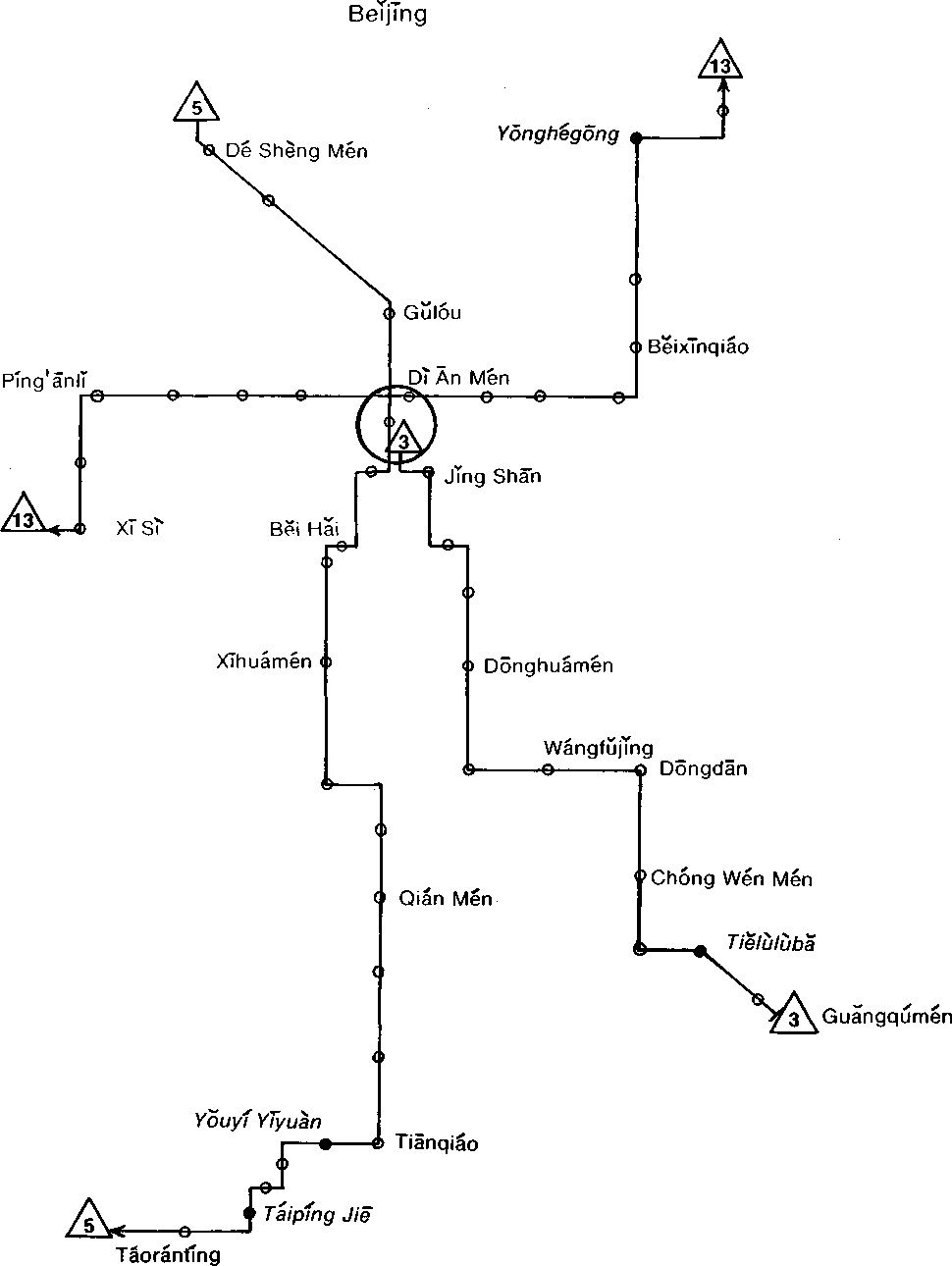
|
I TAKES NO. __ BUS FROM Dì AN MÉN |
LEAVES Dì AN MÉN AT ___:___ |
BUSES EVERY ___ MINUTES AT THAT TIME |
GETS OFF AT THE ______ STOP1 |
(LAST BUS AT ___:___) |
|
5 |
9:30 |
5 |
Guozǐshì | |
|
13 |
5:00 |
u |
Běixiǎo Jiē Huōkǒu | |
|
5 |
5:30 |
2 |
Náncháng Jiē | |
|
3 |
5:00 |
3 |
Qíhēlóu | |
SAMPLE WORK SHEET (MAP):
BéíjTng

|
TAKES NO. __ BUS FROM Di AN MÉN |
LEAVES DÌ AN MÉN AT ___:___ |
BUSES EVERY ___ MINUTES AT THAT TIME |
GETS OFF AT THE ______ STOP2 |
(LAST BUS AT ___:___) |
|
13 |
U:30 |
3 |
Kuān Jiē | |
|
13 |
10:00 |
T |
Baozi Hutong |
11:00 |
|
5 |
5:00 |
3 |
Zhūshìkǒu | |
|
3 |
5:30 |
3 |
Huāshì Dàjiē | |
SAMPLE WORK SHEET (MAP):
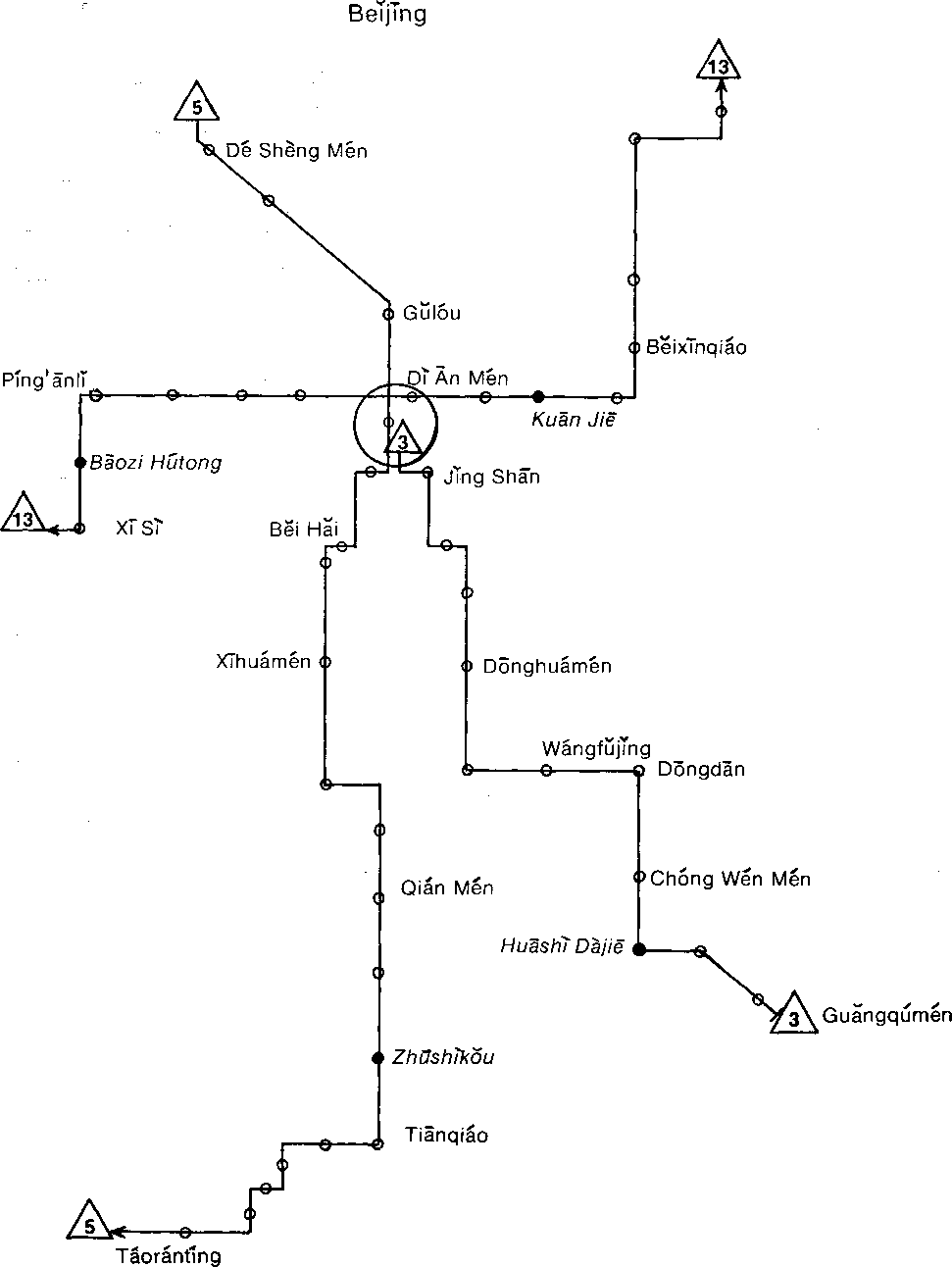
|
TAKES NO. __ BUS FROM Dì AN MÉN |
LEAVES Dì AN MÉN AT ___:___ |
BUSES EVERY ___ MINUTES AT THAT TIME |
GETS OFF AT THE ______ STOP3 |
(LAST BUS AT ___:___) |
|
13 |
6:30 |
U |
Guǒzǐ Jiàn | |
|
13 |
5:00 |
3 |
Chǎngqiáo | |
|
5 |
l+:30 |
2 |
Dàzhālàn | |
|
3 |
6:00 |
3 |
Nanhéyán | |
SAMPLE WORK SHEET (MAP):
BeíjTng
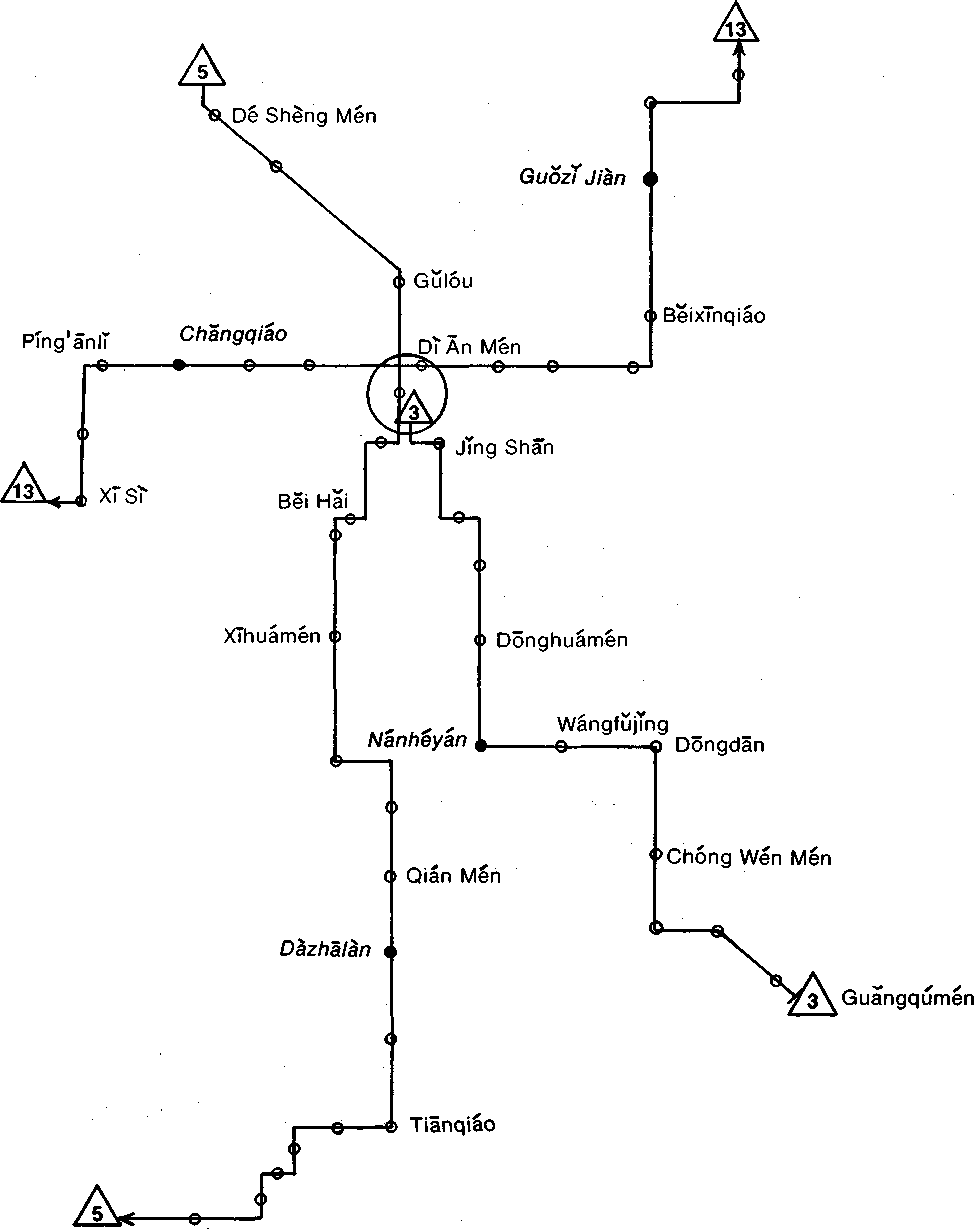
Táoránfíríg
In this exercise you will hear instructions for changing buses. Comrade Sun, a newcomer to Beijing, is talking to Comrade Huang, a longtime resident. You will hear the conversation three times. As you listen to it for the third time, answer the questions below.
Here are some expressions you will need for this exercise:
Xiao Mǎ (Little Mǎ Cfamiliar form of name,
used among friends!)
zuìhǎo (it would be best)
bijiao (comparatively)
QUESTIONS
1. Comrade Sūn, the newcomer to Beijing,
( ) didn’t go to the exhibition hall until last week.
( ) is going this week.
( ) isn’t going until next week.
2. Comrade Sūn has to change buses
( ) from No. 7 to No. 10.
( ) from No. 10 to No. 15.
( ) from No. 15 to No. 10.
3. The exhibition hall has
( ) more people before ten o’clock.
( ) fewer people before ten o’clock.
( ) more people after ten o’clock.
( ) fewer people after ten o’clock.
In addition to instructions for changing buses, you will hear, in this conversation, ne used in negative sentences containing hái.
An out-of-town cadre who has come to Beijing on official business is staying at a hostel. In this exercise she is talking to a local cadre.
As you listen to the conversation for the third time, translate each sentence orally during the pause provided on tape. Then compare your translation with the suggested translation given by the speaker.
Here are six words you will need to know:
|
wánr |
(to enjoy oneself) |
|
dongwùyuán liangcì jiù |
(zoo) (two times, twice) (exactly CWǒ jiù shi yào qù kàn xiongmāo, "Seeing the panda is exactly what I want to do."]) |
|
xióngmāo Andìngmén |
(panda) Ca neighborhood in Beijing! |
You will hear this conversation, between two Chinese cadres in Beijing, three times. Answer the questions below as you listen for the third time.
The following expressions are in the conversation:
shēng bìng (to get sick)
dàifu (doctor)
zhù yīyuàn (to stay in a hospital)
QUESTIONS
1. When are the cadres going to visit their sick friend? ( ) before work ( ) after work
2. What bus do they take to go to the hospital?
3. Do they go past their stop? ( ) Yes ( ) No
This exercise is a series of questions asking how to get from one place to another by bus in Beijing. Answering these questions will give you practice in using the structures and vocabulary introduced in this unit.
Display I, a map, shows bus routes in Beijing and points at which you can transfer. Use this information to answer the questions on tape.
Example
TAPE: Cong Tiānqiáo dào Xīdān Shāngchǎng qù, zuò jǐlù chē?
YOU: Zuò Ershilù chē. Zuòdao Qian Men huàn chē.
TAPE: Huàn jǐlù chē?
YOU: Huan Ershierlu chē.
TAPE: Èrshièrlù chē shì bu shi yě qù Dì Ān Men?
YOU: Bu qù. Ershièrlù chē bu qù Dì Ān Men.
If it takes two buses to get to a certain place, give the number of the first bus and simply say where it is necessary to change buses. You will then be asked for the number of the second bus.
DISPLAY I
BeTjTng Bus Routes
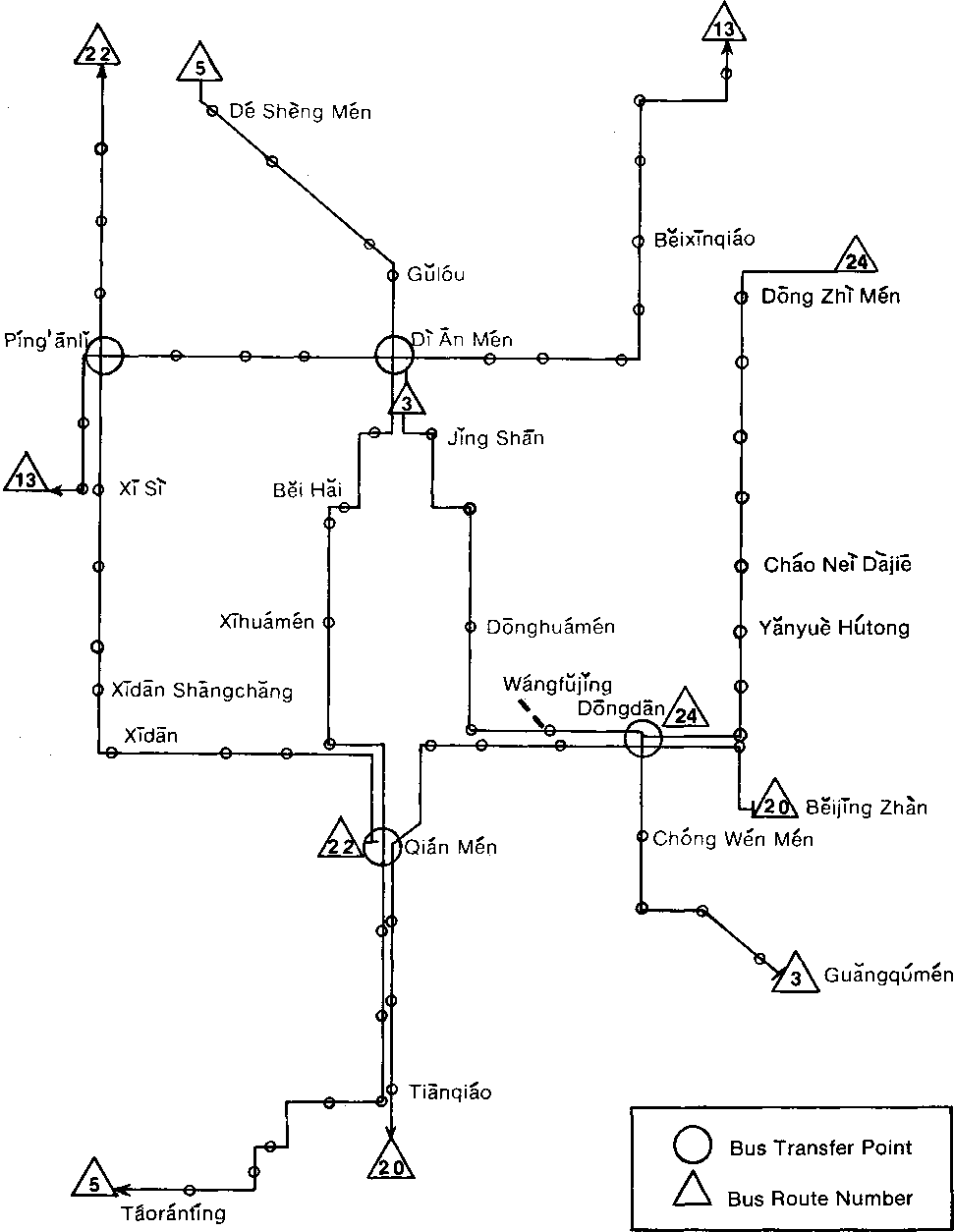
In this exercise you will answer questions about eight bus trips you are taking in Taiwan. As you talk about each trip, assume that you are in fact taking the bus trip then.
Display II consists of eight maps showing your bus trips. Each map shows your starting point, your destination, and. the place where you are (an X) at the time of the conversation. Use this information to answer the questions on tape.
Example (using the first map)
TAPE: Nǐ dào náli qù?
YOU: Wǒ dào Línkǒu qù.
TAPE: Nǐ shi zài náli shàngde chē?
YOU: Wǒ shi zài Taiběi shàngde chē.
TAPE: Wǒ yě dào Línkǒu qù. Women guòle Xīnzhuāng le ma?
YOU: Hai mei guò ne.
Notice that in the sentence Women guòle Xīnzhuāng le ma? "Did we pass Xinzhuang?” the marker le is used twice.
Up until now in your study, the use of two le markers in a sentence meant that the situation or action was described AS OF NOW. That is, the situation or action might change in the future. This meaning was used with regard to the amount of the object, as in
Wǒ māile liǎngběn shū le. (I have bought two books Cso far!.) One main difference between this sentence and Women guòle Xīnzhuāng le ma? is that the latter does NOT have an amount object. When two le markers are used in a sentence containing a nonamount object, the meaning is simply completed action, as in
Wǒ maile shū le. (I bought books.)
Women guòle Xīnzhuāng le. (We passed Xinzhuang.)
DISPLAY II
Bus Routes in Taipei Area
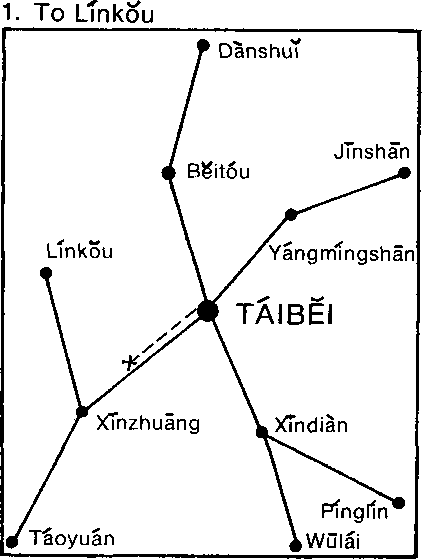
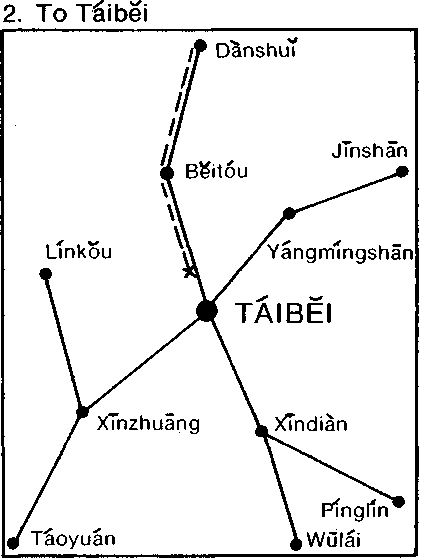
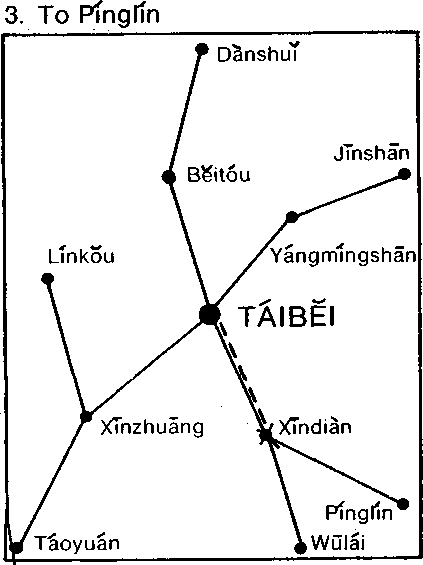
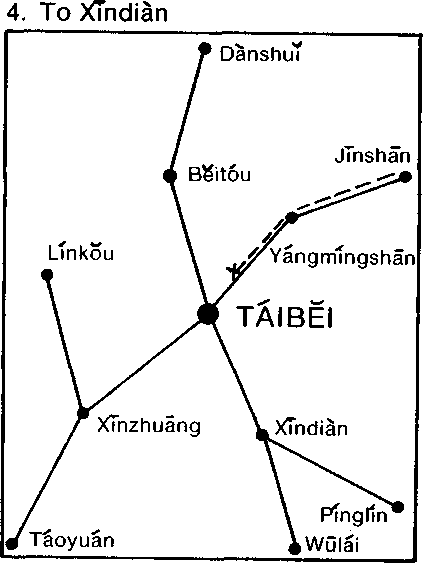
Bus Routes in Taipei Area
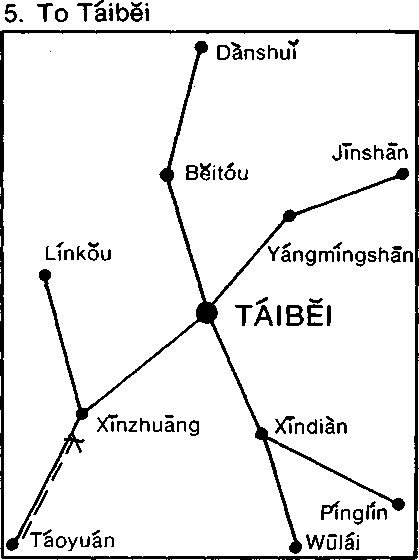
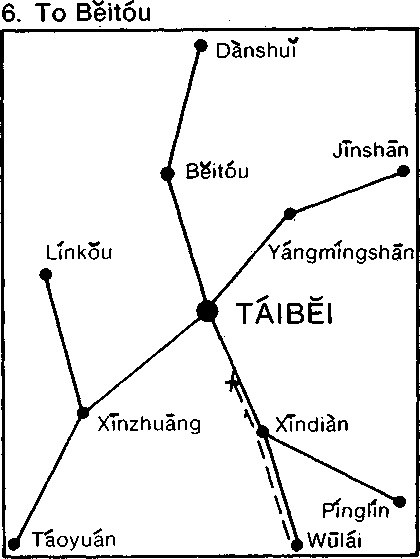
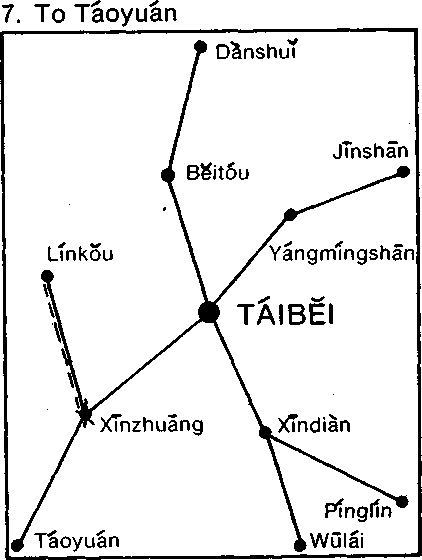
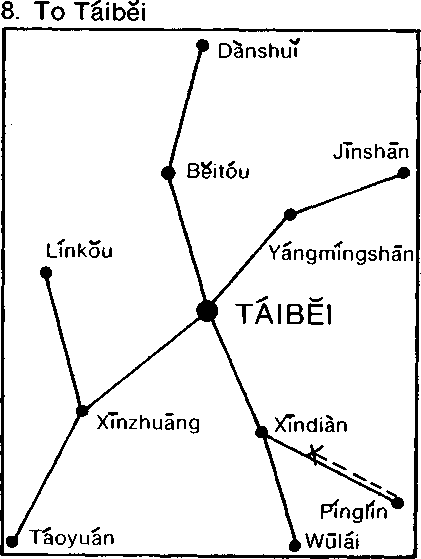
In this exercise you ■will answer questions about the activities of five people during one day. Display III shows what the people have done or are going to do. (At the time you are answering these questions, it is 2 p.m. that day.)
Example
TAPE: Sūn Zhènhàn shi shénme shíhou qù kànde péngyou?
YOU: Tā māile dōngxi, jiù qù kàn péngyou qu le.
TAPE: Tā shi shénme shíhou dào Dìyī Gōngsī qùde?
YOU: Hái méi qù ne. Tā huànle qián, cái dào Dìyí Gōngsī qù.
As you can see, for each question you will give more information than is asked for. Sometimes you are affirming and adding to what the questioner supposed. Sometimes you are correcting his supposition and supplying the right information.
Make sure that you use Jiù and cái, both meaning ’’then,” properly: When talking about a completed action, use jiù. When talking about a future action which is LATER than expected, use cái.
Notice that the marker le in the first clause of a description of action sequence does not occur in the same position as the marker le in a full sentence. The marker le used in a dependent clause comes directly after the verb.
You will need the phrase xià bān, "to get off work," in this exercise.
DISPLAY III
NOW
8-10 a.m. 10 a.m.-2 p.m. 2-k p.m. 4-8 p.m.
|
Sūn Zhènhàn (John Swenson) |
buy things |
go to visit a friend |
change money |
go to the First Co. |
|
Bái Huìrán |
study |
read a magazine |
get off work |
go to visit a friend |
|
Shǐ Guoqiáng |
buy books |
go to buy pastries |
study |
go to see a movie |
|
Liu Guānghuá |
buy books |
go to visit a friend |
get off work |
go to study English |
|
Hán Zǐyàn |
study |
read a magazine |
buy things |
go to see a movie |
This exercise gives you a chance to review vocabulary and structures by acting as an interpreter. The conversation takes place between a Canadian working in Beijing and her Chinese acquaintance.
First, you will hear the conversation without interruptions. Then it will be presented as if the Canadian cannot speak Chinese and her Chinese acquaintance cannot speak English. Each speaker’s lines will be followed by a pause, during which you will translate. Here is an example:
CANADIAN: I have been in Beijing for six months already. I haven’t yet been to the Beijing Exhibition Hall.
YOU: Wǒ lai Beijing yijīng liùge yuè le. Wǒ hái mei qùguo
Beijing Zhǎnlǎnguǎn ne.
CHINESE: Xiànzài Beijing Zhǎnlǎnguǎn zhǎnlǎn Rìběn dōngxī.
YOU: The Beijing Exhibition Hall is now exhibiting Japanese
goods.
You will need these words for the exercise:
|
zhǎnlǎn |
(to exhibit) |
|
huílai |
(to come back) |
|
zhèicì |
(this time) |
|
yìqǐ |
(together) |
INSTRUCTIONS:
Type: Tracing (This game is similar to the Communication Game in Unit 1, DIR Workbook.)
Situation: An American telephones a Chinese friend to ask for directions to the bus stop nearest the friend’s house. Both persons have copies of the same map.
Goal: For the "American" to trace on his map the route to the stop nearest the house of his Chinese friend.
Number of Players: Pairs of students.
Materials: A map for each player. (See Sample Work Sheets, on the following pages.)
For simplicity, streets and avenues on the map have been numbered: Ershièr Jiē, "Twenty-second Street"; Wuhào Dàlù, "Fifth Avenue."4 The arrows on the map indicate the directions taken by buses on particular streets. Although bus stops are not shown, it is assumed that buses stop at every intersection.
Procedure: The "American" chooses a starting point and says, for example, Wǒ zài Ěrshièr Jiē gēn Wuhào Dàlùde lùkoushang, "I’m at Twenty-second Street and Fifth Avenue.'4 Then the ’4Chinese friend" chooses a location for his house and gives directions to it. The "American" traces the route as his friend talks.
The whole trip should be by bus—not even a single block of it on foot (except for crossing streets to catch another bus). The route need not be the most direct one from the starting point to the destination.
After each round, the partners compare maps to make sure that the "American" has reached the correct destination and has followed the correct route. Players switch roles for the next round.
Example: You are Speaker 1 (Si), the "American."
SI: Wǒ zài Ershièr Jiē gēn Wuhào Dàlùde lùkoushang. Dào nǐ jiā qu zenme zǒu?
S2: Zuò Shísānhào gōnggòng qìchē dào Sānshi Jiē, zài huàn Èrshihào gōnggòng qìchē dào Bahào Dàlù xià chē jiù shì.
SI: Wǒ xiān zuò Shísānhào gōnggòng qìchē, duì bu dui?
S2: Duì le.
SI: Ránhòu huàn jīhào gōnggòng qìchē?
S2: Huàn Èrshihào gōnggòng qìchē.
SI: Yào dào Sānshi Jiē cài huàn Ershihào gōnggòng qìchē, duì bu dui?
S2: Duì le.
SI: Nǐ shuō wǒ zuòdao náli xià chē?
S2: Dào Báhào Dàlù. Wǒ jiā jiù zài qìchēzhànde duìmiàn.
SI: Xièxie, xièxie.
S2: Bu kèqi.
Practice Points: Taking and changing city buses.
SAMPLE WORK SHEET:
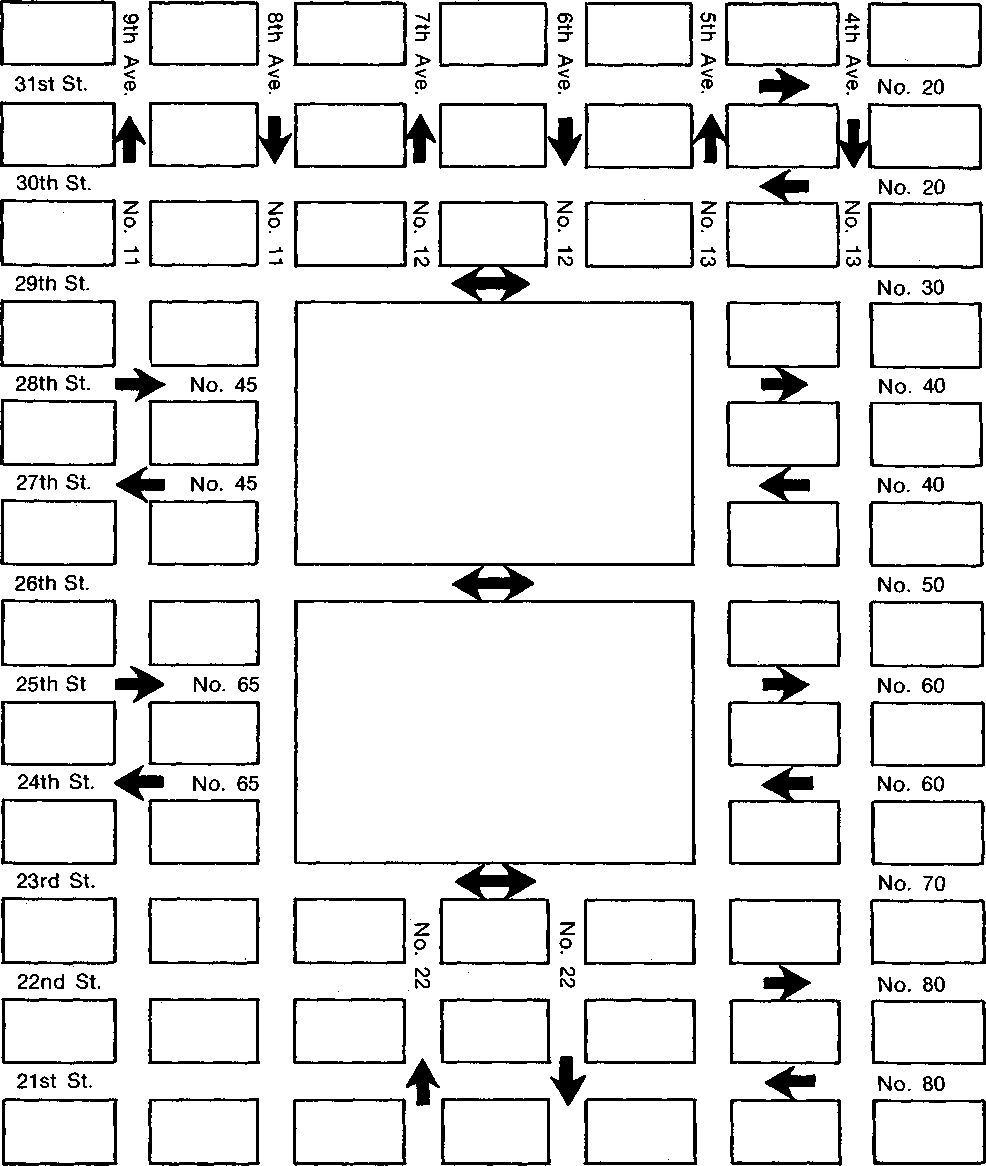
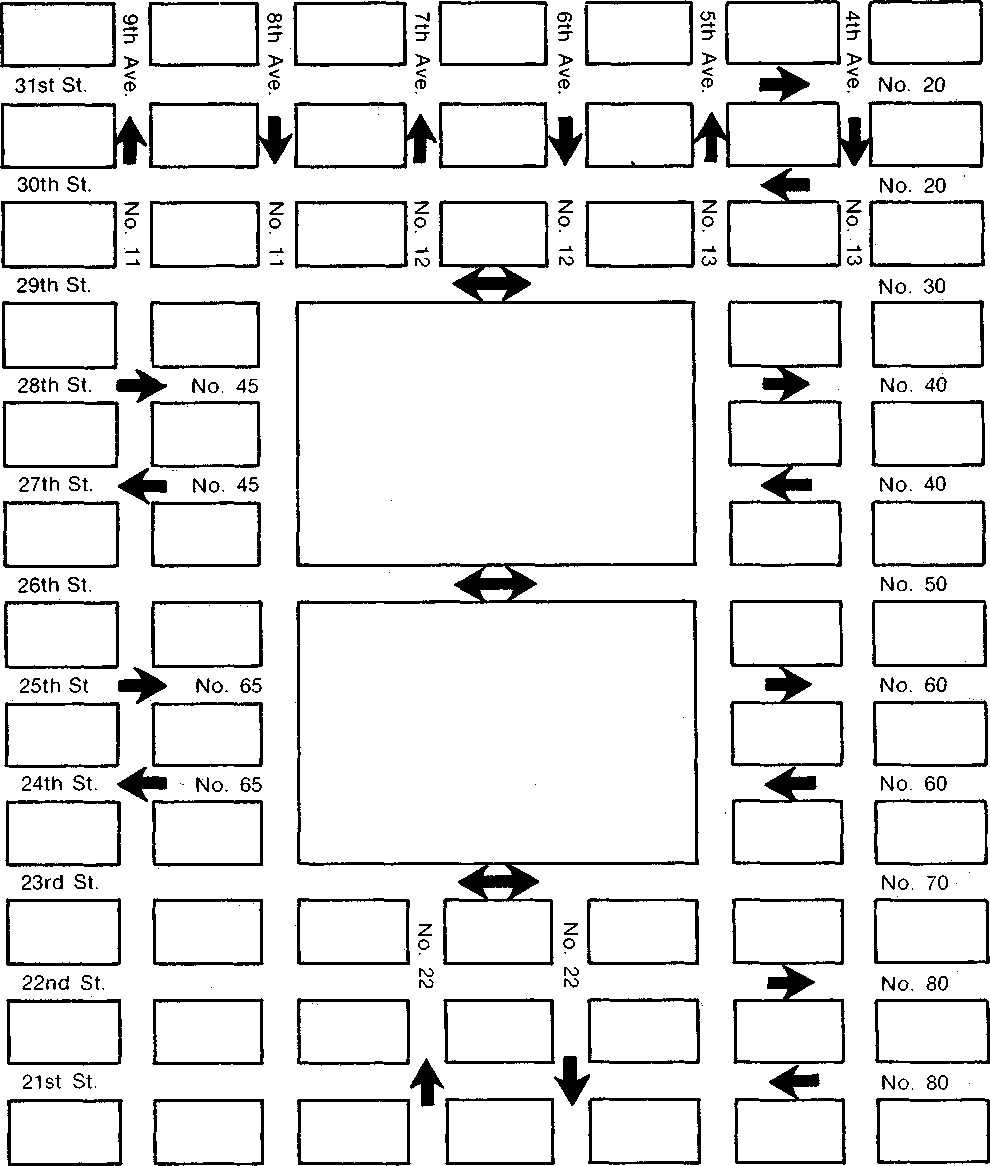
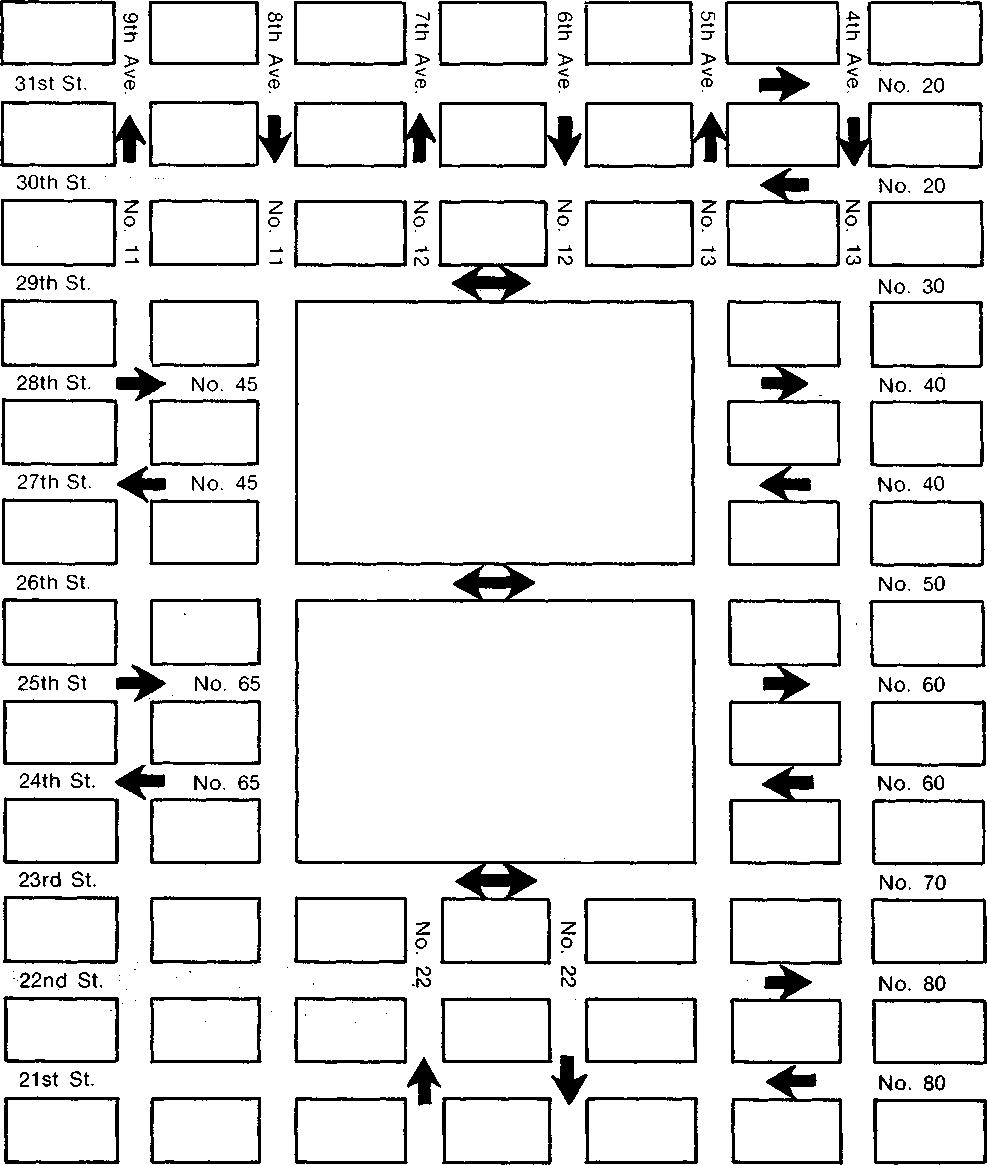
|
7th |
6th |
5th |
4th | ||||
|
> |
> |
> |
> | ||||
|
CD |
< Q |
< CD |
< CD |
No. 20 |
No. 20
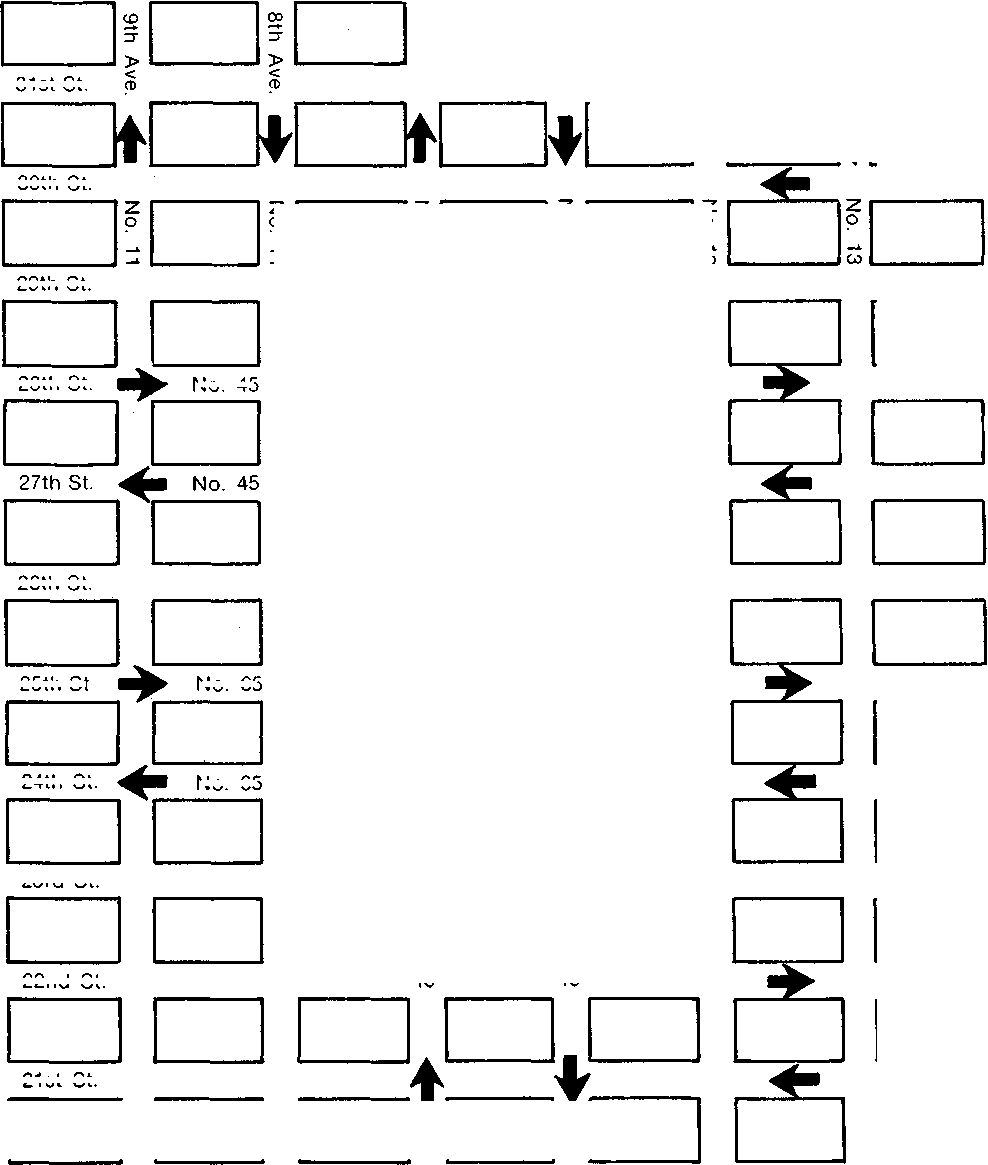
31st St.
30th St.
29th St.
28th St.
No. 45
26th St.
25th St
24th St.
No. 65
22nd St.
No. 40
No. 50
|
1 |
♦ |
23rd St.
No. 65
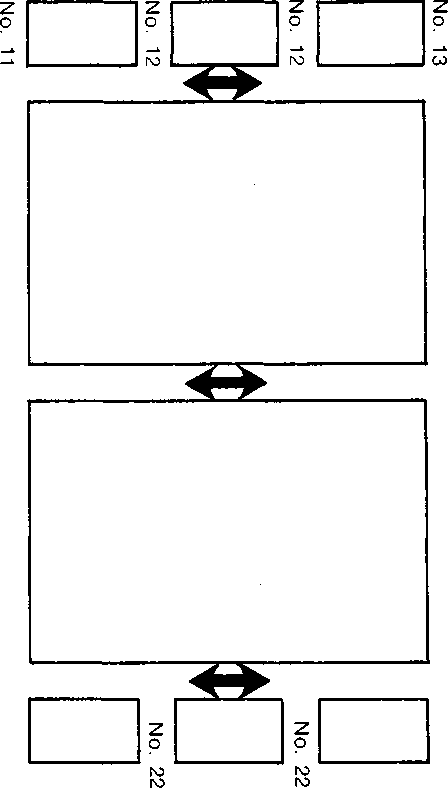
21st St.
No. 30
No. 40
No. 60

No. 60

No. 70

No. 80

No. 80

|
CO ZT |
00 r + ì> |
ì> |
2 E? > |
5 > |
> | |||||||
|
31st St. |
< < < (D P P |
CD |
< CD |
< CD |
No. 20 | |||||||
|
f |
í |
f |
if |
♦ | ||||||||
|
30th St. |
No. 20 | |||||||||||
|
No. 11 |
No. 11 |
No. 12 |
No. 12 |
No. 13 |
No. 13 | |||||||
|
29th St. |
No. 30 | |||||||||||
|
28th St. |
No. 45 |
No. 40 | ||||||||||
|
27th St. |
No. 45 |
No. 40 | ||||||||||
|
26th St. |
No. 50 | |||||||||||
|
25th St No. 65 |
No. 60 | |||||||||||
|
24th St. No. 65 |
No. 60 | |||||||||||
|
23rd St. | ||||||||||||
|
No. 70 | ||||||||||||
|
No. |
No. | |||||||||||
|
22nd St. ro |
N> N) |
No. 80 | ||||||||||
|
21st St. |
'V |
No. 80 | ||||||||||
In this exercise you will hear expressions useful for traveling by taxi.
The first of two short conversations starts as Mr. Mǎ is passing the house of his neighbor Mrs. Jiang in Taipei. She is coining out of her doorway with some suitcases. Mr. Mǎ goes into her yard to talk.
You will hear the conversations three times. Answer the questions below as you listen for the third time.
Here are four words you will need:
fēijī (airplane)
song (to see someone off, to escort someone
to a train station, airport, bus
depot, or pier)
náchuqu (to take Csomethingl out)
yào (to take Ca certain amount of time!)
QUESTIONS
1. How will Mrs. Jiang go to the railroad station?
( ) in Mr. Ma’s car ( ) by taxi
2. How many suitcases does Mrs. Jiang have?
( ) one ( ) two ( ) three
3. Where are the suitcases put?
( ) in the front ( ) in the back—the trunk
U. How does the taxi driver drive?
( ) slow ( ) just right ( ) fast
•This exercise will give you practice in describing how an action is done (manner).
Mr. Jiāng and Miss Zhao work in the same company in Taipei. Listen to their conversation two times. Then, as you listen again, translate the sentences orally during the pauses provided on tape. Compare your translations with the suggested translations given by the speaker.
These expressions are in the conversation:
|
Lǎo (name) |
(Old Enamel Efamiliar nickname for an older person, used among close friends!) |
|
qǐng |
(to invite) |
|
chi fan |
(to have a meal) |
|
nà |
(well, then) |
|
yìqǐ |
(together) |
|
mōtuōchē |
(motorcycle) |
This exercise will give you more practice with questions and answers used when traveling by taxi. In the first conversation, Miss Tang is talking to her colleague Mr. Lǐ, and in the second, to a taxi driver.
Listen to the conversations two times. Then, as you listen again, translate each sentence orally during the pause provided on tape. Compare your translation with the suggested translation given by the speaker.
Here are four expressions used in the conversations:
yìhuǐr (in a little while Epronounced yìhuěr])
Jiē (to meet Esomeonel)
yào duōshao shíjiān (how much time does it take E’’need”H)
jìnliàng (to exert all one’s effort, to do one’s
best to)
Lai or qù accompanying a purpose expression may be placed in front of the expression, after it, or in both places.
Wo qù mǎi dōngxi. (I’m going shopping.)
Wǒ mǎi dōngxi qu.
Wǒ qù mǎi dōngxi qu.
In this exercise you will have a chance to describe the way in which some activities are done.
Display I contains three charts. Each chart gives information about how Lǎo Sòng, Xiao Zhang, and Lǎo Ma do a certain activity. For instance, the first chart gives information on how they drive, showing how long it takes each person to drive to a particular destination. Using this data, you will decide whether they drive fast, slow, or neither fast nor slow, and answer questions about this. Use the other two charts to answer questions about studying and reading.
Example
TAPE: Lǎo Song kāi chē kāide kuài bu kuai?
YOU: Lǎo Sòng kāi chē kāide bú kuài yě bú man.
TAPE: Xiǎo Zhāng ne?
YOU: Xiǎo Zhāng kāi chē kāide tài kuài.
TAPE: Lǎo Mǎ ne?
YOU: Lǎo Mǎ kāi chē kāide tài màn.
NOTE: The names of the three people in this exercise are nicknames, formed by placing the work lǎo, "old," or xiǎo, "small/young," before surnames.
DISPLAY I
DRIVING
FROM WORK TO BÁI KXlLÍN’S FROM WORK TO THE RESTAURANT: PLACE:
|
Lǎo Song |
25 minutes |
7 minutes |
|
Xiao Zhāng |
8 minutes |
15 minutes |
|
Lǎo Mǎ |
U5 minutes |
35 minutes |
STUDYING
ENGLISH JAPANESE
|
Lǎo Sòng |
A |
D |
|
Xiǎo Zhāng |
F |
F |
|
Lǎo Mǎo |
D |
A |
READING
Lao Song
Xiao Zhang
Lao Mǎ
BOOKS NEWSPAPERS
|
5 hours |
15 minutes |
|
10 hours |
Uo minutes |
|
2 days |
2 hours |
Display II shows how often four people do certain activities, such as studying English and going to visit friends. Use this information to answer the questions on tape.
Example
TAPE: Gāo Bīngyīng měitiān niàn Yīngwén ma?
YOU: Bù, tā měige Xīngqīyī niàn Yīngwén.
TAPE: Tang Shàowén ne?
YOU: Tā měige Xīngqīsān niàn Yīngwén.
TAPE: Bai Huìrán ne?
YOU: Tā měitiān dōu niàn Yīngwén.
TAPE: Jiāng Shìyīng ne?
YOU: Tā měige Xīngqīwǔ niàn Yīngwén.
TAPE: Shéi niàn Yīngwén, niànde zuì duō?
YOU: Bai Huìrán niàn Yīngwén, niànde zuì duō.
DISPLAY II
|
STUDY ENGLISH |
READ ENGLISH NEWSPAPERS |
GO TO THE BANK |
GO TO THE MOVIES |
VISIT FRIENDS | |
|
Gāo Bīngyīng |
Mondays |
Saturdays |
Mondays |
daily |
Sundays |
|
Tang Shàowén |
Wednesdays |
daily |
Saturdays |
Fridays |
Saturdays |
|
Bai Huìrán |
daily |
Sundays |
Tuesdays |
Sundays |
daily |
|
Jiāng Shìyīng |
Fridays |
Fridays |
daily |
Saturdays |
Fridays |
In this exercise you will talk about your trips in Taiwan—the ones you have already taken and the ones you are planning to take. Display III shows where, how, when, and for how long you went or are going on these trips. Use this information to answer the questions on tape. Repeat the confirmations.
Example
TAPE: Nǐ xiàge xīngqī dào náli qù?
YOU: Wǒ dào Dànshuǐ Dàxué qù.
TAPE: Nǐ zěnme qù?
YOU: Wǒ zuò Gōnglùjú qù.
TAPE: Nǐ zài nàli zhù duo Jiǔ?
YOU: Zhù yìtiān. Jiùhào huílai.
Notice that when answering the last question you give not only the length of your stay but also the return date. It is common to leave off the name of the month when talking about a date in the current month.
For this exercise you will need the words huílai (to come back)
Gōnglùjú (Bureau of Highways CTaiwanl)
DISPLAY III
YOUR TRAVELS AROUND TAIWAN
MEANS OF LENGTH OF STAV
TIME DESTINATION TRANSPORTATION AND RETURN DATE
|
last month May 19 |
Tainan |
train |
5 days May 2b |
|
last week June 22 |
Jilong |
bus |
2 days June 2k |
|
this afternoon July 1 |
your older sister’s place |
taxi |
one night tomorrow |
|
next week July 8 |
Danshui University |
bus |
one day July 9 |
|
next month August 3 |
Gaoxiong |
train |
one week August 10 |
You will act as an interpreter in this conversation between Miss Smith and a fellow employee, who work for an international firm in Taipei.
First, you will hear the conversation in Chinese without interruptions. Then it will be presented as if Miss Smith cannot speak Chinese and the other employee cannot speak English. Each speaker’s lines will be followed by a pause on tape. You will translate during these pauses.
Example
CHINESE: Lǎo Wang shuō ni Jīntiān xiàwǔ yào qù huochēzhàn jiē rén. Nǐ qù jiē shéi?
YOU: Wang said that you are going to the railroad station to
meet someone this afternoon. Who are you going to meet?
SMITH: I am going to meet my younger sister. She is coming here
from Taizhong.
YOU: Wǒ qù jiē wǒ mèimei. Tā cóng Tǎizhōng lai.
Notice in the first sentence above that yào indicates a future action.
Yào may be translated here as "will,” "going to." (See Unit 6.)
For this exercise you will need the word jiē, "to meet."
INSTRUCTIONS:
Type: Get Me to the Train on Time
Situation: It is noon. A traveler is leaving his hotel in Taipei to go to the train station by taxi. He wants to arrive at the station exactly in time for his train. He does not want to arrive early or late. Instead of telling the taxi driver the train departure time, from time to time the traveler has the driver speed up, maintain speed, slow down, or stop for awhile.
Goal: To arrive at the station exactly on time (at the time given on the time card).
Number of Players: Pairs of students.
Materials: A work sheet for each pair of players. (See Sample Work Sheets, on the following pages.) Each square on the road between the hotel and the train station represents a distance of 1 kilometer. Each circle on the timer represents 5 minutes. (A more elaborate version of the work sheet is also provided.)
Two markers (.such as pennies) are also needed: one (the taxi) to move along the road and one to keep track of how much time has élapsed on the timer.
In addition, there are cards which tell the traveler at what time he should arrive at the station. (See Cards—Get Me to the Train on Time, on the following pages.) Three of the time cards are for use only with the simple version of the game, and three for use only with the elaborate version. The other four time cards are for both versions.
Procedure: The "traveler" takes a card from the shuffled deck of time cards.
The "driver" places his marker (representing the taxi) in the square in front of the hotel. He then moves the marker forward to represent the distance covered during the first 5 minutes. (Since each square represents 1 kilometer and each move represents 5 minutes, a move of one square represents a speed of 12 kilometers per hour. A move of six squares, which represents a speed of 72 kilometers per hour, should be the maximum for this city driving.)
For each move after this, the "traveler" advances his marker one circle on the timer and gives the "driver" instructions to adjust his speed so that they will arrive at the station on time (you will always be starting at noon). The "driver" responds to the instructions by advancing his marker as many squares as he thinks the "traveler" wants to cover in one move.
Example: You are Speaker 1, the "traveler.” You have drawn a time card: 12:30 (Follow your partner’s moves and your own on a work sheet.)
SI: Aì, jìchéngchē!
S2: Nǐ dào náli?
SI: Dao huochēzhàn.
S2: (moving to square U for his first 5-minute move—a reasonable speed of U8 kph) Wo kāi zhème kuài xíng bu xíng?
SI: (moving to the 5-minutes circle and computing that their average speed should be more like two squares per 5-minute move) Bù xíng. Ni kāide tài kuài le.
S2: Hao. Wǒ màn yidiǎn kāi. (moving to square 7 as a guess at how much slower they should go)
SI: (moving to the 10-minutes circle) Nī háishi (’’still") kāide tài kuài. Bié kāi zhème kuài.
S2: Hao. Wǒ màn yidiǎn kāi. (moving to square 9)
SI: (moving to the 15-minutes circle) Xiànzài hǎo le. Ní kāide bú kuài yě bú màn.
S2: Hǎo. Wǒ jiù zhème kāi. (moving to square 11)
SI: (moving to the 20-minutes circle and realizing that there are two 5-niinute moves left but only one square) Qǐng ni zài zhèli ting yíxià.
S2: Hǎo. Wǒ ting zai zhèli. (not moving)
SI: (moving to the 25-minutes circle) Hǎo le. Xiànzài zǒu ba!
S2: (moving to square 12) Dào le.
SI: (moving to the 30-minutes circle) Zhèng hǎo. ("Right on time.")
Practice Points: Manner adverbs and imperatives.
SAMPLE WORK SHEET: (Simple Version)
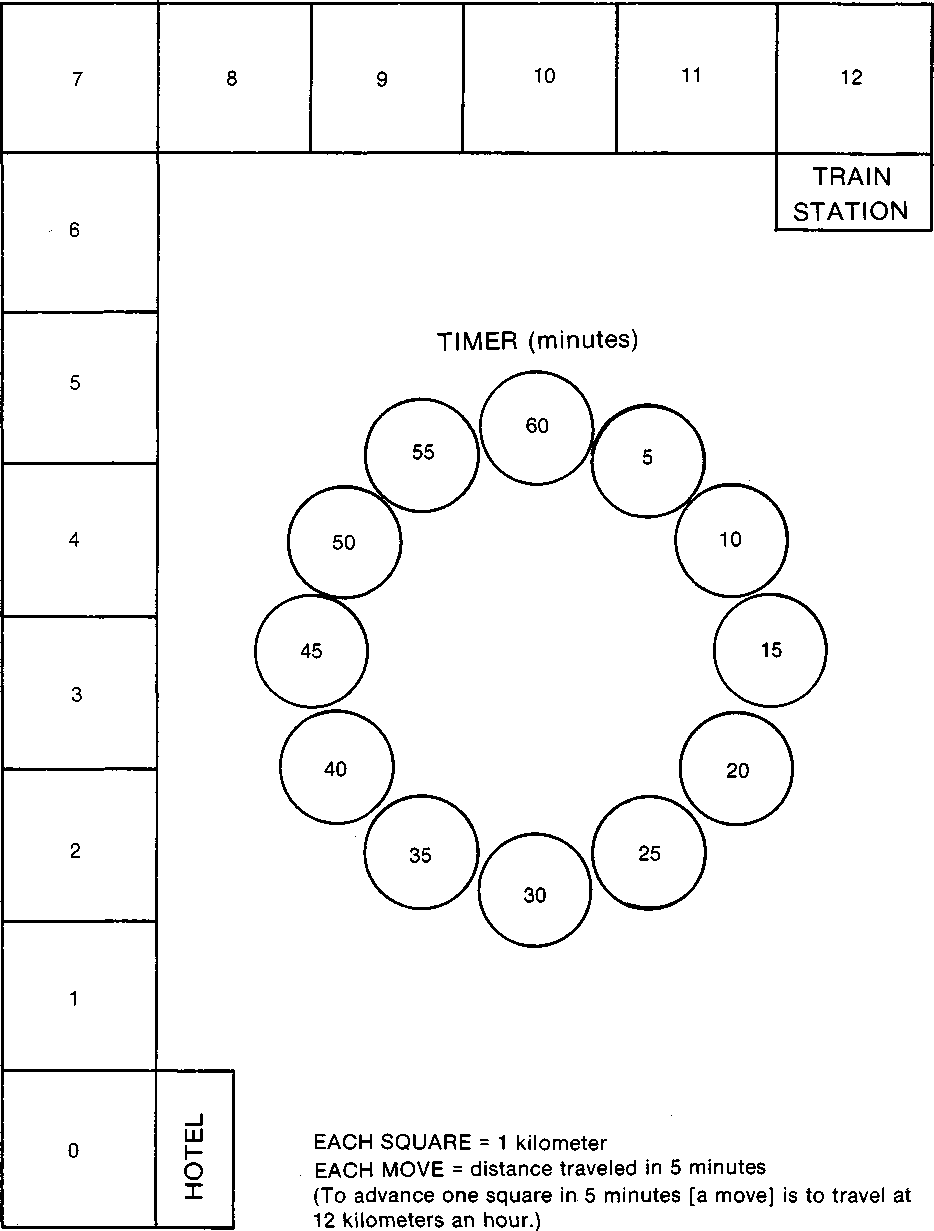
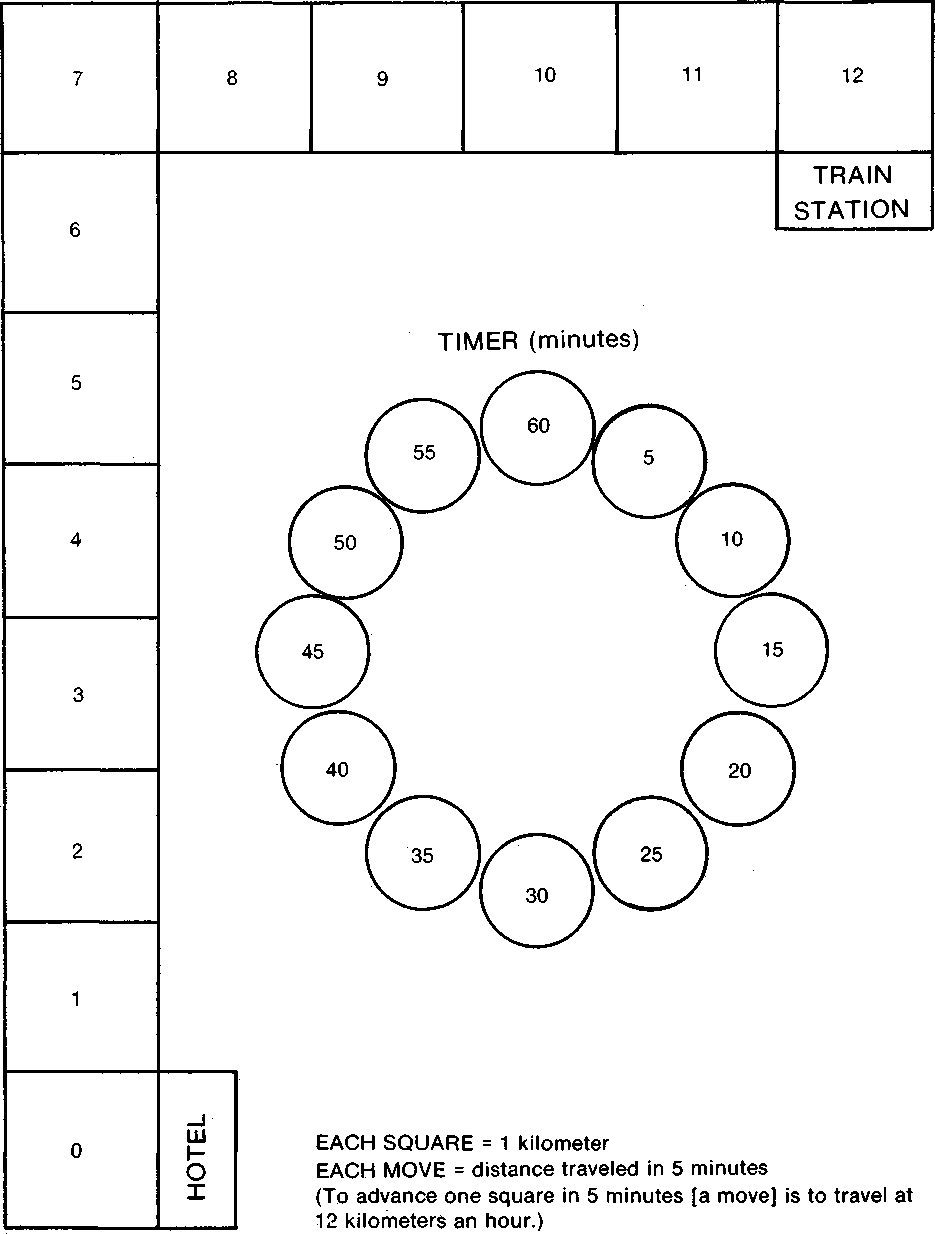
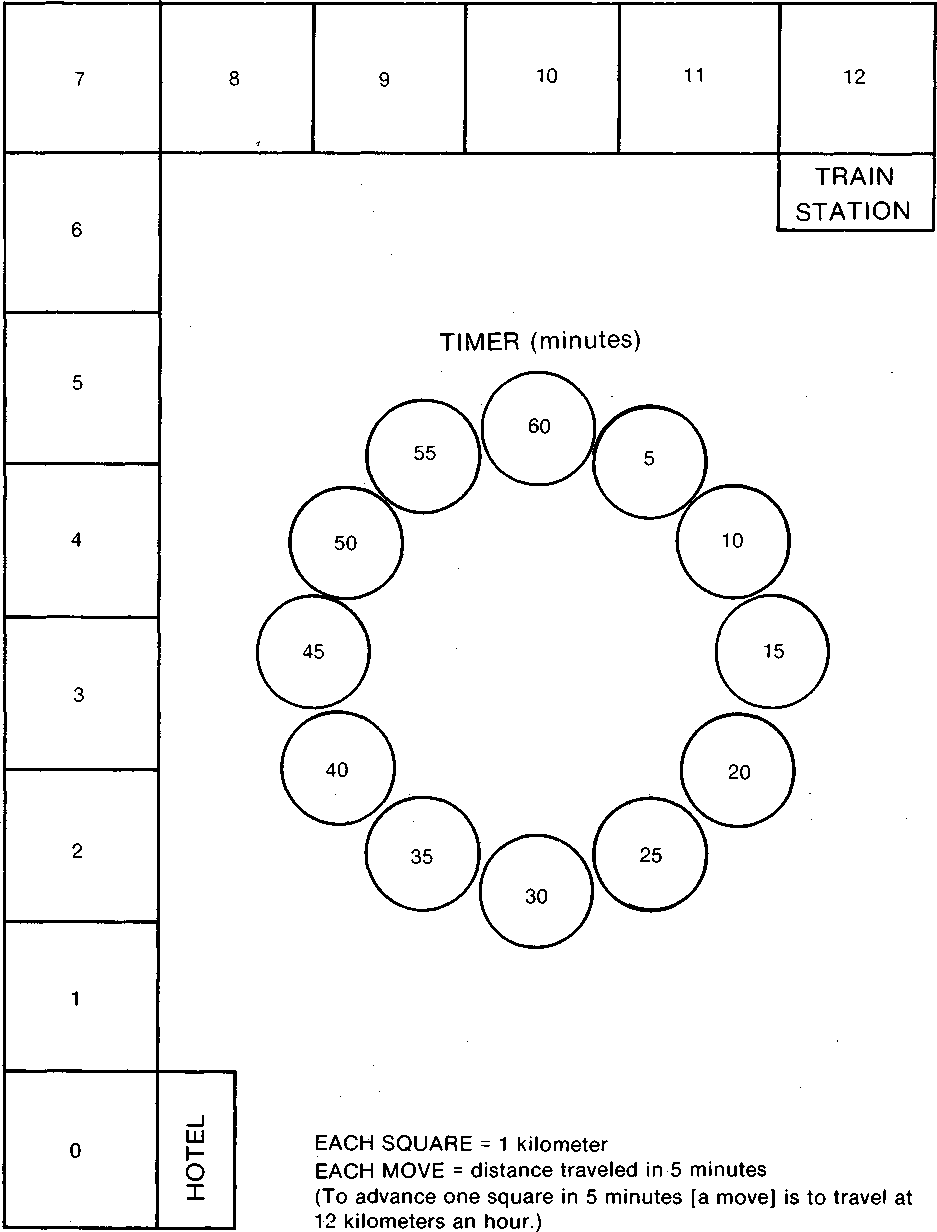
CARDS—Get Me to the Train on Time
|
12:15 |
12:20 |
12:25 | ||
|
(simple version only) |
(simple version only) |
(simple version only) |
|
12:30 |
12:35 |
12: HO |
12:U5 |
|
12:50 |
12:55 |
1:00 |
|
(elaborate |
(elaborate |
(elaborate |
|
version |
version |
version |
|
only) |
only) |
only) |
|
12:15 |
12:20 |
12:25 | ||
|
(simple |
(simple |
(simple | ||
|
version |
version |
version | ||
|
only) |
only) |
only) |
|
12:30 |
12:35 |
12: Ho |
12:U5 |
|
12:50 (elaborate version only) |
12:55 (elaborate version only) |
1:00 (elaborate version only) |
SAMPLE WORK SHEET: (Elaborate Version)
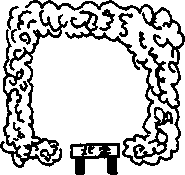
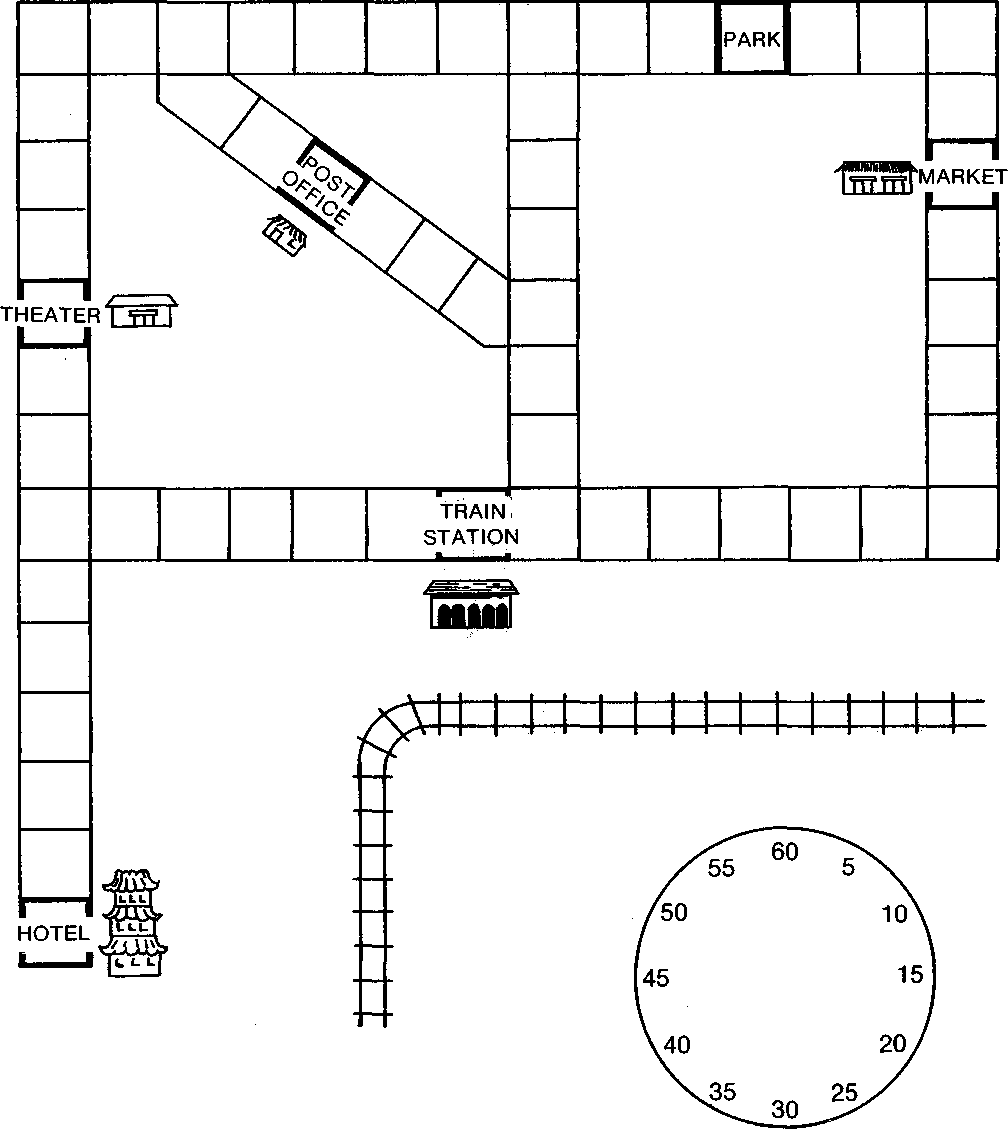
UT
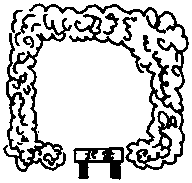
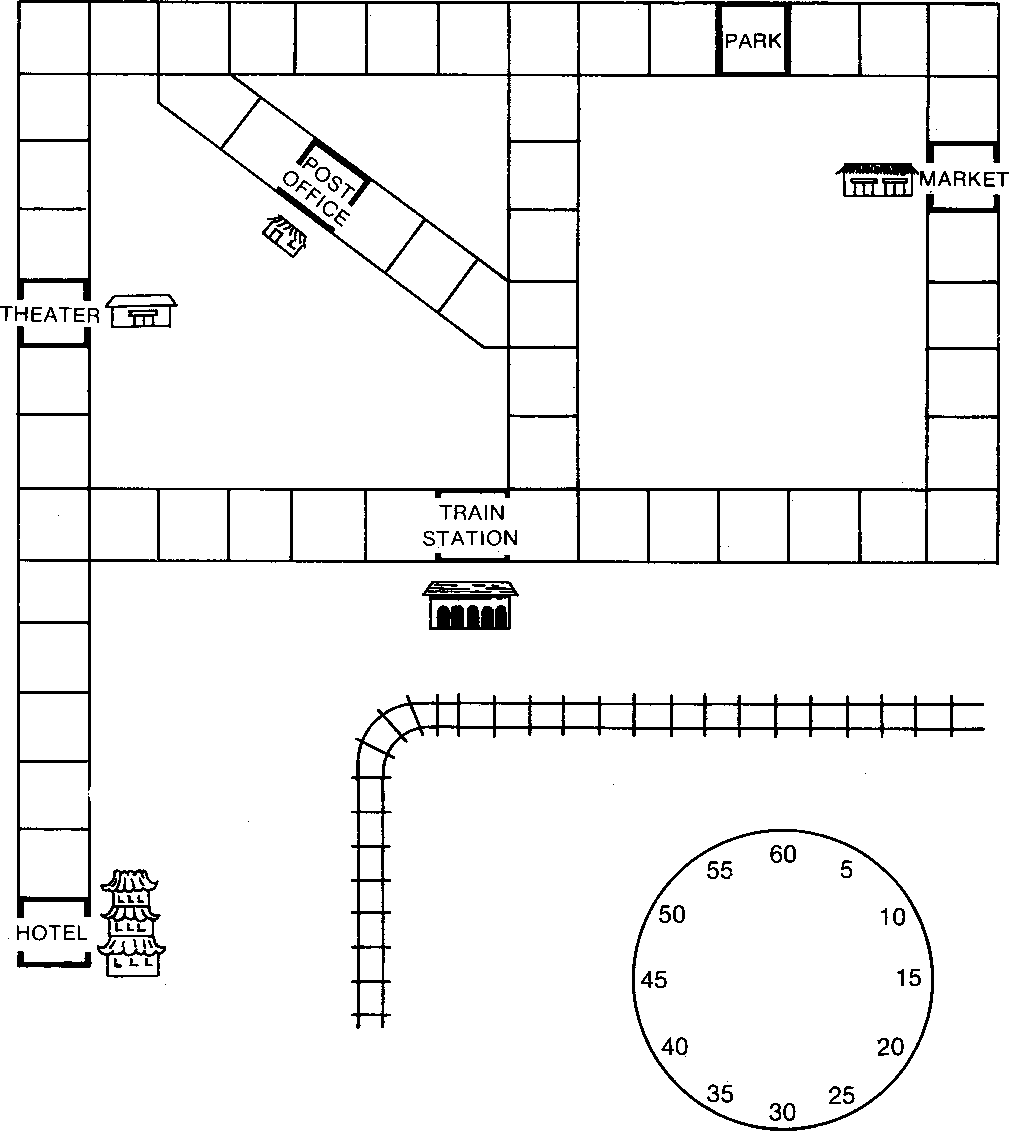
1+8
This exercise will give you practice in talking about different means of transportation. In this conversation Mr. Lī, a Chinese person residing outside China, is talking to Miss Hu, an acquaintance, in Taipei.
Listen to the conversation twice. Then answer the questions below as you listen for the third time.
These five expressions are in the conversation:
Tàilǔgé (Taroko Gorge Ca recreation spot in
Taiwan])
shān (hill, mountain)
shuǐ (rivers, lakes Cliterally, ’’water”])
huí (to return, to go back)
guò liǎngge yuè (after two months have passed)
The sentence You yíge xīngqī mei kànjian ni means ”l haven’t seen you for a week.”
You will notice in the sentence Wǒ qù kàn yige péngyou qu le, "I went to see a friend," that qù appears both before and after the purpose expression. Lai or qù may precede a purpose expression, follow it, or be in both places. When the sentence ends in le., the second lai or qù is required. (A final lai or qù is toneless.)
Wǒ qù kàn yige nùpéngyou.
Wǒ kàn yige nùpéngyou qu. (ī’m going to see a girl friend.)
Wǒ qù kàn yige nùpéngyou qu.
Wǒ kàn yige nupéngyou qu le.
Wǒ qù kàn yige nùpéngyou qu le. (I went to see a girl friend.)
QUESTIONS
1. Where does Miss Hu’s friend live?
2. How long did she and her friend stay there?
3. How did they get to Taroko Gorge?
4. Did they have to buy a ticket in advance? ( ) Yes ( ) No
5. How long did the two women stay at Taroko Gorge?
6. Where did Miss Hu go immediately after leaving Taroko Gorge?
This conversation takes place in Taipei between an American student and a Chinese student.
Listen to the conversation two times. Then, as you listen again, translate each sentence orally during the pause provided on tape. Compare your translation with the suggested translation given by the speaker.
Here are two expressions you will need for this exercise:
hǎowán (to be fun, to be interesting
Cliterally, "good for enjoying youself"])
hǎo J íle (wonderful, great)
This exercise consists of a conversation between a Chinese student and an American student who has Just arrived in Taichung.
Listen to the conversation two times. Then, as you listen again, translate each sentence orally during the pause provided on tape. Compare your translation with the suggested translation given by the speaker.
Here are seven expressions you will need for this exercise:
|
Rìyuètán |
(Sun-Moon Lake La recreation spot near Taichung]) |
|
zhōngtóu |
(hour) |
|
hǎowán |
(fun, interesting) |
|
hú |
(lake) |
|
huá chuán |
(to row a boat) |
|
yóuyǒng |
(to swim) |
|
san bù |
(to take a walk) |
This exercise will give you practice'in obtaining information needed, for travel in Taiwan. You need to know two things before making travel arrangements : what types of transportation are available and whether or not you need to buy tickets in advance.
Display I is a chart set up to help cue you for the questions you will need to ask and the answers you will need to give. Column 1 shows your destination for each trip. To fill in column 2, you will need to ask whether it is better to go by train or to go by bus. To fill in column 3, you will ask whether or not you need to buy tickets in advance.
Example
TAPE: Nǐ xiǎng dào náli qù?
YOU: Wǒ xiǎng dào Yěliǔ qù.
YOU: Nǐ shuō zuò huǒchē qu hǎo ne, háishi zuò Gōnglùjú qu hǎo ne?
TAPE: Méiyou huochē dào Yěliu qù.
YOU: Zuò Gōnglùjú děi xiān mǎi piào ma?
TAPE: Bú bì xiān mǎi piào.
Notice that, although you do not start the conversation, most of it is based on your questions.
DISPLAY I
DESTINATION BY BUS OR BY TRAIN? BUY TICKETS IN ADVANCE?
|
Yeliu | ||
|
Tainan | ||
|
Jilong | ||
|
Taizhong | ||
|
Taoyuan |
In this exercise you will buy train tickets at the advance-purchase window in the Taipei train station. You will have seven conversations with ticket sellers. On each occasion, you need to buy a ticket to a particular destination, keeping in mind that you must be there by a certain time.
Display II provides the information you need. Column 1 shows your destinations. Column 2 shows the days on which you want to leave. Column 3 gives the latest departure times which will allow you to arrive at your destinations on time.
In Taiwan, train travel is very popular. Therefore you may not always be able to take a train which is your first choice. In any case, always try to take the last train which will get you to your destination on time. Always confirm the time and date of the ticket that you finally buy.
Example
YOU: Wǒ yào mǎi yìzhāng hòutiān qù Táizhōngde piào.
TAPE: Nǐ yào zuò jǐdiǎn zhōngde che?
YOU: Wǒ yào zuò wǎnshang liùdiǎn bànde chē.
TAPE: Nàbān chēde piào dōu màiwān le. Xiàwǔ sāndiǎn zhōngde xíng bu xíng?
YOU: Xíng. Wǒ mǎi xiàwǔ sāndiǎn zhōngde.
DISPLAY II
PREFERRED LATEST POSSIBLE
DESTINATION DEPARTURE DATE DEPARTURE TIME
|
Taizhong |
day after tomorrow |
6:30 p.m. |
|
Xinzhu |
tomorrow |
noon |
|
Tainan |
Friday |
no deadline |
|
Zhanghua |
Monday |
Tuesday evening |
|
Gaoxiong |
day after tomorrow |
morning |
|
Jiayi |
Tuesday |
afternoon |
|
Jilong |
tomorrow |
morning |
You will act as an interpreter in this conversation between a British student who has Just arrived at Beijing University and a fellow student.
First, you will hear the conversation without interruptions. Then it will be presented as if the British student cannot speak Chinese and the other student cannot speak English. Each speaker’s lines will be followed by a pause, during which you will translate.
Example
BRITISH
STUDENT: The weather today is really beautiful. I would like to go out and enjoy myself.
YOU: Jǐntiān tiānqi zhēn hǎo. Wǒ xiǎng chūqu wanrwanr.
CHINESE
STUDENT: Nǐ xiǎng qù nǎr a?
YOU: Where do you want to go?
For this exercise you will need the words tiānqi (weather)
dòngwuyuan (zoo)
wánr (to play, to relax, to enjoy oneself)
chūzū qìchē (taxi CBěijīngl)
INSTRUCTIONS:
Type: Voting
Situation: The setting is Taipei. You and seven others are trying to settle by vote the details of a proposed weekend trip.
Goal: To determine majority opinion on each issue, or the fact that opinion is split evenly (X, Y dōu kěyi), by asking the opinions of other players and filling in your work sheet.
Number of Players: Groups of eight students or fewer.
Materials: A work sheet for each player. (.See Sample Work Sheets, on the following pages.) On these sheets are listed the issues to be decided and the choices for each issue. Your opinions are indicated by Xs on your work sheet. There are sheets for Player 1 through Player 8.
If a group has fewer than eight players, some or all players should take two or more work sheets and report the votes of spouses or friends as well as their own.
Procedure: Mingle with the other players to exchange information. Make all inquiries in the form of choice questions. Use a variety of choicequestion patterns.
Example: You are Speaker 2. In this example you are giving information rather than asking questions.
SI: Nǐ yào dào Xínzhú qù háishi yào dào Jilóng qù?
S2: Wǒ yào dào Jīlóng qù.
SI: Nǐ yào jīntiān qù ne háishi míngtiān qù?
S2: Wǒ yào míngtiān qù.
SI: Nǐ yào qù yìtiān háishi liǎngtiān?
S2: Yìtiān.
SI: Nǐ shuō dào Jilong qù zuò Gōnglùjú hǎo ne, háishi zuò huǒchē qu hǎo ne?
S2: Zuò huǒchē zuì fāngbian.
SI: Nǐ yào zhù guide háishi piányide fàndiàn?
S2: Wǒ yào zhù piányide.
Practice Points: Choice-question constructions, especially the construction introduced in this unit: Nǐ shuō shi...hao (ne), (hái) shi...hǎo (ne)?
SAMPLE WORK SHEET: /
PLAYERS MAJORITY
12 3 U 5 6 7 8
|
DESTINATION Xínzhu Jílong | |||||||||
|
X | |||||||||
|
DEPARTURE today tomorrow | |||||||||
|
X | |||||||||
|
LENGTH OF STAY one day two days |
X | ||||||||
|
TRANSPORTATION bus train |
X | ||||||||
|
HOTEL cheap expensive |
X | ||||||||
PLAYERS
MAJORITY
123H5678
|
DESTINATION Xinzhu Jilong |
X | ||||||||
|
DEPARTURE today tomorrow | |||||||||
|
X | |||||||||
|
LENGTH OF STAY one day two days |
X | ||||||||
|
TRANSPORTATION bus train | |||||||||
|
X | |||||||||
|
HOTEL cheap expensive | |||||||||
|
X |
PLAYERS
MAJORITY
123^5678
|
DESTINATION Xinzhu Jilong |
X | ||||||||
|
DEPARTURE today tomorrow |
X | ||||||||
|
LENGTH OF STAY one day two days | |||||||||
|
X | |||||||||
|
TRANSPORTATION bus train | |||||||||
|
X | |||||||||
|
HOTEL cheap expensive |
X | ||||||||
PLAYERS
MAJORITY
123 U 5 6 7 8
|
DESTINATION Xinzhu Jilong | |||||||||
|
X | |||||||||
|
DEPARTURE today tomorrow |
X | ||||||||
|
LENGTH OF STAY one day two days | |||||||||
|
X | |||||||||
|
TRANSPORTATION bus train | |||||||||
|
X | |||||||||
|
HOTEL cheap expensive |
X | ||||||||
PLAYERS
MAJORITY
123U5678
|
DESTINATION Xinzhu Jilong |
X | ||||||||
|
DEPARTURE today tomorrow | |||||||||
|
X | |||||||||
|
LENGTH OF STAY one day two.days | |||||||||
|
X | |||||||||
|
TRANSPORTATION bus train | |||||||||
|
X | |||||||||
|
HOTEL cheap expensive | |||||||||
|
X |
PLAYERS
MAJORITY
12 3H 5678
|
DESTINATION Xinzhu Jilong |
X | ||||||||
|
DEPARTURE today tomorrow | |||||||||
|
X | |||||||||
|
LENGTH OF STAY one day two days | |||||||||
|
X | |||||||||
|
TRANSPORTATION bus train | |||||||||
|
X | |||||||||
|
HOTEL cheap expensive | |||||||||
|
X |
PLAYERS
MAJORITY
1 2 3 U 5 67 8
|
DESTINATION Xinzhu Jilong |
X | ||||||||
|
DEPARTURE today tomorrow | |||||||||
|
X | |||||||||
|
LENGTH OF STAY one day two days | |||||||||
|
X | |||||||||
|
TRANSPORTATION bus train |
X | ||||||||
|
HOTEL cheap expensive | |||||||||
|
X |
PLAYERS
MAJORITY
123456 78
|
DESTINATION Xinzhu Jilong |
X | ||||||||
|
DEPARTURE today tomorrow |
X | ||||||||
|
LENGTH OF STAY one day two days | |||||||||
|
X | |||||||||
|
TRANSPORTATION bus train | |||||||||
|
X | |||||||||
|
HOTEL cheap expensive |
X | ||||||||
PLAYERS
MAJORITY
1 2 3 4 5 6 T 8
|
DESTINATION Xinzhu Jilong | |||||||||
|
X | |||||||||
|
DEPARTURE today tomorrow | |||||||||
|
X | |||||||||
|
LENGTH OF STAY one day two days |
X | ||||||||
|
TRANSPORTATION bus train |
X | ||||||||
|
HOTEL cheap expensive | |||||||||
|
X |
You. will hear distances and travel times in this conversation between two Chinese cadres in Beijing. You will hear the conversation three times. Answer the questions below as you listen to it for the third time.
|
Here are seven expressions you will need for this exercise: | |
|
you hǎo you piànyi |
(both good and inexpensive) |
|
biéde dìfang |
(other places Ccf. biérén, ’’other |
|
people"]) | |
|
Juédìng |
(to decide) |
|
Sūzhōu |
Ca city near Shànghǎi, well known to |
|
tourists and for its light industry, | |
|
formerly spelled Soochowl | |
|
yìshuāng pixie |
(a pair of leather shoes) |
|
duōshao hào |
(what size tshoel) |
|
hēi |
(to be black) |
In the sentence Wo dào huōchēzhàn qù. mai piào qu le, the purpose marker qù both follows and precedes the verb.
QUESTIONS
1. Where did the woman go this morning?
2. Why is she going to Shanghai? ________________________________________
3. How long does the woman plan to stay in Shanghai?
Shanghai is how many kilometers from Beijing?
5. How many hours does it take by train?
6. When will the woman decide whether or not she will go to Sūzhōu?
( ) before she goes to Shànghǎi
( ) after she arrives in Shànghǎi
This exercise will give you more practice with questions and answers used to arrange a train trip. The conversation takes place in Beijing between a Japanese businessman and his Chinese guide.
You will hear the conversation three times. As you listen to it fop the third time, answer the questions below.
Here are four words you will hear in the conversation:
Shenyang
gōnchǎng eānguān hǎoj íle
Ea major industrial city in northeast China2
(factory)
(to visit as an observer)
(great, extremely good)
QUESTIONS
1. When is the Japanese businessman going to Shenyang?
2. Has he been there before? ( ) Yes ( ) No
3. How long does the guide suggest that the businessman stay there?
b-. How many trains go to Shenyang each day?
5. At what time of day does he want to leave?
6. What time does the express leave?
In this conversation, a visiting Canadian is in Shanghai.
Listen to the conversation twice. As you listen to it for the third time, translate into English during each pause on tape. Compare your version with the suggested translation given by the speaker.
Here are two words you will need for this exercise:
Hangzhou
Ea city in Zhejiang Province, famous for its scenery; formerly spelled Hangchow!
(if)
yàoshi
In this exercise you will take part in six short conversations, discussing your tentative plans for an upcoming trip.
Display I shows where and when you are planning to go, whether you have been there before, and how long you are planning to stay. Use this information to answer the questions on tape. Here is an example:
YOU: Wǒ xiǎng dào Xiān qù kànkan.
TAPE: Nǐ jìhua něitiān qù?
YOU: Wǒ xiǎng Xīngqīwǔ huòshi Xīngqīliù qù.
TAPE: Nǐ yǐqiǎn qùguo Xīān meiyou?
YOU: Wǒ yǐqiǎn mei qùguo.
TAPE: Nǐ jìhua zài nàr zhù jītiān?
YOU: Wǒ xiǎng, zhù sāntiān jiù gǒu le.
DISPLAY I
DESTINATION DATE OF TRIP PREVIOUSLY VISITED LENGTH OF STAY
|
Xīān |
Friday or Saturday |
no |
3 days |
|
Shànghǎi |
next Saturday |
yes—twice |
5 days |
|
Nanjing |
Tuesday or Wednesday |
yes—once |
2 days |
|
Sūzhōu |
next Sunday |
no |
3 days |
|
Hangzhou |
Friday or Saturday |
no |
3 days |
|
Guǎngzhōu |
next Wednesday or Thursday |
yes—once |
U days |
In this exercise you will ask for information about trips.
Display II is a map of China with routes marked between certain cities. You will ask three questions about each route: what the distance is, how long the trip takes by train, and how long the trip takes by plane. Ask about the routes in the order that they are numbered. Record the answers you are given; then check to see if you understood by comparing your answers to the information given in Display III.
Here is an example from the tape:
YOU: Beijing lí Shanghai you duo yuan?
TAPE: You yìqiānsìbǎiqīshiduō gōnglǐ.
YOU: Zuò huochē yào duōshao shíhou?
TAPE: Yào zou èrshisānge xiǎoshí.
YOU: Zuò fēijī yào duōshao shíhou?
TAPE: Yào fēi sānge xiǎoshí.
For this exercise you will need the words
fēijī fēi
(airplane) (to fly)
In this exercise you will be asked to give the information which you collected in Exercise 2. Use Display III to answer the questions on tape.
Example
TAPE: Beijing lí Shànghǎi you duo yuan?
YOU: You yìqiānsìbǎiqīshiduō gōnglǐ.
TAPE: Zuò huǒchē yào duōshao shíhou?
YOU: Yào zǒu èrshisānge xiǎoshí.
TAPE: Zuò fēijī yào duōshao shíhou?
YOU: Yào fēi sānge xiǎoshí.
Notice that some distances and times in the display are rounded off, using ’’plus," as in "1,470+ kilometers." This calls for an answer containing the ’adjectival verb -duō, as shown in the example.
For this exercise you will need the words fēijī (airplane)
fēi
(to fly)
This exercise is a conversation between a Canadian who lives in Běijīng and her Chinese acquaintance. You will act as an interpreter.
First, you will hear the conversation in Chinese without interruptions. Then it will be presented as if the Canadian cannot speak Chinese and her acquaintance cannot speak English. Each sentence will be followed by a pause, during which you will translate.
Example
CANADIAN: Last year when I went to Shànghǎi for the first time, I didn’t have time to go out and enjoy myself.
YOU: Qùniàn wǒ dìyícì qù Shànghǎide shíhou wǒ méiyou shíjiān
chūqu wǎnr.
CANADIAN: Now I would like to go again.
YOU: Xiànzài wǒ xiǎng zài qù yícì.
CHINESE: Nī jìhua shénme shíhou qù?
YOU: When do you plan to go?
For this exercise you will need
fēijī (airplane)
zài qù yícì (go again Eliterally, "go one more
time"!)
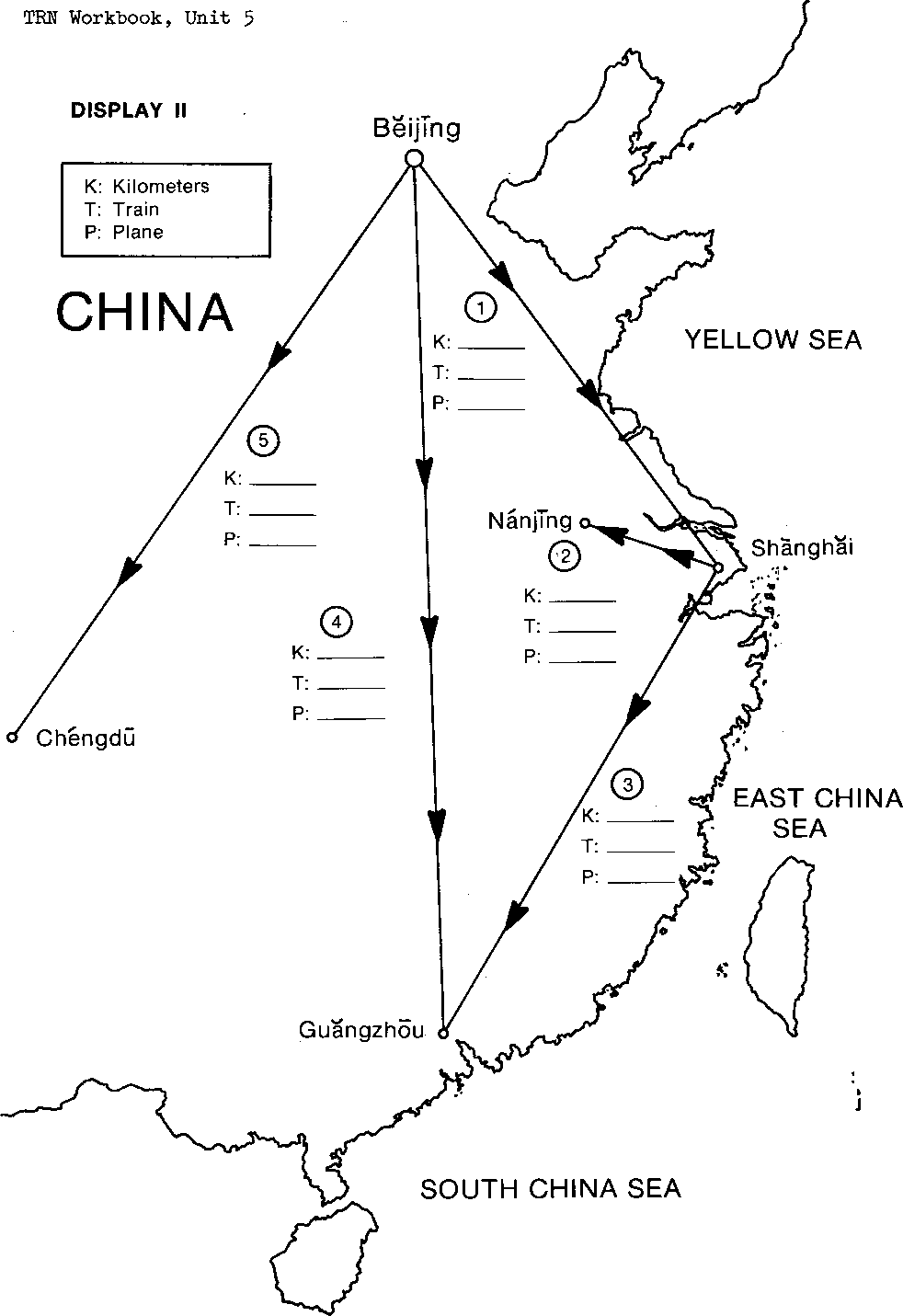
DISPLAY III
Beijing
K: Kilometers
T: Train P: Plane
CHINA
K: 1,920
T; 30+ hrs
P: 5 hrs
K:
Chéngdū
P:
2,160
43 hrs
3+ hrs...
Guangzhou
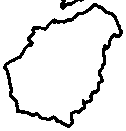
<9
K: 1.470+
T; 23 hrs
P: 3 hrs
Nanjing
(2
K: 250+
T; 41/2 hrs
P: 1 hr
YELLOW SEA
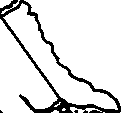
/
K: 1,70°
T; 34 hrs
P: 2¥2 hrs

Shanghai
EAST CHINA SEA
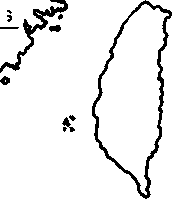
SOUTH CHINA SEA
INSTRUCTIONS:
Type: Handicap Race
Situation: Four people are leaving one city in Taiwan to go home to four other cities in Taiwan. Each person is trying to arrange the quickest trip home, by train or by bus.
A friend of theirs is trying to find out (from a travel agent) when each person will reach home and which person will arrive first. The friend also wants to find out the distance each person will travel. He has a map of Taiwan train and bus routes and the following information about the four travelers: names, common starting point, destinations, and preferred departure times (for either train or bus).
The travel agent’s map includes distances (in kilometers) between adjacent cities and necessary traveling times by train and by bus for the distances. He will read off distances or travel times from his map, but he will not calculate total distances or total travel times.
(NOTE FOR THE "FRIEND": To simplify the game, waiting time at stopovers and time needed to go from train stations to bus stations, or vice versa, is not to be included in the total traveling time.)
Goal: To figure out the fastest route for each traveler, the final arrival time for each traveler, and the traveler who will reach home first. Also, to work out the distance each person will travel.
Number of Players: Pairs of students.
Materials: A work sheet for each "friend" and a fact sheet for each "travel agent." (See Sample Work Sheets and Sample Fact Sheets, on the following pages.)
Procedure: The "friend" should try out various routes for each person— by train, by bus, or by any combination of the two—until the fastest route is found. Then the "friend" records the final arrival time and the distance covered by that route.
He will find it helpful to take notes on his work sheet, writing down the distance from one city to the next on one side of a route and writing down the faster travel time on the other side of the route.
The "travel agent" should be careful to give only distances and times listed on his fact sheet. If he is asked a question requiring the addition of distances or times, he may play dumb by saying Wǒ bù zhīdào or, at most, may volunteer only information listed on his fact sheet.
Example: You. are Speaker 1, the ’’friend.” This example covers only initial questions about one possible route (in this case, the only logical one) for one of the people.
SI: (Wǒ you yíge péngyou xìng Lǐ. Tā xiǎng dào Taizhōng qù. Tā jìhua Jīntiān sìdiǎn zhōng qù.) Lǐ Xiānsheng xiān děi dào Xīnzhú. Qǐngwèn Tāibei lí Xīnzhú you duo yuan?
S2: You liùshí gōnglǐ.
SI: Zuò huǒchē yào zǒu duōshao shíhou?
S2: Dàgài yào zǒu yíge zhōngtóu.
SI: Zuò Gōnglùjú màn yìdiǎn ba?
S2: Duì le, yào zǒu liǎngge duō zhōngtóu.
(etc.)
Additional Note: There may not be enough time for the ’’friend” to check out all possible routes and be sure that he has found the fastest route for each traveler. In that case, all the students in the class can discuss their findings in a concluding class discussion.
Practice Points: Distances and traveling times.
SAMPLE WORK SHEET : (Friend.)
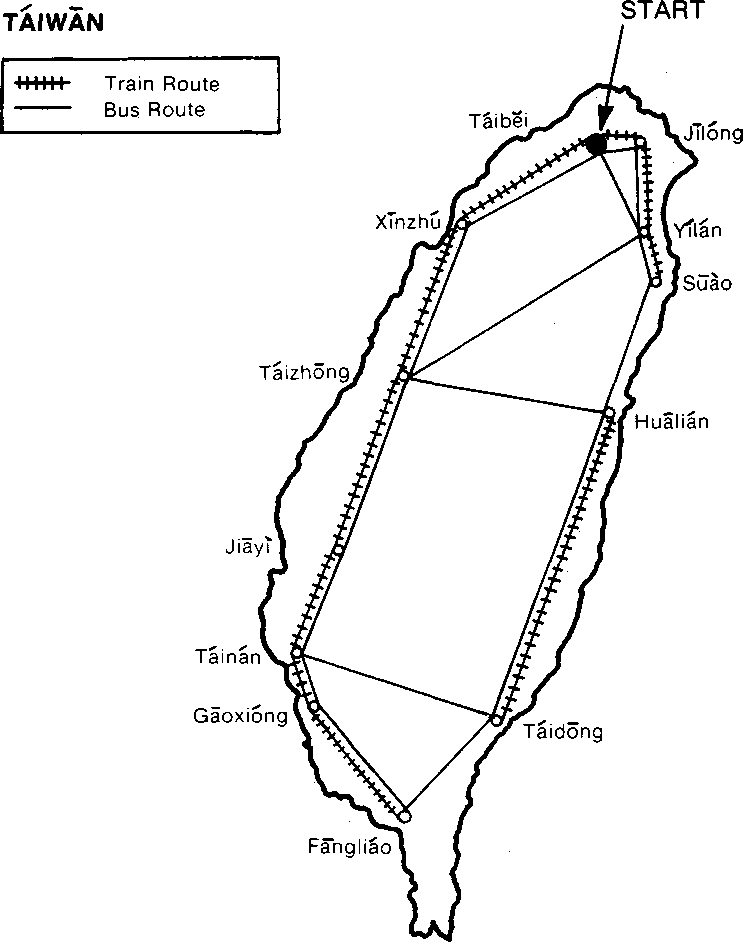
|
NAME DESTINATION DEPARTURE ARRIVAL |
Wang Huālián 3 p.m. |
Lǐ Táizhōng U p.m. |
Zhāng Tainan 2 p.m. |
Zhao Táidōng 1 p.m. |
|
DISTANCE |
SAMPLE FACT SHEET: (Travel Agent)
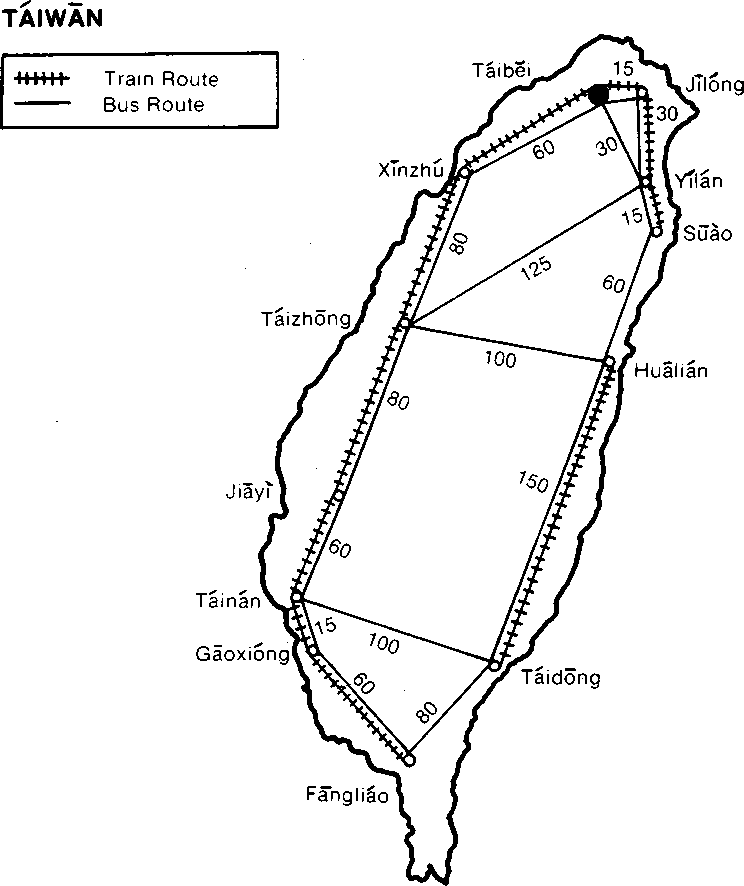
DISTANCE (km) TRAVELING TIME (hrs:mins)
|
bus |
train | |
|
15 |
:30 |
:30 |
|
30 |
1:00 |
:45 |
|
60 |
2:15 |
1:00 |
|
80 |
3:00 |
1:20 |
|
100 |
3:45 |
— |
|
125 |
4:30 |
— |
|
150 |
5:15 |
2:30 |
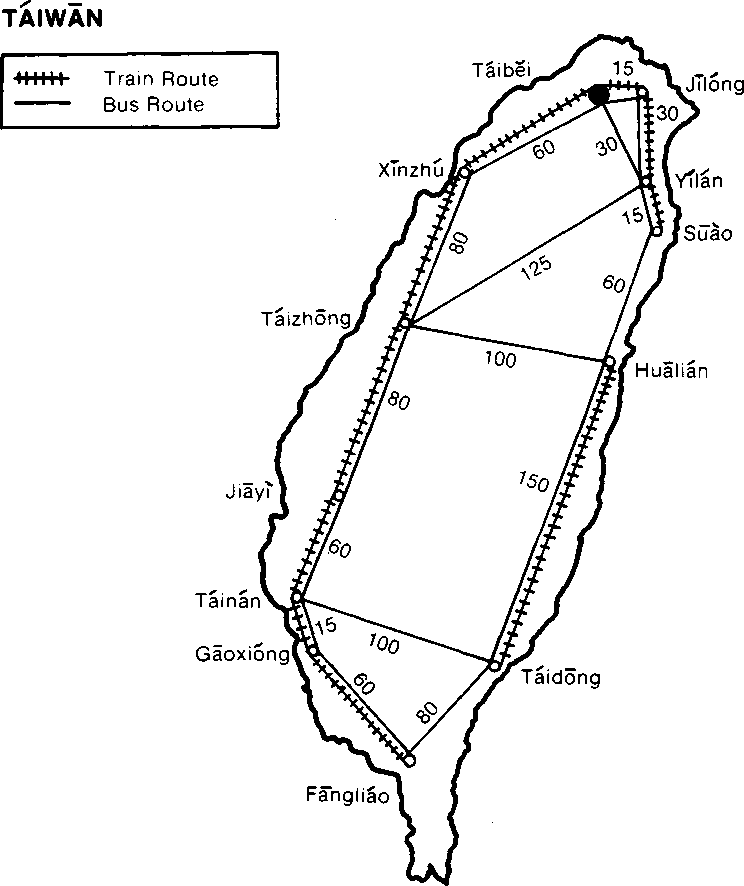
|
DISTANCE (km) |
TRAVELING TIME (hrs:mins) | |
|
bus |
train | |
|
15 |
:30 |
:30 |
|
30 |
1:00 |
:U5 |
|
60 |
2:15 |
1:00 |
|
80 |
3:00 |
1:20 |
|
100 |
3:U5 |
— |
|
125 |
U:30 |
— |
|
150 |
5:15 |
2:30 |
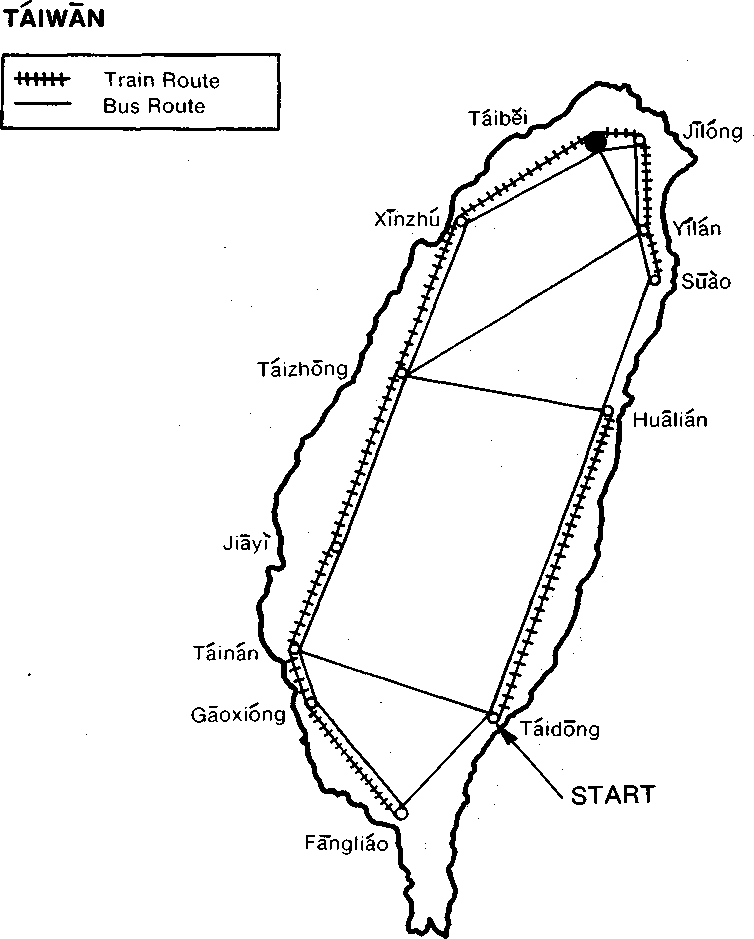
|
NAME |
Wú |
Zhōu |
Huang |
Xú |
|
DESTINATION |
Gāoxióng |
Xinzhu |
Jīlóng |
Jiāyì |
|
DEPARTURE |
11 a.m. |
8 a.m. |
10 a.m. |
11 a.m |
ARRIVAL
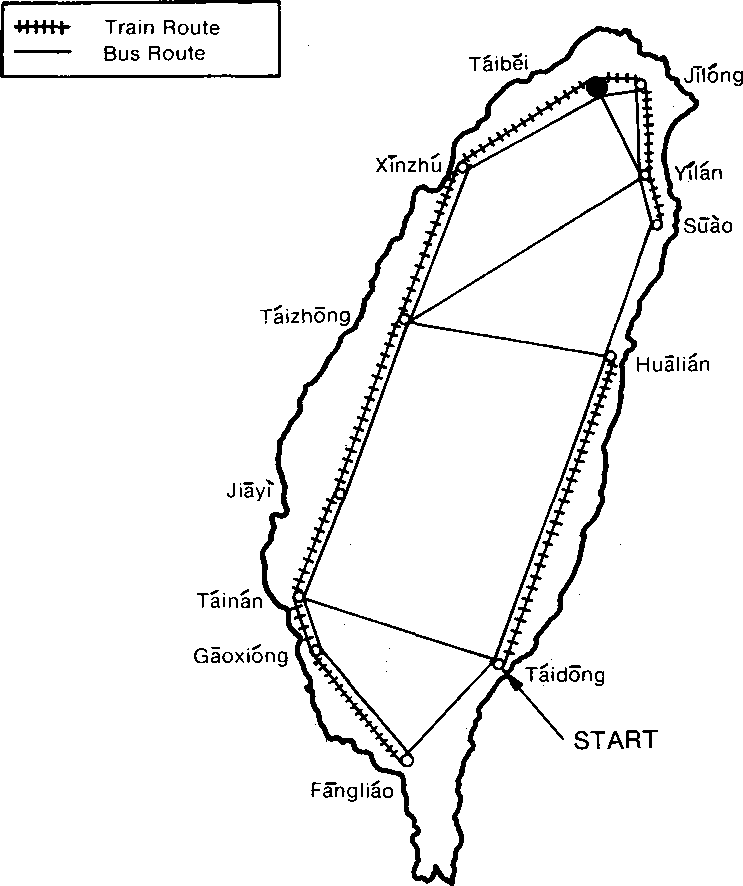
|
NAME |
Wú |
Zhōu |
Huang |
Xú |
|
DESTINATION |
Gāoxióng |
Xīnzhú |
Jilong |
Jiāyì |
|
DEPARTURE |
11 a.m. |
8 a.m. |
10 a.m. |
11 a.m. |
|
ARRIVAL | ||||
|
DISTANCE |
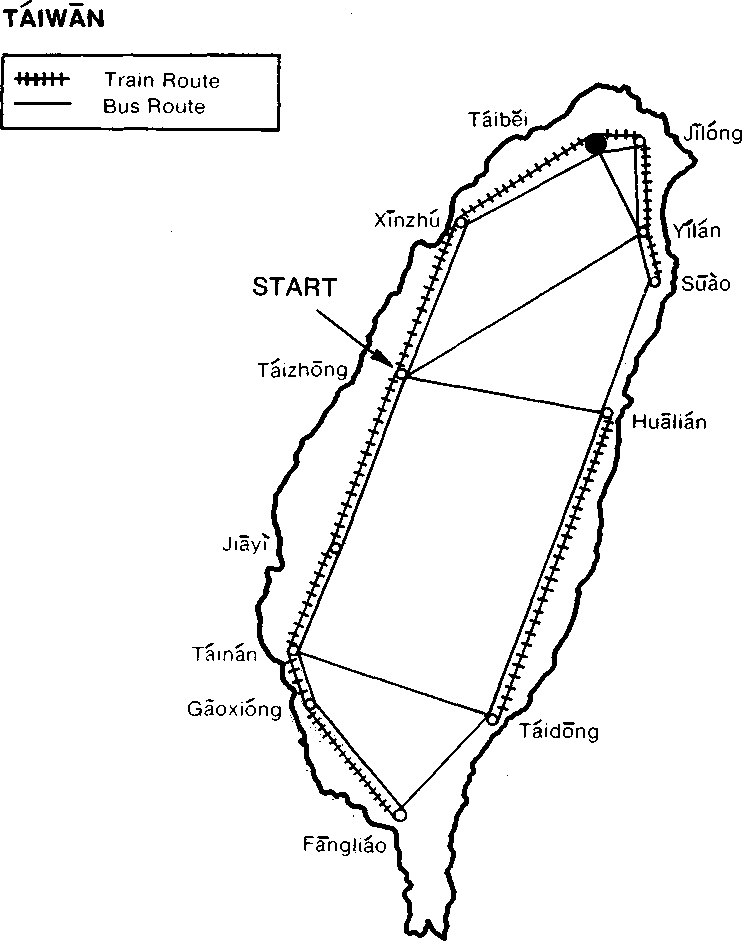
|
NAME |
Liu. |
Chen |
Gāo |
Yang |
|
DESTINATION |
Yílán |
Sūào |
Táidōng |
Gāoxióng |
|
DEPARTURE |
6 p.m. |
6 p.m. |
3 p.m. |
6 p.m. |
ARRIVAL
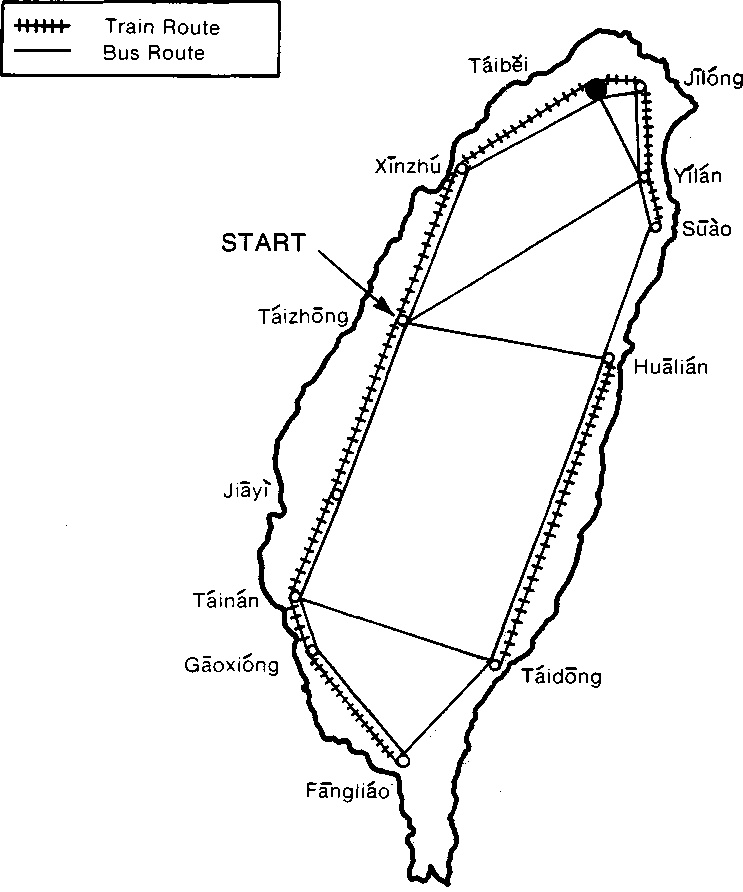
|
NAME |
Liu. |
Chen |
Gāo |
Yang |
|
DESTINATION |
Yílán |
Sūào |
Táidōng |
Gāoxióng |
|
DEPARTURE |
6 p.m. |
6 p.m. |
3 p.m. |
6 p.m. |
ARRIVAL
Mr. Roberts is being seen off guide, Comrade Zhāng.5
R: Zhèibān chē sāndiǎn ban kāi.
Xiànzài liǎngdiǎn wǔshifēn.
Lí kāi chēde shíjiān hái zǎo ne.
Z: Nà hǎo.
Shíjiān hái zǎo, zǎnmen dào jiēdàishì qù xiūxixiuxi ba.
Qǐng nín bǎ nínde hùzhào he luxíngzhèng gěi wo.
R: Hǎo, gěi ni.
When the conversation
at the train station in Beijing by his
The train leaves at 3:30.
It’s 2:50 now.
It’s still a long time till the train leaves.
That’s good.
Since it’s still early, let’s go to the waiting room and rest a bit.
Please give me your passport and travel permit.
All right, here they are.
the
guide returns from having Mr. Roberts’ papers checked continues.
R: Zheibān chēshang you měiyou Is there a dining car on this train?
cānchē?
Z: You. Yes.
R: You meiyou Xīcān?
Z: Xīcān Zhōngcān dōu you.
R: Hen hǎo.
R: Zhāng Nùshi, shang chēde shihou wǒ zhème duō xíngli zěnme ban?
Z: Bié jí.
Yígòng sìjiàn xíngli, women měige rěn nǎ liǎngjiàn, jiù xíng le.
Does it have Western food?
It has both Western food and Chinese food.
Good.
Miss Zhāng, when it’s time to get on the train, what do I do with all this luggage of mine?
Don’t worry.
With a total of four suitcases, if each of us takes two that will be fine.
R: Dōu kéyi náshang chē qu ma?
Z: Dōu kéyi náshang chē qu.
R: Na hǎojíle.
R: Kuài yào kāi chē le.
Women dào zhàntái qu ba.
Z: Bú yòng jí.
Hái you shíjiān.
May all of them be taken onto the train?
All of them may be taken onto the train.
That’s great.
The train is going to leave soon.
Let’s go to the platform.
There’s no need to be anxious.
There’s still time.
This conversation includes questions and answers used in train travel in the PRC. A Canadian professor is talking to her Chinese guide. The professor is going to Nanjing from Beijing.
Listen to the conversation twice. As you listen to it for the third time, translate orally during the pauses provided on tape. Compare your translations with the suggested translations given by the speaker.
Here are some expressions you will need for this exercise:
|
shūfu |
(to be comfortable) |
|
qǐdiǎnzhàn |
(station where a train originates Cliterally, "starting station"]) |
|
děng yìhuǐr |
(in a little while Lpronounced děng yìhuěrJ) |
|
bú yào láilai wǎngwǎng |
(don’t) (coming and going) |
|
bang |
(to help) |
In these two conversations you will hear questions and answers typically used in train travel. Mr. Yamada, a Japanese tourist, talks first to his Chinese guide and then to the train attendant. Mr. Yamada is going to Beijing from Shanghai.
You will hear the conversations three times. As you listen to them for the third time, answer the questions on the next page.
You will hear the following expressions in the conversations.
|
chī |
(to eat) |
|
zhōngwǔ lú cha |
(noon) (green tea) |
|
hong cha bang dāngràn |
(black tea Cliterally, "red tea"! (to help) (of course, naturally) |
QUESTIONS
1. On what platform is Mr. Yamada’s train?
2. The guide says she will
( ) take the small suitcase onto the train.
( ) bring the small suitcase onto the train.
3. What kind of food does Mr. Yamada like for breakfast?
U. Mr. Yamada says he wants
( ) no tea.
( ) red (i.e., ’’black") tea.
( ) green tea.
5. The attendant says she will
( ) bring the suitcases off the train.
( ) take the suitcases off the train.
( ) bring the suitcase off the train.
In this conversation two travelers have arrived with their guide at the train station in Shanghai. One of the travelers is now heading for Nanjing and the other is heading for Guilin.6 One of the travelers has a few questions for the guide.
Listen to the conversation two times. As you listen to it for the third time, translate orally during the pauses provided on tape. Compare your translations with the suggested translations given by the speaker.
Here are some expressions you will need for this exercise:
Guilin ta scenic city in the mountains of
Guǎngxī ProvinceJ
huílai (to come back)
bang (to help)
This exercise gives you practice in using verbs with directional endings to describe actions.
Display I is five pictures that show Wang Dànián, Fang Bǎolán, Hu Měilíng, and Ma Mínglǐ doing various things. Use the information in the display to answer the questions on tape, (item numbers on tape refer to picture numbers.)
Example
TAPE: Mǎ Mínglǐ bǎ xíngli nǎdao nǎr qu le?
YOU: Tǎ náshang lóu qu le.
TAPE: Fang Bǎolán bǎ xíngli nadao nǎr qu le?
YOU: Tā náxia lou qu le.
When ’’you” are in a picture, take into account whether the action is towards or away from you in formulating your answers.
In this exercise you will practice four new words from the Reference List for this unit:
náshangqu (to take up)
náshanglai (to bring up)
náxiaqu (to take down)
náxialai (to bring down)
Verbs with two-syllable directional endings, such as the four verbs above can be split. A location or a direct object is placed before the final lai or qu. This happens in the second sentence of the example above: náshang... qu.
DISPLAY I
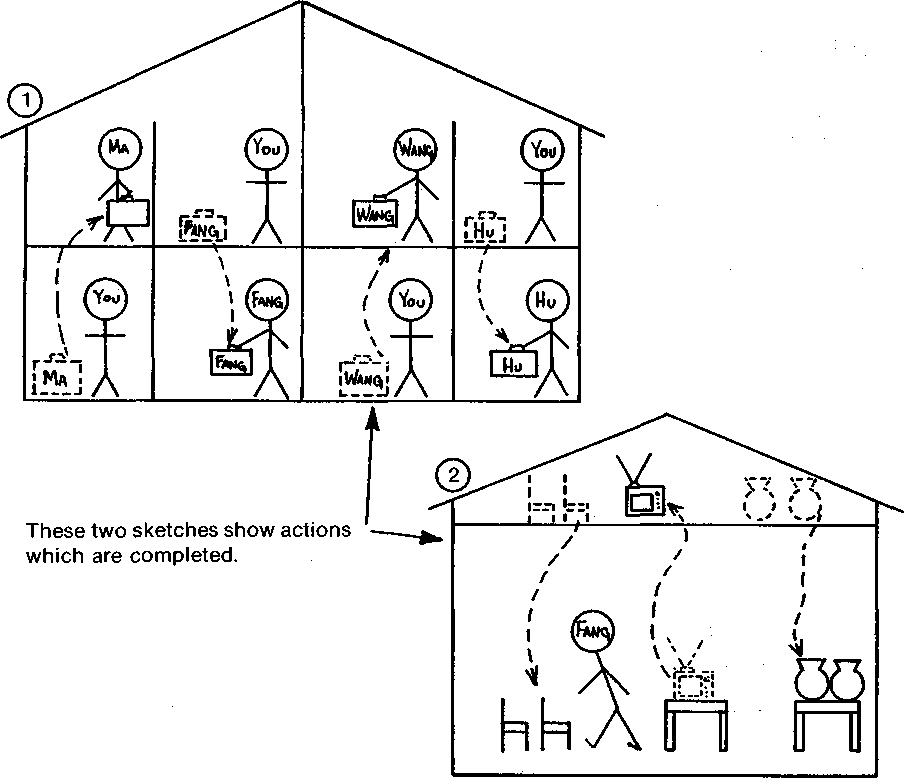
This sketch shows actions which will happen.
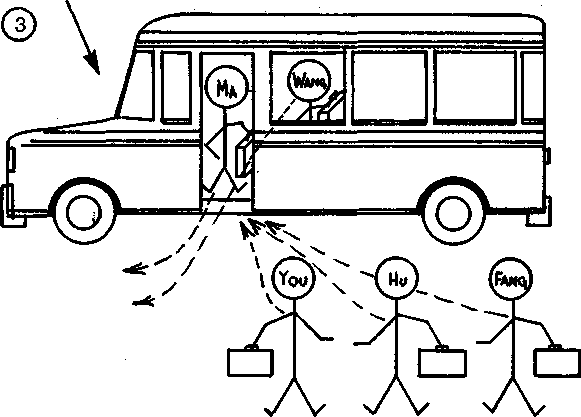
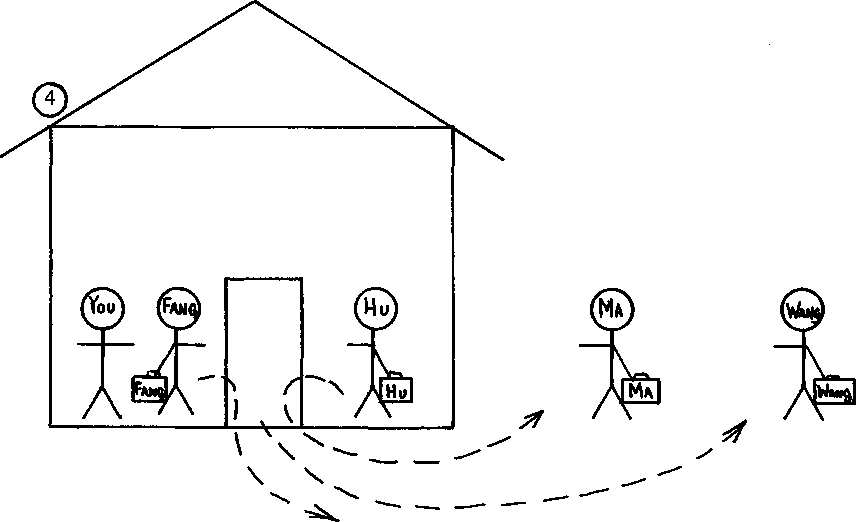
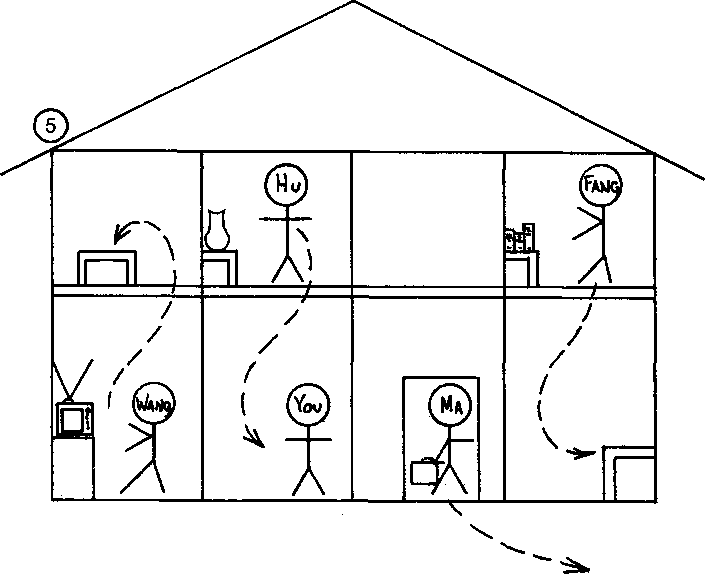
Display II gives the daily schedules for two train routes: Beijing to Shànghǎi and Beijing to Tàiyuǎn. Use this information to answer the questions on tape.
Example
TAPE: Dào Shànghǎi qùde chē měitiān you jibān?
YOU: Měitiān you sānbān.
TAPE: Zǎoshang jǐdiǎn zhōng kāi?
YOU: Zǎoshang bādian sìshiwǔfēn kāi.
TAPE: Nàibān chē you cānchē ma?
YOU: You.
TAPE: Huǒchē jǐdiǎn zhōng dào Shànghǎi?
YOU: Dìèrtiān zǎoshang, bādian èrshibāfēn dào Shànghǎi.
The exchanges on tape take place between you and a friend looking over a train schedule, NOT between a ticket seller and a traveler. Therefore formalities such as using fā chē and 2^-hour clock times are not observed.
DISPLAY II
|
PLATFORM 1 |
WITH DINING CAR |
WITH DINING CAR |
WITH DINING CAR |
|
LV. Beijing* |
8:45 a.m. 10:22 |
a.m. 11:55 a.m. 2:20 p.m. |
5:15 p.m. |
|
ARR. Tianjin |
10:53 a.m. 12:30 |
p.m. 1:33 p.m. 4:12 p.m. |
6:53 p.m. |
|
ARR. Jinan |
4:14 p.m. |
9:33 p.m. |
12:14 a.m. |
|
ARR. Xūzhōu |
10:50 p.m. |
4:08 a.m. |
6:50 a.m. |
|
ARR. Nanj īng |
5:25 a.m. |
10:43 a.m. |
1:25 p.m. |
|
ARR. Shanghai |
8:28 a.m. - |
- 1:16 p.m. |
4:38 p.m. |
|
(next day) |
(next day) |
(next day) | |
|
PLATFORM 4 |
WITH |
WITH | |
|
DINING CAR |
DINING CAR | ||
|
LV. Beijing |
7:10 a.m. |
9:35 a.m. 3:50 p.m. |
6:22 p.m. |
|
ARR. Bǎodìng |
11:23 a.m. |
1:48 p.m. 8:03 p.m. |
10:25 p.m. |
|
ARR. Shijiazhuang 1:55 p.m. |
- _ |
1:27 a.m. | |
|
ARR. Taiyuan |
5:01 p.m. |
“ - |
5 :13 a.m. |
* The traditional map spellings for these cities are
|
Peking Tientsin Tsinan Suehow (Hsuchow) Nanking Shanghai |
Peking Pao-ting Shih-chia-chuang T’aiyūan |
In this exercise you will review the vocabulary and. structures introduced. in this unit. You will test your comprehension and production of the material by acting as an interpreter.
This conversation takes place between Mrs. Smith, a Canadian official recently arrived in Beijing, and a representative of the Chinese government who is assigned to the Canadian Embassy.
First, you will hear the conversation without interruptions. Then it will be presented as if the Canadian cannot speak Chinese and the other employee cannot speak English. Each speaker’s lines will be followed by a pause, during which you will translate.
Example
CANADIAN: I would like to go to see Xīān.
YOU: Wǒ xiǎng qù Xīān kànkan.
CHINESE: Nī dǎsuan shénme shíhou qù?
YOU: When do you plan to go?
CANADIAN: Next Monday.
YOU: Xià Xīngqīyī.
In this exercise you will need the word Xīān, the capital city of Shǎnxī Province. You will also be using some of the additional required vocabulary from previous units:
dǎsuan (to plan)
làibují (can’t make it in time)
INSTRUCTIONS:
Type: Train Routes
Situation: You have already collected the following information from five travelers leaving the Beijing train station: 1) destinations, 2) departure times, 3) track numbers for departing trains, and 4) EITHER the distance OR the traveling time to destinations. Three colleagues have collected similar information from other travelers. (Each person talked to five travelers.)
You need to collect this information from your colleagues and figure out the routes which four trains will follow (i.e., the stops on the routes, in sequence).
Goal: To write the names of the destinations of twenty travelers on your work sheet, under the headings for particular tracks and departure times. Also, to number the stops on each train route in the order of their distances from Beijing.
Number of Players: Groups of four students.
Materials: A work sheet for each player. (See Sample Work Sheets, on the following pages.)
Procedure: Mingle with the players in your group to exchange information.
Example: You are Speaker 1. In this example, you are giving information rather than collecting it. Notice how you "introduce" one of the travelers listed on your work sheet with You yíge rén....
SI: You yíge rén dào Táizhōng qù.
S2: Dào Táizhōng qùde chē jǐdiǎn zhōng kāi?
SI: Shísāndiǎn sìshiwǔfēn fā chē.
S2: Zài dìjī zhàntái?
SI: Zài dìyī zhàntái.
S2: Nǐ zhīdao bu zhidao Táizhōng lí zhèr7 you duo yuan?
SI: Wǒ bù zhīdào.
S2: Nǐ zhīdao bu zhidao yào zōu duōshao shíhou?
SI: Yào zōu liǎngge duō xiǎoshí.7 Hái you yíge rén.... (etc.)
Practice Points: Train schedule information.
SAMPLE WORK SHEET:8
TRAVELER DEPARTURE TRACK DESTINATION DISTANCE TIME
|
1 |
131+5 |
1 |
Taizhong |
2+ hrs | |
|
2 |
11+15 |
1 |
J ilong |
15+ km | |
|
3 |
131+5 |
1 |
Xinzhu |
60+ km | |
|
1+ |
11+15 |
1 |
Yilan |
1+ hrs | |
|
5 |
131+5 |
1 |
Jiayi |
3+ hrs |
NOTE: Trains average 50 kilometers per hour. Use this information to convert time to distance and vice versa.
ROUTES
|
Track 1: 1345 DESTINATION |
time/ dist. |
Track 1: 11+15 DESTINATION |
time/ dist. |
Track 2: 131+5 DESTINATION |
time/ dist. |
Track 2: 11+15 DESTINATION |
time/ dist. |
TRAVELER DEPARTURE TRACK DESTINATION DISTANCE TIME.
|
1 |
1415 |
1 |
Guangzhou |
1800+ km | |
|
2 |
1345 |
2 |
Hangzhou |
28+ hrs | |
|
3 |
1415 |
1 |
Shijiazhuang |
5+ hrs | |
|
4 |
1345 |
1 |
Taiyuan |
400+ km | |
|
5 |
1415 |
2 |
Tángshān |
200+ km |
ROUTES
Track 1: Track 1: Track 2: Track 2:
13^5 1415 1345 1415
DESTINATION time/ DESTINATION time/ DESTINATION time/ DESTINATION time/ dist. dist. dist. dist.
TRAVELER DEPARTURE TRACK DESTINATION DISTANCE TIME
|
1 |
11+15 |
1 |
Changsha |
26+ hrs | |
|
2 |
131+5 |
1 |
Chéngdū |
1500+ km | |
|
3 |
11+15 |
2 |
Shenyang |
13+ hrs | |
|
1+ |
13U5 |
2 |
Tiānj in |
2+ hrs | |
|
5 |
131+5 |
2 |
Xúzhōu |
1200+ km |
ROUTES
|
Track 1: 131+5 |
Track 1: 11+15 |
Track 2: 13U5 |
Track 2: 11+15 | ||||
|
DESTINATION |
time/ dist. |
DESTINATION |
time/ dist. |
DESTINATION |
time/ dist. |
DESTINATION |
time/ dist. |
|
TRAVELER |
DEPARTURE |
TRACK |
DESTINATION |
DISTANCE |
TIME |
|
1 |
1345 |
1 |
Chongqing |
36+ hrs | |
|
2 |
13^5 |
2 |
Fúzhōu |
2000+ km | |
|
3 |
1415 |
2 |
Hāěrbīn |
1100+ km | |
|
4 |
1345 |
1 |
Kunming |
53+ hrs | |
|
5 |
1415 |
2 |
Tiānjin |
100+ km |
ROUTES
|
Track 1: 1345 |
Track 1: 1415 |
Track 2: 1345 |
Track 2; 1415 | ||||
|
DESTINATION |
time/ dist. |
DESTINATION |
time/ dist. |
DESTINATION |
time/ dist. |
DESTINATION |
time/ dist. |
TRAVELER DEPARTURE TRACK DESTINATION DISTANCE TIME
|
1 |
1345 |
1 |
Guìyáng |
U5+ hrs | |
|
2 |
13H5 |
2 |
Shanghai |
1250+ km | |
|
3 |
13^5 |
1 |
Shijiazhuang |
250+ km | |
|
It |
13^5 |
2 |
Sūzhōu |
1200+ km | |
|
5 |
1U15 |
1 |
Wuhan |
19+ hrs |
ROUTES
Track 1:
13^5
Track 1:
1H15
Track 2: Track 2:
13^5 1U15
DESTINATION time/ DESTINATION time/ DESTINATION time/ DESTINATION time/
dist. dist. dist. dist.
This exercise will give you practice with the ending -hǎo for compound verbs of result.
The conversation takes place in Běijīng. Comrade Lī, who is going to Xīān on a business trip, is talking with Comrade Wang, who works in the General Services Department of the same ministry.
You will hear the conversation three times. As you listen to it for the third time, answer the questions below.
Here are five expressions you will need for this exercise:
Xīān
hai hǎo kāi huì
sījī gǎnbushǎng
^formerly spelled Sian, capital of Shǎnxī (formerly Shensi) Province!]
(fairly good/well)
(to attend a meeting/conference)
(driver of a hired vehicle)
(won’t be able to catch Ca plane, a train, etc.3)
You will notice that the word for "if" may follow the subject as well as precede it.
QUESTIONS
1. How busy was Comrade Wang? _________________________________________
2. Is there enough time for Comrade Lī to get to Xīān by train?
( ) Yes ( ) No
3. What does Comrade Wang want Comrade Lī to do?
H. What time does the plane take off?
5. How does Comrade Lī decide to go to the airport?
6. When does she have to be ready? _____________________________________
In this conversation you will hear expressions used in arranging for plane tickets and getting to the airport. Mrs. Anderson, a Canadian, is talking with Mr. Zhāng, a Chinese employee of the Canadian Embassy in Beijing.
Listen to the conversation twice. As you listen to it for the third time, translate orally during the pauses provided on tape. Compare your translations with the suggested translations given by the speaker.
You will need to know the word -jiàn, meaning matters): yíjiān shì, "one matter," "one piece of
"piece" (counter for business"
This exercise will give you practice with the words for "send," "take," and "deliver." The conversation takes place between two cadres, Comrade Wú (Department Chief Fang’s secretary) and Comrade Lī (a cadre in the General Services Department of a government bureau in Beijing).
Listen to the conversation twice. As you listen to it for the third time, translate orally during the pauses provided on tape. Compare your translations with the suggested translations given by the speaker.
Here are some expressions you will hear:
chùchāng (division chief)
chū chāi (to go on a business trip)
Yán’ān Ca city in Shānxī Province (formerly
Shensi), headquarters of the Chinese Communists during the civil war!
dǎ diànhuà (to phone, to make a phone call)
To say "as soon as...then...," use the sequence yī...j iù.■.. For example,
Tā yì lai wǒ jiù zǒu. (As soon as he comes, CthenJ I
will leave.)
In this exercise you will make plane reservations. Display I gives you information needed to reserve plane tickets for five trips: destinations, departure dates, and preferred arrival times. For each trip, provide the appropriate information as you answer questions on tape. Then ask three questions: 1) At what time will the plane take off? 2) Is the flight nonstop? 3) At what time does the plane reach its destination?
Example
YOU: Wǒ xià xīngqī yào dào Guangzhou qù. Qīng ni gěi wo ding
yìzhāng fēijī piào.
TAPE: Měitiān dōu you fēijī. Nī něitiān qù?
YOU: Wǒ Xīngqīsi qù.
TAPE: Xīngqīsì you sāhbān fēijī. Zǎoshang you yìbān, xiàwǔ you liǎngbān. Nī yào zǎoshang qù hǎishi xiàwǔ qù?
YOU: Wǒ yào zǎoshang qù. . . . Nèibān fēijī jīdiǎn zhōng qǐfēi?
TAPE: Jiǔdiǎn ling wǔfēn qǐfēi.
YOU: Zhèibān fēijī zhí fēi Guǎngzhōu ma?
TAPE: Shi, zhí fēi Guǎngzhōu.
YOU: Jīdiǎn zhōng dào Guǎngzhōu?
TAPE: Shíèrdiǎn shífēn dào Guǎngzhōu.
DISPLAY I
YOU WANT TO AT WHAT TIME
RESERVE A AT WHAT TIME IS THE. WILL THE
PLANE TICKET WILL THE FLIGHT PLANE REACH
FOR NEXT YOU WANT TO YOU WANT TO PLANE TAKE NON- ITS
WEEK TO LEAVE ON ARRIVE BY OFF? STOP? DESTINATION?
|
Guǎngzhōu |
Thursday |
noon | |||
|
Shànghǎi |
Saturday |
evening | |||
|
Chengdu |
Monday |
Tuesday evening | |||
|
Hangzhou |
Wednesday |
morning |
In this exercise you will talk about train routes in the PRC. Display II shows train routes between some of the major cities. Using the information found in the display, answer the questions on tape about what routes pass through what cities.
Example
TAPE: Cong Xuzhōu dào Beijing wàng běi zǒu ma?
YOU: Shi, Xīān wàng běi zǒu, zài wàng xī zǒu.
TAPE: Cong Xuzhōu dào Beijing, rúguo zuò huǒchē jīngguo Jìnán ma?
YOU: Jīngguo jìnán.
TAPE: Jīngguo Liányungǎng ma?
YOU: Bù jīngguo Liányungǎng.
For this exercise you will need the verb jīngguo, "to pass through."
You will act as an interpreter in this conversation. Mrs. Smith, a Canadian official recently arrived in Běijīng, is talking with a representative of the Chinese government who is assigned to the Canadian Embassy.
First, you will hear the conversation without interruptions. Then it will be presented as if the Canadian cannot speak Chinese and the other employee cannot speak English. Each sentence will be followed by a pause, during which you will translate.
Example
|
CANADIAN: |
I want to go to Nánjīng next Thursday. |
|
YOU: |
Wǒ xià Xīngqīsì yào dào Nánjīng qù. |
|
CANADIAN: |
Please reserve a plane ticket for me. |
|
YOU: |
Qīng ni gěi wo ding yìzhāng fēijī piào |
|
CHINESE: |
Hǎo, wǒ qù gěi ni ding. |
|
YOU: |
Fine. I’ll go reserve one for you. |
For this exercise you will need the word wàng, "to forget."
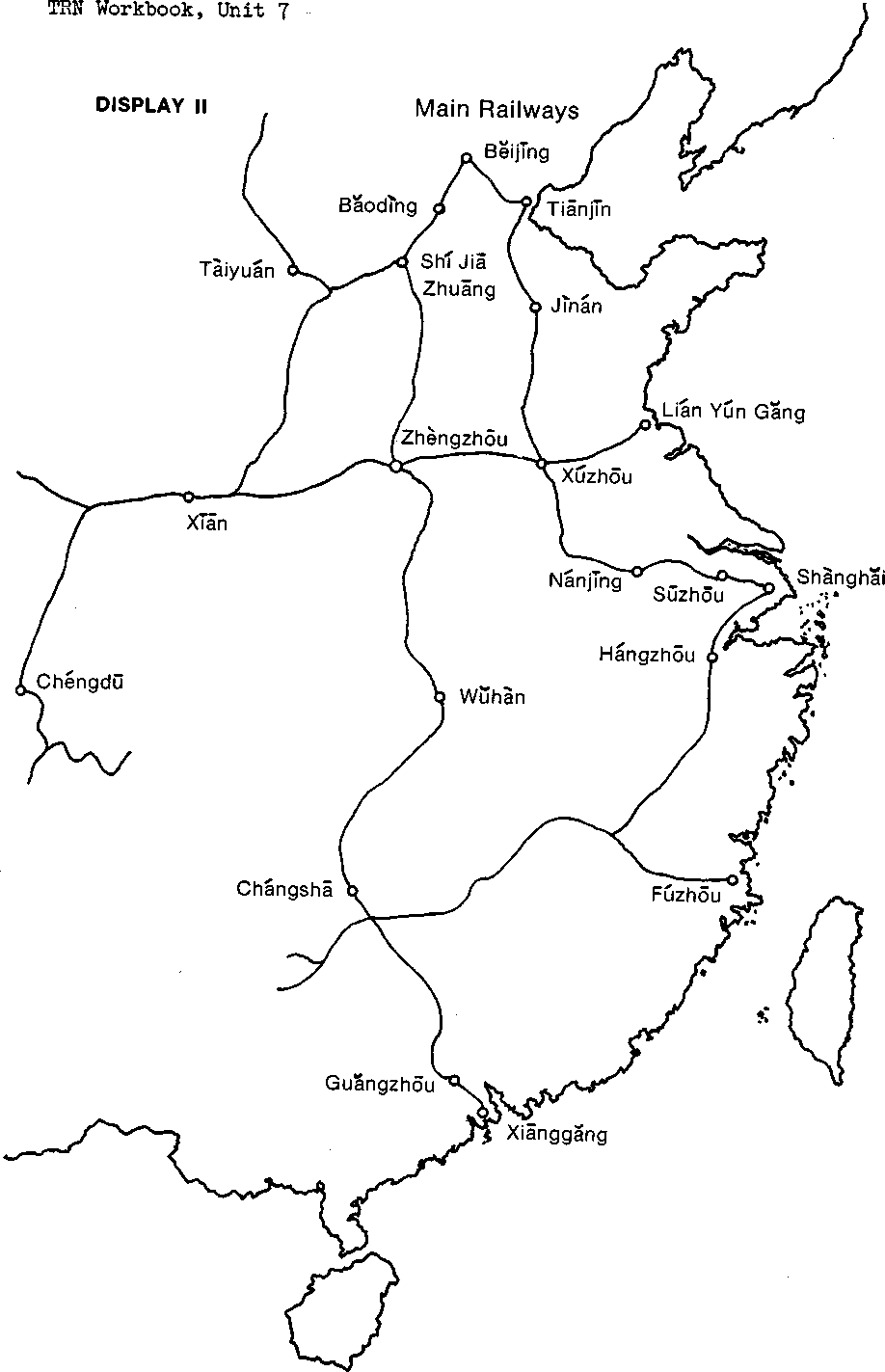
INSTRUCTIONS:
Type: Fastest Route
Situation: A traveler in Taiwan is trying to work out the fastest route from a particular location in one city to a certain location in another city, by taxi, bus, plane, and train.
A travel agent has bus, train, and plane schedules as well as information about the traveling time by taxi between locations in cities. For the purposes of this game, he does not actively help work out the fastest route for the traveler.
Goal: Given the starting time, to work out the fastest route from the starting point to the destination.
Number of Players: Pairs of students.
Materials: A fact sheet for the "traveler" and a fact sheet for the "travel agent." (See Sample Fact Sheets, on the following pages.) The "traveler" will also need pencil and paper.
Procedure: The "traveler" questions the "travel agent."
Example: You are Speaker 1, the "traveler." This example covers only one possible route.
SI: Wǒ yào dào Huālián qù. Xià yìbān fēijī jīdiǎn zhōng qīfēi?
S2: Shíèrdiān shíwùfēn qǐfēi.
SI: Xiànzài shíèrdiān zhōng le, láibují le. Jīntiān hái you yìbān qù Huāliánde fēijī ma?
S2: You, shíqīdiǎn zhōng qīfēi.
SI: Jīdiǎn zhōng dào Huālián?
S2: Shíbādiān zhōng dào.
SI: Cong Huālián fēijīchǎng dào lùguān yào duōshao shíjiān?
S2: Dàgài yào bànge zhōngtóu.
(etc.)
Additional Note: There may not be enough time for the "traveler" to check out all possible routes and be sure that he has found the fastest route.
In that case, students in the class who used identical fact sheets as "travelers" can discuss their findings at the conclusion of the game.
Practice Points: Traveling times, departure times, and arrival times.
SAMPLE FACT SHEET: (Traveler)
Taibei to Huālián
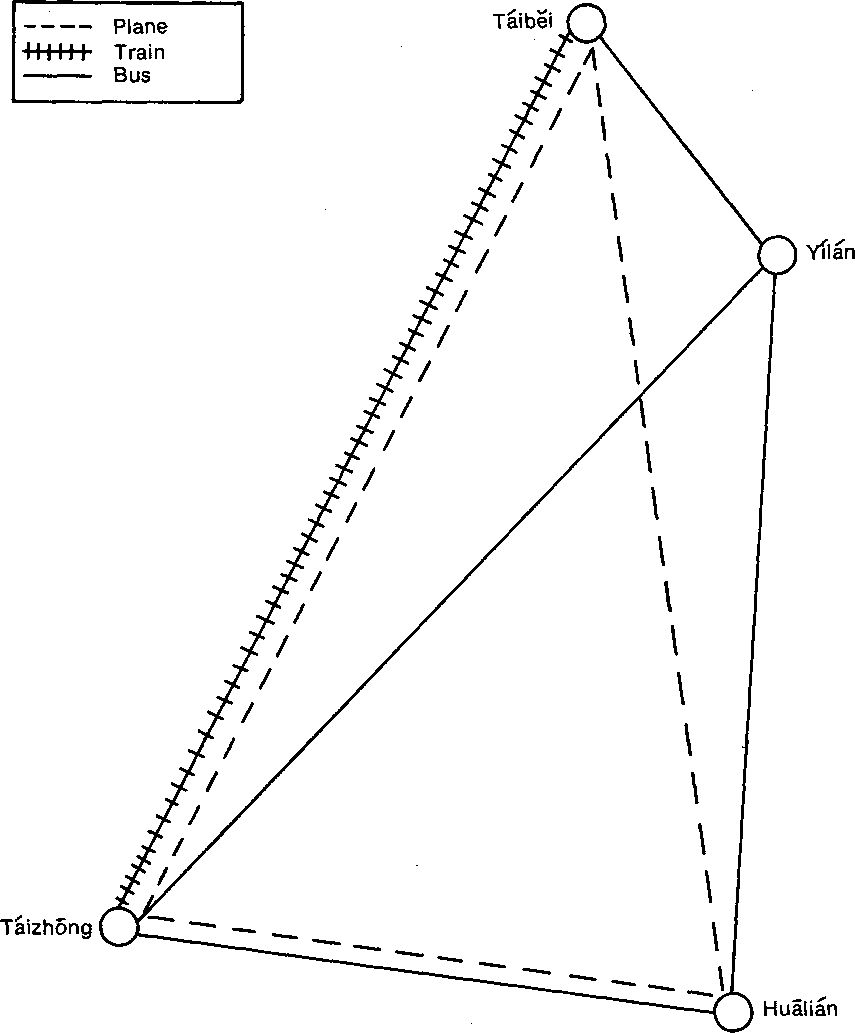
You are at the Ambassador Hotel in Taiběi at twelve o’clock. You are trying to reach the Yǎshìdū Hotel in Huālián as fast as you can.
SAMPLE FACT SHEET (TRAVEL AGENT):
Táiběi to Huālián
BUS
TRAIN Táiběi Táizhōng
|
Táiběi (Taipei)9 Yílán (Ilan) Yílán Huālián (Hualien) |
(departure) 1300 | |
|
(arrival) (departure) (arrival) |
11+00 1630 1930 | |
|
Yílán |
(departure) |
11+30 |
|
Táizhōng (Taichung) |
(arrival) |
1900 |
|
Táizhōng |
(departure) |
1500 2015 |
|
Huālián |
(arrival) |
181+5 21+00 |
(departure) 1315
(arrival) 1535
PLANE
|
Táiběi |
(departure) |
1215 |
|
Táizhōng |
(arrival) |
1315 |
|
Táizhōng |
(departure) |
161+5 |
|
Huālián |
(arrival) |
1730 |
|
Táiběi |
(departure) |
1700 |
|
Huālián |
(arrival) |
1800 |
TAXI
trips to/from airports: 30 minutes
other trips: 15 minutes
NOTE: Passengers must arrive at airports at least 30 minutes before departure time and at train and bus stations at least 15 minutes before departure time.
Yiìán to Táizhōng
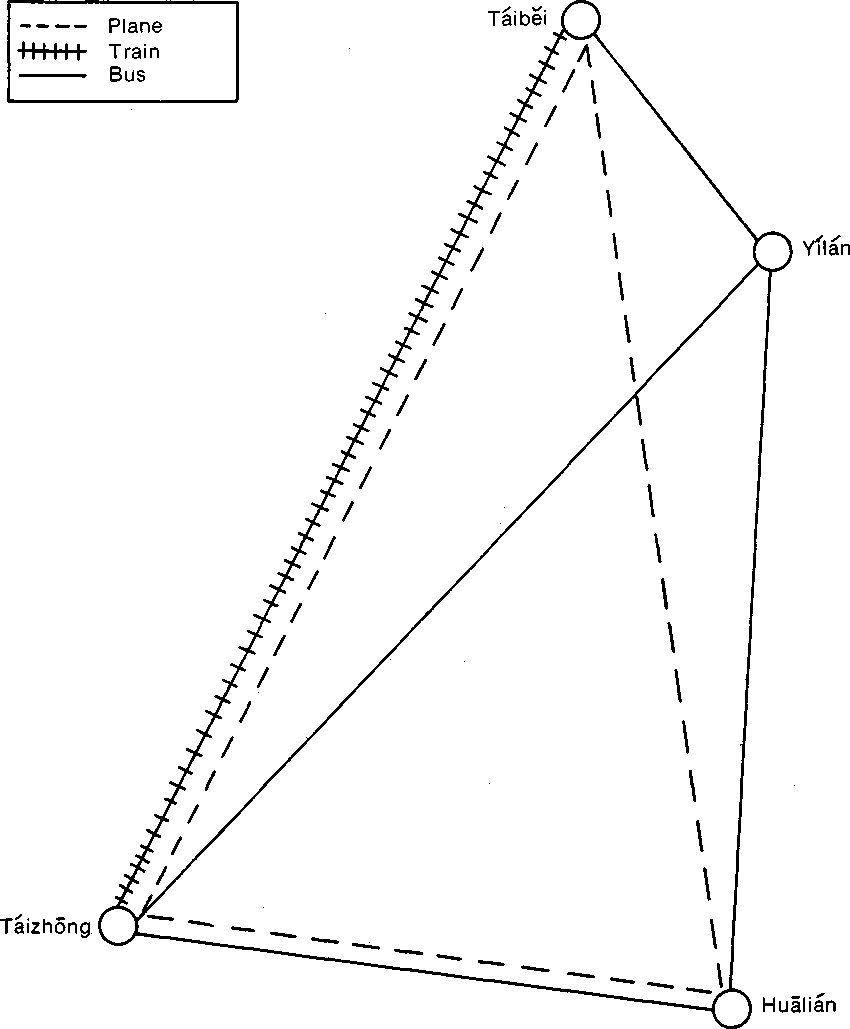
You are at the bus station in Yílán at 7:^5* You are trying to reach the Shuāngměi Hotel in Táizhōng as fast as you can.
Yílán to Taizhōng
BUS
TRAIN Táiběi Taizhōng
|
Yílán (Ilan)10 |
(departure) |
0805 |
|
Táiběi (Taipei) |
(arrival) |
0905 |
|
Yílán |
(departure) |
0815 |
|
Táizhōng (Taichung) |
(arrival) |
1300 |
|
Yílán |
(departure) |
0810 |
|
Huālián (Hualien) |
(arrival) |
1100 |
|
Huālián |
(departure) |
1115 |
|
Táizhōng |
(arrival) |
1500 |
(departure) 0905 1035
(arrival) 1125 1255
PLANE
|
Táiběi |
(departure) |
O9U5 |
1215 |
|
Táizhōng |
(arrival) |
IOU5 |
1315 |
|
Táiběi |
(departure) |
0900 |
1130 |
|
Huālián |
(arrival) |
1000 |
1230 |
|
Huālián |
(departure) |
1200 |
1345 |
|
Táizhōng |
(arrival) |
1245 |
1430 |
TAXI
Táiběi: bus station to airport—45 minutes
Táiběi: bus station to train station—15 minutes
Huālián: bus station to airport—30 minutes
Táizhōng: bus station to hotel—15 minutes
Táizhōng: train station to hotel—15 minutes
Táizhōng: airport to hotel—30 minutes
NOTE: Passengers must arrive at airports at least 30 minutes before departure time and at train and bus stations at least 15 minutes before departure time.
Taizhōng to Yílán
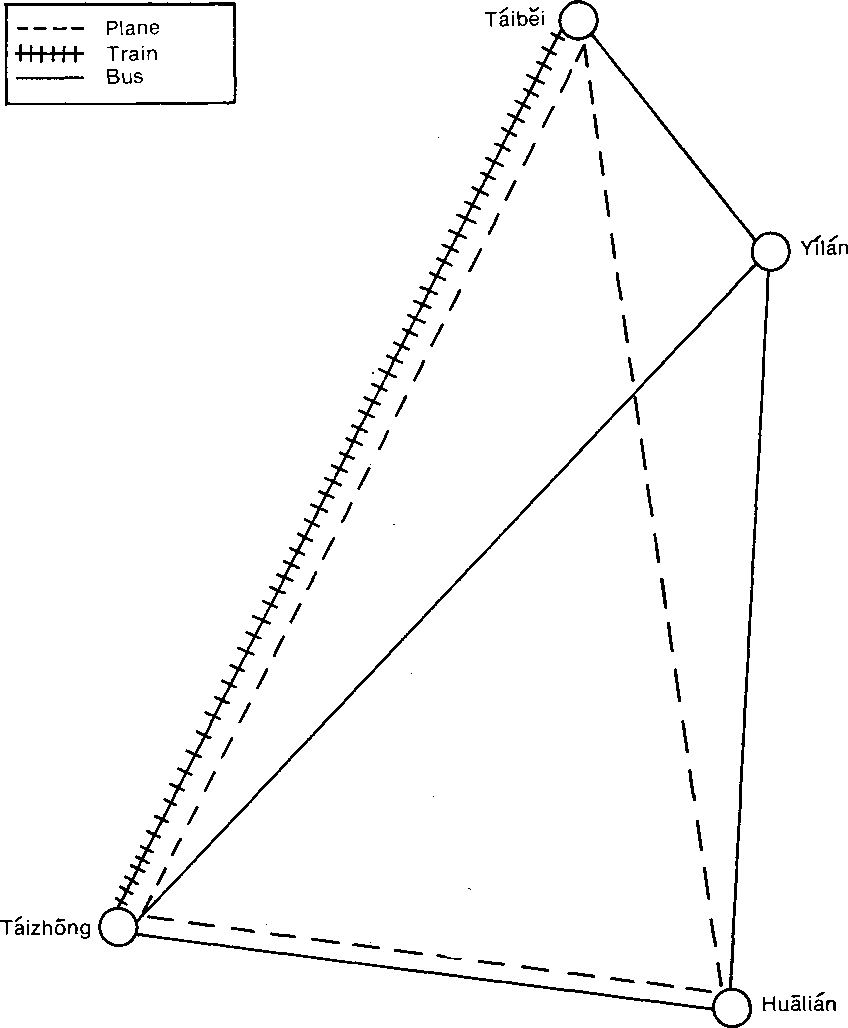
You are at the Shuāngměi Hotel in Táizhōng at four o’clock. You are trying to reach the bus station in Yílán as fast as you can.
Táizhōng to Yílán
BUS
TRAIN Táizhōng Táiběi
|
Táizhōng (Taichung)11 Yílán (Ilan) |
(departure) 1615 |
1800 221+5 | |||
|
(arrival) |
2100 | ||||
|
Táizhōng |
(departure) |
11+1+5 |
161+5 | ||
|
Huālián (Hualien) |
(arrival) |
1830 |
2030 | ||
|
Huālián |
(departure) |
181+5 |
201+5 | ||
|
Yílán |
(arrival) |
2130 |
2330 | ||
|
Táiběi (Taipei) |
(departure) |
1900 |
2000 |
2100 |
2200 |
|
Yílán |
(arrival) |
2000 |
2100 |
2200 |
2300 |
(departure) 1615 181+5
(arrival) 1835 2105
TAXI
Táizhōng: Táizhōng: Táizhōng: Táiběi: Táiběi:
Huālián:
PLANE
|
Tái zhōng Táiběi |
(departure) 1630 |
1930 2030 | |
|
(arrival) |
1730 | ||
|
Táizhōng |
(departure) |
1715 |
191+5 |
|
Huālián |
(arrival) |
1800 |
2030 |
|
Huālián |
(departure) |
181+5 |
2100 |
|
Táiběi |
(arrival) |
19^5 |
2200 |
hotel to bus station—15 minutes
hotel to train station—15 minutes
hotel to airport—30 minutes
train station to bus station—15 minutes
airport to bus station—15 minutes
airport to bus station—30 minutes
NOTE: Passengers must arrive at airports at least 30 minutes before departure time and at train and bus stations at least 15 minutes before departure time.
Yílán to Táizhōng
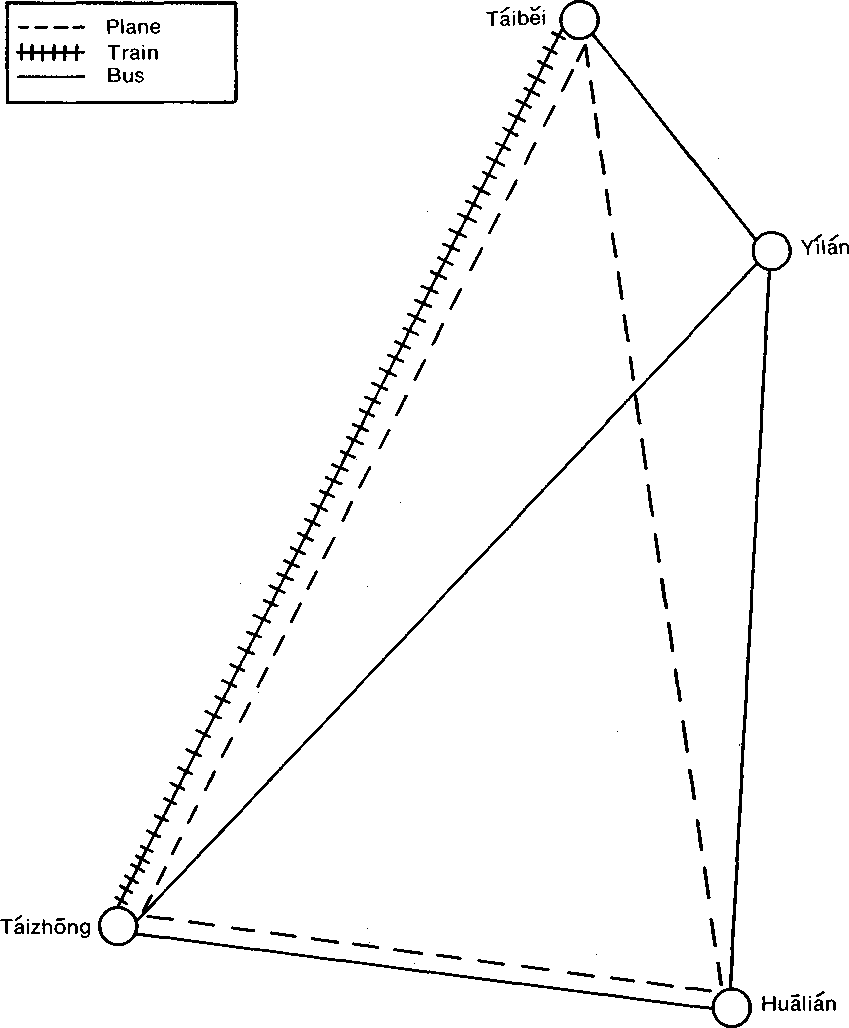
You are at the bus station in Yílán at T‘-^5. You are trying to reach the Shuāngměi Hotel in Táizhōng as fast as you can..
Yílán to Táizhōng
BUS
TRAIN Táiběi Táizhōng
|
Yílán (Ilan)12 |
(departure) |
0805 |
|
Táiběi (Taipei) |
(arrival) |
0905 |
|
Yílán |
(departure) |
0815 |
|
Táizhōng (Taichung) |
(arrival) |
1300 |
|
Yílán |
(departure) |
0810 |
|
Huālián (Hualien) |
(arrival) |
1100 |
|
Huālián |
(departure) |
1115 |
|
Táizhōng |
(arrival) |
1500 |
(departure) 0905 1035
(arrival) 1125 1255
PLANE
|
Táiběi Táizhōng |
(departure) (arrival) |
O9H5 10U5 |
1215 1315 |
|
Táiběi |
(departure) |
0900 |
1130 |
|
Huālián |
(arrival) |
1000 |
1230 |
|
Huālián |
(departure) |
1200 |
I3H5 |
|
Táizhōng |
(arrival) |
12U5 |
1U30 |
TAXI
|
Táiběi: |
bus station to airport—U5 minutes |
|
Táiběi: |
bus station to train station—15 minutes |
|
Huālián: |
bus station to airport—30 minutes |
|
Táizhōng: |
bus station to hotel—15 minutes |
Táizhōng: train station to hotel—15 minutes
Táizhōng: airport to hotel—30 minutes
NOTE: Passengers must arrive at airports at least 30 minutes before departure time and at train and bus stations at least 15 minutes before departure time.
Táizhōng to Yílán
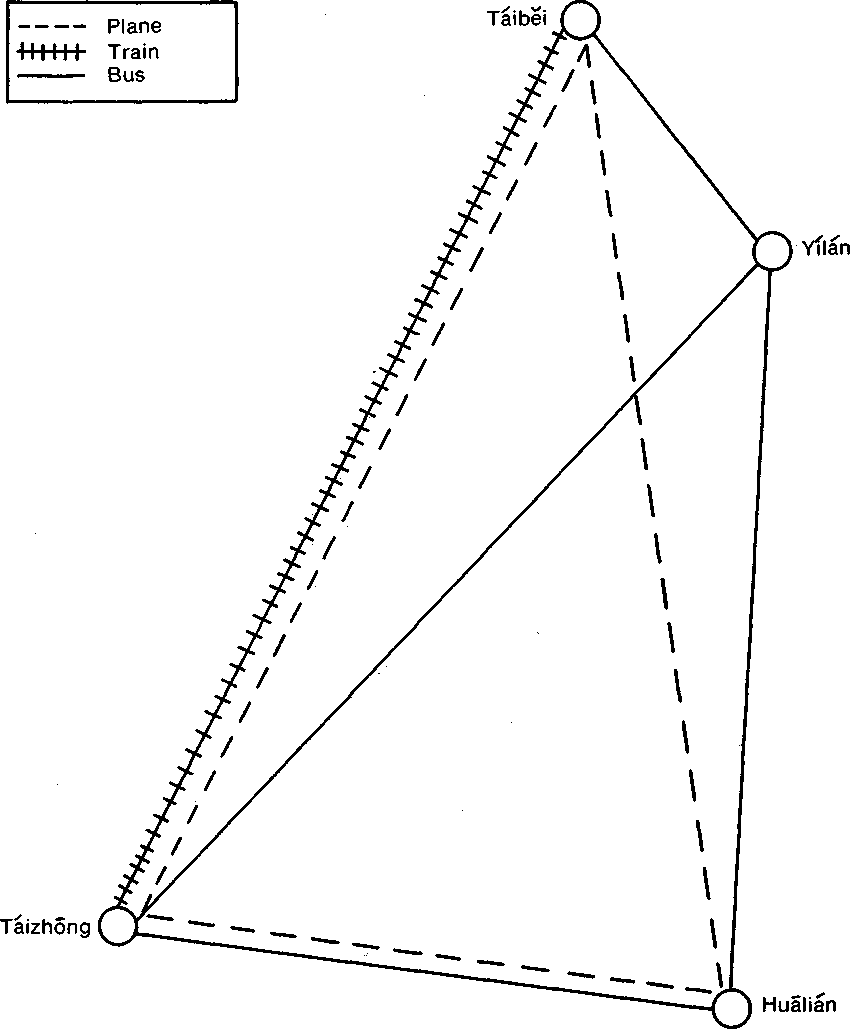
You are at the Shuāngměi Hotel in Táizhōng at four o’clock. You are trying to reach the hus station in Yílán as fast as you can.
Táizhōng to Yílán
TAXI
Táizhōng: Táizhōng: Táizhōng: Táiběi: Táiběi: Huālián:
|
BUS Táizhōng (Taichung)13 Yílán (Ilan) |
(departure) 1615 |
1800 2245 | |
|
(arrival) |
2100 | ||
|
Táizhōng |
(departure) |
1445 |
1645 |
|
Huālián (Hualien) |
(arrival) |
1830 |
2030 |
|
Huālián |
(departure) |
1845 |
2045 |
|
Yílán |
(arrival) |
2130 |
2330 |
|
Táiběi (Taipei) |
(departure) |
1900 |
2000 2100 2200 |
|
Yílán |
(arrival) |
2000 |
2100 2200 2300 |
|
TRAIN | |||
|
Táizhōng |
(departure) |
1615 |
1845 |
|
Táiběi |
(arrival) |
1835 |
2105 |
|
PLANE | |||
|
Táizhōng |
(departure) |
1630 |
1930 |
|
Táiběi |
(arrival) |
1730 |
2030 |
|
Táizhōng |
(departure) |
1715 |
1945 |
|
Huālián |
(arrival) |
1800 |
2030 |
|
Huālián |
(departure) |
1845 |
2100 |
|
Táiběi |
(arrival) |
1945 |
2200 |
hotel to bus station—15 minutes
hotel to train station—15 minutes
hotel to airport—30 minutes
train station to bus station—15 minutes
airport to bus station—15 minutes
airport to bus station—30 minutes
NOTE: Passengers must arrive at airports at least 30 minutes before departure time and at train and bust stations at least 15 minutes before departure time.
This conversation is between two to a division chief (chùzhǎng).14
F: Lǎo Yang, hǎo jiǔ méi jiàn.
Zenmeyàng?
M: Nǐ hǎo. You liǎngge yuè méi jiàn le ba!
F: Nǐ chūmén le ma?
M: Duì le. Wǒ sāntiǎn yǐqiǎn gang huílai.
F: Nǐ dōu dào nǎr qù le?
M: Shàngge yuè wo péi Mǎ Tǒngzhì dào Beijīng qu le.
Zài nàr gōngzuòle sānge xīngqī.
F: Nǐ wèishénme méi gàosong women?
M: Yīnwei nèige shíhou wǒ bù zhīdao wǒ néng bu néng qù.
Wǒ zhīdao yǐhòu yǐjīng lǎibují gàosong ni.
F: Zài Beijīngde lǎo péngyou dōu kànjian le ba?
M: Zài Beijīngde shíhou hen mǎng.
Chinese, one of whom is an assistant
Yang, I haven’t seen you for a long time.
How are things going?
How are you? We haven’t seen each other for two months, I think!
Have you been away?
That’s right. I just got back three days ago.
What places did you goto?
Last month I accompanied Comrade Mǎ to Beijīng.
We worked there for three weeks.
Why didn’t you tell us?
Because at that time I didn’t know whether I would be able to go or not.
When I knew, it was already too late to tell you.
You saw all your old friends in Beijīng, I suppose?
When I was in Beijīng, I was very busy.
Mei dōu kànjiari.
Jiù kànjian Huang Wénshēng, Zhao Zīyàn le.
Xiàge yuè wǒ dàgài hái yào zài dào Beijing qu.
Nèige shíhou wǒ qù kànkan Lǎo Wèi gēn Xiǎo Zheng.
Shàngge xīngqī wǒ you péi Fǎng Chùzhǎng yìqī dào Hangzhou qu le.
F: Nī zhēn mǎng a!
M: Éi, mǎng yìdiǎnr.
Hangzhou zhēn shi piàoliang.
Yīhòu you jīhui nī děi dào nàr qu yici.
I didn’t see all of them.
I saw only Huang Wénshēng and Zhào Zīyàn.
Next month I will probably go to Běijīng again.
I’ll go to see Wèi and Zheng then
Last week I accompanied Division Chief Fang to Hangzhou again.
You are really busy!
Yes, I am a little busy.
Hangzhou is really beautiful.
If you have an opportunity later, you must go there.
In this conversation you will hear questions and answers typically used in describing a trip. Comrade Wang, who works for the Ministry of Public Health in Beijing, is visiting the Ministry of Finance on business. While there, she stops by the office of her friend Comrade Xu, who works there.
You will hear the conversation three times. • As you listen to it for the third time, answer the questions below.
Here are some expressions you will need for this exercise:
|
hai hǎo |
(fairly good/well) |
|
zuìjìn |
(recently) |
|
shōudao |
(to receive CYou have already learned shōu, "to accept."]) |
|
huí jiā xìn |
(to return home) (letter, mail) |
|
suōyi |
(therefore, so) |
|
huār kāile |
(the flowers have bloomed Cliterally, "opened"]) |
|
rènao |
(to be lively/noisy/bustling) |
QUESTIONS
1. How many times did Comrade Xu go to Sūzhōu recently?
2. Which time did he see his younger brother?
( ) the first ( ) the second ( ) the third
3. How many years had it been since Lǎo Xu had seen his younger brother?
U. Does Comrade Wang think Sūzhōu is beautiful this time of year? ( ) Yes ( ) No
5. Was Sūzhōu bustling when Comrade Xu was there?
( ) Yes ( ) No
6. What is Comrade Wang going to do when she leaves Comrade Xu’s office?
In this conversation you will hear the two words for "again."
Mrs. Marlowe is an official of the Canadian Embassy in Beijing. She is talking to a Chinese employee of the embassy.
You will hear the conversation three times. As you listen to it for the third time, answer the questions below.
Here are some expressions you will need for this exercise: juéde (to feel that, to think that)
you yìsi; mei(you) yìsi (to be interesting; to be
uninteresting)
huí guó (to return to one’s native country)
huíqu (to go back)
jiānglái (in the future)
yídìng (certainly, definitely)
QUESTIONS
1. How long has Mrs. Marlowe been at the embassy?
2. How many times has Mrs. Marlowe been to Hangzhou recently?
3. Where did her friend come from? _______________________________________
U. Which city does Mrs. Marlowe like best?
5. Has Mrs. Marlowe’s friend been in China before? ( ) Yes ( ) No
6. Did Mrs. Marlowe find Shanghai interesting? ( ) Yes ( ) No
7. How about her friend? ( ) Yes ( ) No
8. Which cities has the Chinese employee visited?
In this conversation an American businessman is talking to a Chinese acquaintance in Taipei.
Listen to the conversation two times. As you listen to it for the third time, translate orally during the pauses provided on tape. Compare your translations with the suggested translations given by the speaker.
Here are some words you will need for this exercise:
|
Jilong |
Ca city in Taiwan; map spelling— Keelungl |
|
Xīnzhú |
Ca city in Taiwan; map spelling— |
|
HsinchuH | |
|
Jiāyì |
Ca city in Taiwan; map spelling— |
|
Chi ay i I | |
|
juéde |
(to think that, to feel that) |
|
biéde |
(other) |
|
gēn |
(with) |
|
Rìyuètán |
(Sun-Moon Lake) |
In this exercise you will take part in eight short exchanges. You will discuss how long it has been since you did certain things.
Display I lists various activities. It also shows how long it has been since you last did them. Use this information to answer the questions on tape. In each exchange you will accept an invitation for an activity listed in the display.
Example
TAPE: Nǐ xiang bu xiǎng he wǒ yìqǐ qù kàn diànyǐng?
YOU: Hǎo a. Wǒ he ni yìqǐ qù. Hǎo jiǔ mei kàn diànyǐng le.
TAPE: Nǐ you duo jiù mei kàn diànyǐng le?
YOU: You sān-sìge yuè mei kàn diànyǐng le.
Notice the use of the marker le for a new situation. You always talk of how long it has been as of now, just as you do with ages: Nǐ duo dà le? Wǒ sānshiliù suì le.
For this exercise you will need the word dòngwùyuǎn, ’’zoo."
DISPLAY I
FOR A LONG TIME, YOU HAVEN’T YOU HAVEN’T HAD AN
HAD AN OPPORTUNITY TO OPPORTUNITY FOR
|
see a movie |
3 or 1 months |
|
go to visit Guō Huìrǎn |
2 months |
|
go to the zoo |
6 months |
|
go to visit Wu Shàowén |
1 month |
|
go to the New China Bookstore |
3 months |
|
go to the Beijing Exhibition Hall |
1 year |
|
go to the Dōngdān Market |
2 months |
|
go to visit Gāo Zìqiǎng |
1 month |
In this exercise you will take part in six short conversations. You will talk about places you have visited in Taiwan.
More specifically, you will talk about when you last visited a city, how many times you have been there, and whether you have seen all the points of interest there. Or you will say that you have been to a city only once and that you would like to go again.
Display II lists places you will talk about and gives information you need to answer the questions on tape.
Example
TAPE: Nǐ shì bu shi dào Tainan qùguo hǎojīcì le?
YOU: Shì. Wǒ shàngge yuè you qù le yícì.
TAPE: Nǐ yígòng qùle Jǐcì le?
YOU: Wǒ yígòng qùle sìcì le.
TAPE: Tainan yǒumíngde dìfang nǐ dàgài dōu qùguo le ba?
YOU: Dōu qùguo le.
OR
TAPE: Nǐ shì bu shi dào Jīlóng qùguo hǎojǐcì le?
YOU: Bú shi, wǒ jiù qùguo yícì.
TAPE: Jīlóng you yìsi ma?
YOU: Jīlóng hen you yìsi. Yàoshi you Jīhui wǒ xiǎng zài qù yícì.
TAPE: Jīlóngde dà gōngchǎng nǐ dōu qùguo le ma?
YOU: Dōu méi qùguo.
For this exercise you will need the expressions yǒumíngde dìfang, "famous place," and gōngchǎng, "factory."
DISPLAY II
|
HAVE YOU BEEN HOW MANY TIMES HAVE YOU SEEN ALL THERE MANY HAVE YOU BEEN IS THE CITY THE POINTS OF TIMES? THERE? INTERESTING? INTEREST THERE? | ||||
|
Tainan Jilong Taizhōng Xinzhu Gaoxiong Jiayi |
yes—again last month |
U times |
all | |
|
no—only once |
yes—If I have the chance, I would like to go again. |
none | ||
|
yes—again last Saturday |
3 times |
not all | ||
|
yes—again last week |
3 times |
all | ||
|
no—only once |
yes—If I have the chance, I would like to go again. |
none | ||
|
yes—again last week |
3 times |
not all | ||
You will act as an interpreter in this conversation between a representative of the American government (assigned to Beijing) and a Chinese acquaintance.
First, you will hear the conversation without interruptions. Then it will be presented as if the American cannot speak Chinese and the acquaintance cannot speak English. Each sentence will be followed by a pause, during which you will translate.
Example
CHINESE: You liǎngge xīngqī mei jiàn ni le.
YOU: I haven’t seen you for two weeks.
CHINESE: Nǐ chūmén le ba!
YOU: You have been away, I suppose?
AMERICAN: That’s right. I went to Hangzhou again.
YOU: Duì le. Wǒ you dào Hangzhou qù le.
For this exercise you will need the following:
huí guó (to return to one’s native country)
rènao (to be lively/bustling/noisy)
To translate the verb huí guo correctly in any conversation, take into account the nationality of the speaker. For instance, if an American says Wǒ jiějie yǐjing huí guo le, translate the sentence as ”My elder sister already went back to America."
In this conversation several sentences which describe completed actions do not contain the marker le for completed action. The le is omitted because it has already been clearly established in the conversation that the actions being described are completed.
INSTRUCTIONS:
Type: Vacation
Situation: In Taipei, four friends are planning a two-week vacation trip. They have quite different ideas about what to do and where to go and quite different financial resources available. But they put a high priority on spending the vacation together. (However, the possibility of one or more of them taking short side trips is not excluded.)
Goal: To reach a consensus on the best plan for the trip.
Number of Players: Groups of four students.
Materials: A work sheet for each player. (See Sample Work Sheets, on the following pages.) A simple map of Taiwan is also provided.
Your work sheet names and describes the person you will represent in the game. Tell the other players in your group how you (this person) want to spend your vacation.
After all players in the group have expressed their ideas for the vacation, try to agree on a final vacation plan and fill in the Consensus Plan on your work sheet. Your group will decide on stopovers and transportation.
Procedure: Group discussion.
Example: None, because the discussions will differ.
Additional Vocabulary:
gōngchǎng Wǎijiāobù cānguān
(factory)
(Ministry of Foreign Affairs)
(to visit as an observer)
Practice Points: General review.
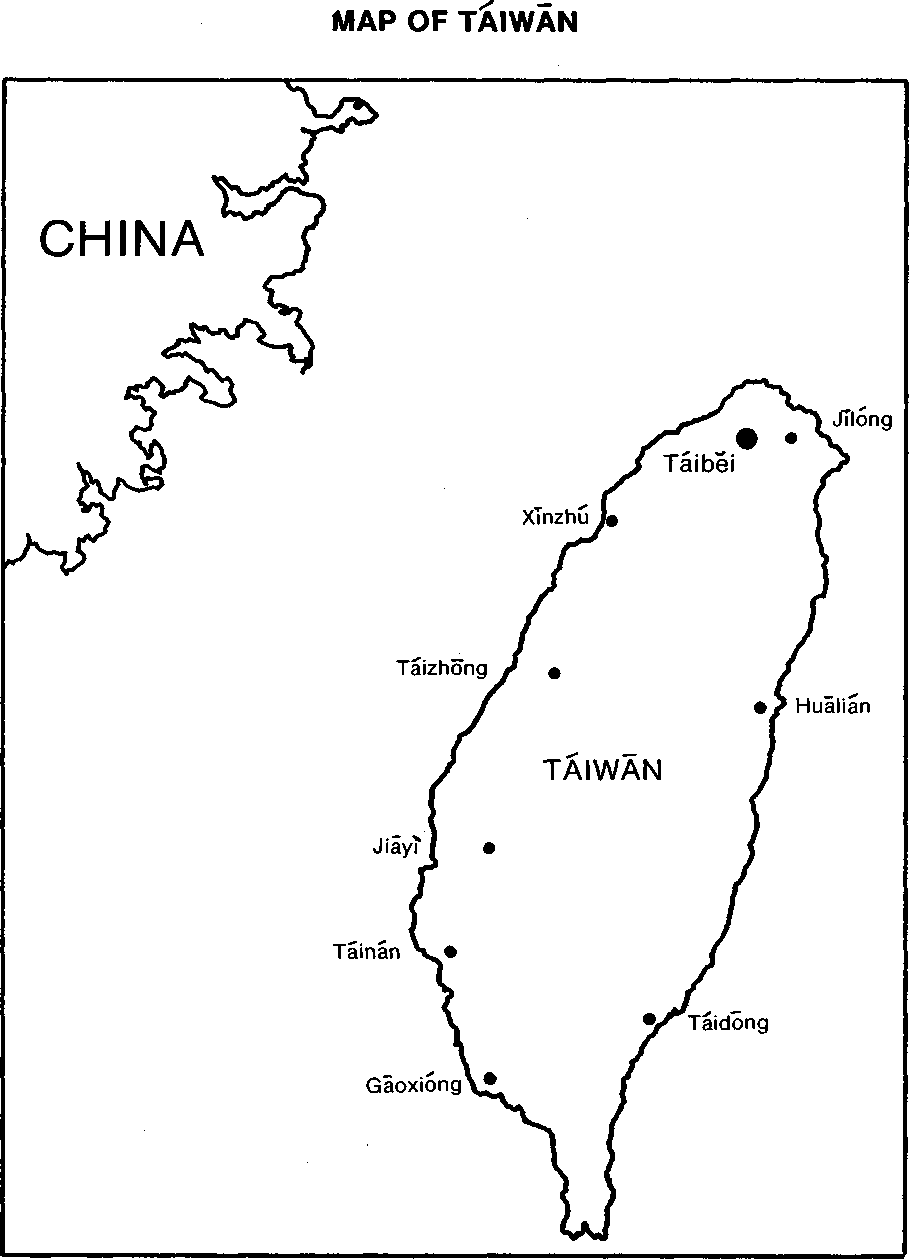
SAMPLE WORK SHEET:
Wang Dànián (Daniel King) works at the Bank of America. He has only recently arrived in Taiwan. He would like to see as much of the island as possible on this trip, even if this means not seeing very much of any one place. If possible, he would like to fit in a short visit to the Bank of America branch in Gaoxiong. He has a good salary but would prefer to stay in small Chinese-style hotels and to travel by bus. He believes that such a vacation would allow him to see more of Chinese life and more of the countryside.
CONSENSUS PLAN
STOPOVER LENGTH OF STAY REASON TRANSPORTATION
|
(Taipei) |
— |
— |
|
(Taipei) |
—--— |
— |
Zhāng Guóhuá is a junior executive at the Bank of China. He would like to mix business with pleasure on his vacation, visiting a television factory in Gaoxiong and a movie theater in Tainan in connection with their loan applications. Otherwise, he is relatively flexible, although he would like to visit the east coast for the first time. He is not particularly concerned about travel and hotel expenses. In fact, he can put business-connected expenses on his expense account.
CONSENSUS PLAN
STOPOVER LENGTH OF STAY REASON TRANSPORTATION
|
(Taipei) |
— |
—— | |
|
(Taipei) |
— |
— |
Kē Bide (Peter Cook) is a student at Taiwan University. He has had very little opportunity to travel during the six months since his arrival. He would like to take full advantage of this vacation to travel. He would particularly like to spend as much time as possible in Taizhōng and Jiayi to be able to visit the famous places near these cities. He would like to take trips across the central mountain range and along the east coast. With an adequate study grant and an intense interest in seeing what there is to see, he is not particularly concerned about travel and hotel expenses.
CONSENSUS PLAN
STOPOVER LENGTH OF STAY REASON TRANSPORTATION
|
(Taipei) |
———— |
— | |
|
(Taipei) |
—— | ||
Qian Wěidá is a Junior official in the Ministry of Foreign Affairs. During this vacation, he would, like to visit his hometown of Fangliao and an older brother who lives in Suao. In both places, he can stay with relatives at no expense—an important consideration in view of his modest salary. He can even offer to include one of his traveling companions in these arrangements, or all of them if they are willing to tolerate some inconvenience.
CONSENSUS PLAN
TRANSPORTATION
STOPOVER
LENGTH OF STAY
REASON
|
(Taipei) |
— | |
|
(Taipei) |
— |
— |
Sūn Bāngyàn is a student at Taiwan University. He would like to visit Donghai University in Taizhong to look up a friend he hasn’t seen for two years. He would also like to spend as much time as possible with his family in Taidong. On his limited budget, the economy of staying with his family is an important consideration. To the friends who are planning the vacation, it is also important that he can offer to include them in these arrangements.
CONSENSUS PLAN
STOPOVER
LENGTH OF STAY
REASON
TRANSPORTATION
(Taipei)
(Taipei)
*A: Wèi.
B: Wài. Qīngwèn, Zhāng Kēzhang zài hu zai?
A: Bú zài. Tā chūqu le. Nín shi něiwèi ?
B: Wǒ shi Lī Dàwèi.
A: Ou, LǏ Xiānsheng, hǎo jiú hú jiàn. Nín zhǎo Zhāng Kēzhǎng you shénme shi ma?
B: Wǒ you diǎnr shi xiǎng gēn ta dāngmiàn tǎntan. Bù zhīdào tā shíyīdiǎn zhōng huídelai huibulǎi.
A: Tā shi shídiǎn hàn chūqude. Yěxú shíyīdiǎn huibulǎi.
B: Nín zhīdao ta shénme shíhou you gōngfu?
A: Zhāng Kēzhǎng shàngwǔ bī xiàwǔ mǎng. Tā měitiān sìdiǎn zhōng yīhou jiù bú nàme mǎng le. Bù zhīdào zhèige shíjiān duì nín héshì bu heshi?
B: Héshì, héshì.
A: Deng yìhuǐr Zhāng Kēzhǎng huílai, wǒ gàosong ta. Nǐmen zài shénme dìfang jiàn ne?
B: Wǒ xiǎng wǒ sìdiǎn zhōng kéyi zài nín nèibianrde lōuxià huìkèshì děng ta. Xièxie nín.
A: Bú kèqi. Zàijiàn.
B: Zàijiàn.
Hello.
Hello. May I ask, is Section Chief Zhāng in?
She’s not in. She has gone out. Who is this, please?
I’m David Lee.
Oh, Mr. Lee. I haven’t seen you in a long time. Did you want to see Section Chief Zhāng about something in particular?
I have something I want to talk with her about in person. I don’t know whether she will be (able to get) back by eleven o’clock or not.
She went out at ten-thirty. She might not be (able to get) back by eleven.
Do you know when she will be free?
Section Chief Zhāng is busier in the morning than in the afternoon. Everyday after four o’clock she’s not so busy. I don’t know whether that time would suit you or not.
It’s fine.
In a little while, when Section Chief Zhāng comes back, I’ll tell her. Where will you meet?
I think I can wait for her in the downstairs reception room at your place at four o’clock. Thank you.
Don’t mention it. Good-bye.
Good-bye.
*Only the untranslated version of this conversation is on the C-1 tape. This conversation also appears as Exercise 1 of the C-2 tape.
This conversation takes place between David Lee, a Foreign Service Officer in Beijing, and an official of the Chinese government.
You will hear the conversation twice. As you listen to it for the second time, translate orally during the pauses provided on tape. Compare your translations with the suggested translations given by the speaker.
In this conversation you will again hear expressions used to arrange a meeting by telephone. Comrade Tang, an engineer presently employed as an office worker, is calling the section chief’s office to make a request.
You will hear the conversation three times. As you listen to it for the third time, answer the questions below.
Here are the words and expressions you will need in this exercise
|
huì kè |
(to receive guests) |
|
gōngchǎng xuéxí |
(factory) (to learn (PRCl) |
|
you yòng huídelái |
(to be useful) (to be able to get back) |
QUESTIONS
1. Is the person free to talk with Mr. Tang? ( ) Yes ( ) No
2. Where is Section Chief Hu? _________________________________________
3. How long has he been there? _________________________________________
U. Will Section Chief Hu be back by eleven o’clock?
5. When will Tang try to get in touch with Section Chief Hu again?
This exercise consists of two short telephone conversations between an American businessman, Mr. John Henderson, and two Chinese cadres of the Foreign Trade Ministry in Beijīng.
You will hear the conversations three times. Answer the questions below as you listen for the third time.
Here are three expressions you will need for this exercise:
|
Wàimàobù |
Eabbreviation for Foreign Trade Ministry, PRC3 |
|
chūkǒu gōngsī |
(export company) |
|
Nī zhao shéi shuō huà? |
(Whom do you want to speak with? Cliterally, "Whom are you looking for to speak with?3) |
QUESTIONS
1. Whom does Mr. Henderson want to speak with?
2. On what day does Mr. Henderson want to set up the meeting?
3. What time of day is best for the cadre?
4. Will the cadre be back by the hour which Mr. Henderson suggests?
( ) Yes ( ) No
This is a telephone conversation about arranging the time and place of a meeting. Mary Gardner works for an American import-export company in Taiwan. She is calling a Chinese official who deals with trade matters.
You will hear the conversation three times. Answer the questions below as you listen for the third time.
Here are two words you will need for this exercise: xiē (several, some)
bàngōngshì (office)
QUESTIONS
1. What is the full name of the man whom Miss Gāo is calling?
2. What is Miss Gāo doing next month?
3. When is Miss Gāo free to see the section chief?
4. What time is best for the section chief?
5. Who does Miss Gāo say is busier?
6. At what time does Miss Gāo say she will come?
In this exercise you will take part in ten telephone conversations. You will try to arrange suitable times to meet with the people you talk with. Each meeting will last less than one hour.
Information from your appointment schedule is given in Display I. The shaded areas indicate times already taken in your schedule. The blank areas show times which you still have free. Use this information to negotiate meeting times. (Numbers to the left of the schedules refer to the conversations in which particular schedules are to be used.)
Example
TAPE: Wǒ you diǎnr shì xiǎng gen nín dāngmiàn tantan. Bu zhīdao nín you gōngfu meiyou.
YOU: You gōngfù.
TAPE: Shénme shíhou duì nín héshì?
YOU: Míngtiān, hòutiān dōu kéyi.
TAPE: Míngtiān shàngwǔ shídiǎn zhōng fāngbian ma?
YOU: Jiǔdiǎn bī shídiǎn fāngbian yìdiǎnr.
TAPE: Hǎo. Jiǔdiǎn jiàn.
DISPLAY I
9:00 10:00 11:00 12:00 1:00 2:00 3:00 4:00
|
Tomorrow | ||||||||
|
Lay After Tomorrow |
■ |
■ |
9:00 10:00 11:00 12:00 1:00 2:00 3:00 4:00
|
This Tuesday |
ìííiBíi^ | |||||||
|
This Wednesday |
9:00 10:00 11:00 12:00 1:00 2:00 3:00 4:00
|
Today |
■ |
goo | ||||||
|
Tomorrow |
|||p| |
9:00 10:00 11:00 12:00 1:00 2:00 3:00 4:00
|
Next Monday | ||||||||
|
Next Tuesday |
This exercise gives you practice in making comparisons.
Display II shows information about some of the large cities in China: area, population, and distance from Běijīng. Use this information to answer the questions on tape.
Negative sentences in which two things are compared have not yet been introduced in this course. However, to correct information given by the speaker on tape, you can change the order in which the things being compared are mentioned. Mention first the thing which is of greater degree.
Example
TAPE: Beijing bi Tianjin dà ma?
YOU: Shi, Beijing bǐ Tianjin dà.
TAPE: Běijīngde rénkǒu bi Tiānjīnde rénkǒu duō ma?
YOU: Shi, Běijīngde rénkǒu bi Tiānjīnde rénkǒu duō.
TAPE: Běijīngde rénkǒu bi Shànghǎide rénkǒu duō ma?
YOU: Bù, Shànghǎide rénkǒu bi Běijīngde rénkǒu duō.
For this exercise you will need the word rénkǒu, "population."
DISPLAY II
AREA POPULATION DISTANCE
(sq km) (rénkǒu) FROM BĚIJĪNG
|
17,800 |
7,500,000 | |
|
11,000 |
6,280,000 |
96 km |
|
5,800 |
10,820,000 |
1,470 km |
|
i,Uoo,ooo |
1,220 km | |
|
2,000,000 |
1,180 km | |
|
2,150,000 |
2,160 km |
In this exercise you will act as an interpreter.
You will hear a telephone conversation between a representative of the American government who is assigned to Beijīng and a Chinese acquaintance. Then you will hear the conversation as if the American cannot speak Chinese and the acquaintance cannot speak English. Each speaker’s lines will be followed by a pause, during which you will translate.
Example
CHINESE: Wei.
YOU: Hello.
AMERICAN: Is this Section Chief Fang?
YOU: Wei, shi Fang Kēzhǎng ma?
CHINESE: Shì a, nǐ shi něiwèi?
YOU: Yes. Who is this?
For this exercise you will need the word huídelái, ”to be able to get back in time."
You will probably come up with some translations which differ from the suggested translations on tape. The suggested translations are generally close to translations in the Reference List, but your versions may also be correct.
INSTRUCTIONS:
Type: When and Where?
Situation: You are telephoning a business acquaintance to make an appointment for the following day. Both of you already have several appointments for that day in different parts of the downtown area of a city in Taiwan.
Goal: To agree on a time and place for your meeting that will allow you as much time together as possible.
Number of Players: Groups of four students.
Materials: A work sheet for each player. (See Sample Work Sheets, on the following pages.) Your name and the names of the three other people in your group are given at the top of your work sheet.
On each work sheet is a partially labeled map of the downtown area. Each player knows certain places not known to his acquaintances. Each player’s work sheet also includes that person’s schedule for the following day.
Procedure: Before starting, the four players in a group should introduce themselves to each other, so that players can ask for others by their names
Talk to each player in your group. Either player in a pair may take the initiative and play the caller.
When it is more convenient, a meeting may be arranged at a coffeehouse, restaurant, or hotel rather than at your office or the other person’s office. If the meeting place is not known to the other person, you may either describe its location or arrange to meet first at a place that is known to him.
Example: You are Speaker 1.
SI: Wài! Shi Mǎ Yìmíng, Mǎ Xiānsheng ma?
S2: Shi a. Nín guìxìng?
SI: Wǒ xing Zhōu. Wǒ jiao Zhōu Shìkǎi.
S2: Ou, Zhōu Xiānsheng, hǎo jiǔ mei jiàn. Nín hǎo?
SI: Wǒ you diǎn shi xiǎng gēn nín dāngmiàn tǎntan. Nín míngtiǎn xiàwǔ you shíjiān ma?
S2: Xiàwǔ shénme shíhou a?
SI: Xiàwǔ sāndiǎn zhōng zěnmeyàng?
S2: Duìbuqǐ, xiàwǔ sāndiǎn zhōng wǒ yào dào Měiguo Yínhǎng qu, sìdiǎn zhōng děi huí bàngōngshì qu. Shàngwǔ shídiǎn ban yǐhōu duì nín héshì ma?
SI: Duìbuqí, wǒ shàngwǔ you shìqing. Women zhōngwǔ zhǎo yíge dìfang jiàn hǎo bu hǎo?
S2: Hǎo. Nǐde bàngōngshì zài nǎli?
SI: Jiù zài Meiguo Yínhǎng fùjìn.
S2: ōu, zhè duì wo hen fāngbian. Nà women kéyi zài Nanjing Jiǔjiā jiàn.
SI: Hǎojíle. Míngtiān jiàn.
Practice Points: Everything in the unit.
SAMPLE WORK SHEET:
Zhōu Shìkǎi (OTHERS: Mǎ Yìmíng, Qian Wěidǎ, Zhū Yìzhāng)



Bank of Taiwan
Shanghai
3 Jiìíjiā



1. OFFICE: 9:30-10:00 (appointment with Mr. Feng)
2. BANK OF TAIWAN: 10:30-11:30
3. OFFICE: 2:00-2:30 (meeting)
U. MILITARY ATTACHE’S OFFICE: 5=00-5:30
Wang Guóān
(OTHERS: Lǐ Zhìpíng, Huang Bǎoyí, Xu Shàohuá)


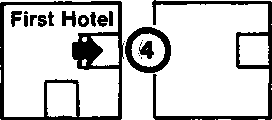
Train Station

Huāměi □ s Coffeehouse



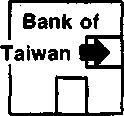

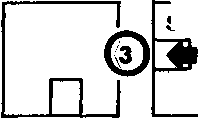
Shanghai



USICA
Xīmén Coffeehouse




Bank of America


1. OFFICE: 9-'00-10:00 (appointment with Mr. Zhōu)
2. USICA: 12:30-1:00
3. SHANGHAI JIUJIĀ: 1:30-2:30 (lunch with Mr. Zhāng)
U. FIRST HOTEL: 3:00-6:00 (appointment with Mr. Zhào)
Lǐ Zhìpíng (OTHERS: Huang Bǎoyí, Xu Shàohuá, Wang Guóān)




USICA


Dàhuá

Bank of America
Nanjing

Jiǔjiā
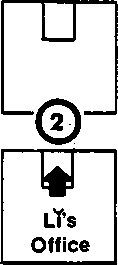
1. BANK OF AMERICA: 9:00-9:30
2. OFFICE: 11:00-1:00 (meeting)
3. MILITARY ATTACHE’S OFFICE: 2:00-3:00
it. TRAIN STATION: 5:30 (train to Taipei)
lUO
Huang Bǎoyí (OTHERS: Xu Shàohuá, Wang Guóān, Lǐ Zhìpíng)
Huang’s Office

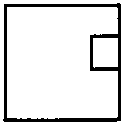

Train Station


I Bank of Taiwan

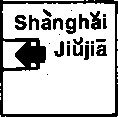

"O’
XTmén
Coffeehouse




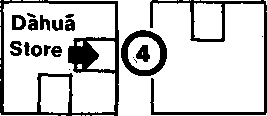


Bank of America

1. OFFICE: 10:00-12:00 (meeting)
2. USICA: 2:30-3:00
3. BANK OF AMERICA: 3:15-3:H5
H. DÀHUÁ STORE: U:00-5:30 (shopping with wife)
Xú Shàohuá (OTHERS: Wang Guóān, Lǐ Zhìpíng, Huang Bǎoyí)

Huáměi

Coffeehouse


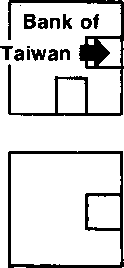

Xu’s Office
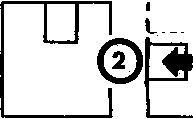
<-o®
U.S. Military i
Attache’s Office I

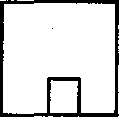

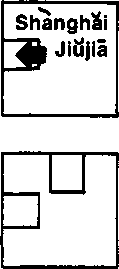

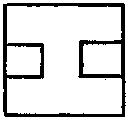
Dàhuá

V
USICA

“8“
Bank of America
Nanjing
Jiǔjiā
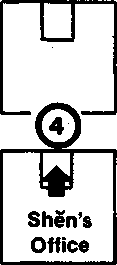
1. OFFICE: 9:00-11:00 (meeting)
2. MILITARY ATTACHE’S OFFICE: 12:00-1:00
3. OFFICE: 2:30-3:30 (appointment with Mr. Guō)
U. MR. SHEN'S OFFICE: U:15-5=15
*A: Wei.
B: Qǐng Zhou Kēzhǎng jiǎng huà.
A: Nín guìxìng?
B: Wǒ shi Jiānǎdà Dàshiguǎnde Qiǎozhì Díēn.
A: Ou! Zhōu Kēzhǎng xiànzài bú zài zhèibianr gōngzuò le. Tā xiànzài zài Měidàsī. Qǐng nǐ wàng Meidàsī dǎ diànhuà ba.
B: Duìbuqǐ, mǎfan ni le.
A: Měi guānxi.
(LATER)
B: Wài, shi Měidàsī ma?
A: Shi.
B: Wǒ yào zhǎo Zhōu Kēzhǎng shuō huà.
A: Zhōu Kēzhǎng zài jiē diànhuà. Qǐng děng yíxià.
Section Chief Zhōu finishes her phone to talk to Mr. Dean.
C: Wei.
B: Zhōu Kēzhǎng ma?
C: Shi, nín něiwèi?
B: Wǒ shi Qiǎozhì Díēn. Hǎo jiǔ mei jiàn. Zěnmeyàng?
Hello.
Please ask Section Chief Zhōu to come to the phone.
What is your name?
I am George Dean from the Canadian Embassy.
Ah! Section Chief Zhōu doesn’t work here anymore. She is at the Department of American and Oceanic Affairs now. Please call the Department of American and Oceanic Affairs.
I am sorry to have bothered you.
It doesn’t matter.
Hello. Is this the Department of American and Oceanic Affairs?
Yes.
I want to speak to Section Chief Zhōu.
Section Chief Zhōu is on the phone. Please wait a moment.
’ call. Then she picks up the
Hello.
Is this Section Chief Zhōu?
Yes. Who is this, please?
I am George Dean. I haven’t seen you for a long time. How are things going?
*Only the untranslated versions of these conversations are on the C-1 tape. The conversations also appear as Exercise 1 on the C-2 tape.
C: Mang yìdiǎnr. Nín hǎo ba!
B: Hǎo. Xièxie. Wǒ gěi nín dǎ diànhuàde mùdi shi wǒ you diǎnr shi yào gēn nín dāng-miàn tántan. Bù zhīdào míngtiān shénme shíhou duì nín héshì.
G: Míngtiān shàngwù wǒ děi kāi hui. Xiàwù zěnmeyàng?
B: Hǎo, xiàwù shénme shíhou dōu kéyi.
C: Name, sāndiǎn zhōng qǐng nín dào wo zhèr lai, xíng bu xíng?
B: Xíng. Sāndiǎn zhōng zài nín nàr Jiàn.
I’m a little busy. How are you?
Fine, thanks. The reason I called you is that I have something I would like to talk with you about in person. I don’t know what time tomorrow would suit you.
Tomorrow morning I have to attend a meeting. How about afternoon?
Fine. Anytime in the afternoon would be fine.
Well then, please come over here at three o’clock. All right?
All right. I will meet you at your place at three o’clock.
In this exercise George Dean of the Canadian Embassy (in Beijing) is making a series of phone calls to locate Section Chief Zhōu.
You will hear the conversations twice. As you listen to them for the second time, translate orally during the pauses on tape. Compare your translations with the suggested translations given by the speaker.
You will hear the expression zài jiē diànhuà, "to be receiving a phone call," "to be on the phone," in the conversations. You will also learn a new way to ask to speak with someone:
|
Qǐng |
Zhōu Kezhǎng |
jiǎng huà. |
|
(Ask |
Section Chief Zhōu |
to speak.) |
(Please ask Section Chief Zhōu to come to the phone.)
In this exercise you will hear the vocabulary of this unit in a new context. The conversation takes place in the PRC between two friends who work in the same office building.
You will hear the conversation three times. Answer the questions on the next page as you listen for the third time.
Here are the expressions you will hear in this conversation:
|
hòulài |
(later) |
|
yàojIn |
(to be urgent/important) |
|
jiéhūn |
(to get married) |
|
he chá |
(to drink tea) |
|
chi |
(to eat) |
|
rènshi |
(to be acquainted with) |
|
tóngyì |
(to agree) |
You may find, one long sentence in this conversation rather difficult to follow:
Wǒ zhǎo nīde mùdi shi wen ni,
(The reason I was looking for you_____was to ask you,
Xīngqītiān Xiǎo Hu jiéhūn, as for Xiǎo Hu’s getting married this Sunday, tā qǐng zānmen he chā chī tang, as for her inviting us to drink tea and eat candy, ni qù bu qu?
are you going or not?)
The two clauses directly preceding the final nǐ qù bu qu are TOPICS, providing information needed to understand the final question portion of the sentence.
QUESTIONS
1. What was Cheng doing at two o’clock?
2. What did he talk to Section Chief Wang about? .
3. Whom is Hu marrying? _________________________________________________
1. How long have they known each other?
5. Did Hu want to get married when she was 23 years old?
( ) Yes ( ) No
6. Where did Huang Han work in England?
7. When did he get back? ________________________________________________
8. At what time did Hu say they should get to her house?
This exercise includes expressions which a visitor is likely to hear on a visit to China. The three short conversations take place in the PRC between an American scholar, Mr. George Smith, and his Chinese guide Comrade Mǎ Lian.
Listen to the conversations twice. As you listen to them for the third time, translate orally during the pauses provided on tape. Compare your translations with the suggested translations given by the speaker.
Here are nine expressions you will hear:
|
Zhōngguo Luxíngshè |
(China Travel Agency) |
|
cānguān |
(to visit) |
|
Rénmín Gōngshè |
(People’s Commune) |
|
nóngmín |
(peasant) |
|
shēnghuó |
(life) |
|
dàxuéshēng |
(college student) |
|
làodòng |
(to do manual labor) |
|
ānpǎi |
(to arrange, to settle) |
|
Hóngqí |
Cname of a commune (literally, "Red Flag")J |
This exercise will give you practice with expressions used in deciding on the time and place for a meeting.
In this conversation, Miss Tyler is telephoning to ask for information from the Intelligence Department of the Ministry of Foreign Affairs.
You will hear the conversation three times. Answer the questions on the next page as you listen for the third time.
Here are some expressions you will hear in this conversation:
Qíngbàosī (intelligence Bureau Epart of the
Ministry of Foreign Affairs, PRC1)
Guójì Jiāoliú Zongshǔ (U.S. International Communications
Agency)*
♦formerly called Měiguo Xínwěnchù, ’’U.S. Information Agency”
diànhuà hàomǎ (telephone number)
dating (to inquire about)
Auxiliary verbs are STATE verbs. Therefore, to make the description of a completed action negative, you would expect to use bù with an auxiliary verb. Néng, however, may be used with mei as well as with bù:
Mei néng gēn ni shuō huà. (I wasn’t able to talk with you.)
QUESTIONS
1. Where is Department Chief Chen? _____________________________________
2. When might he return? ___________.______________________________________
3. Does Department Chief Chen know Miss Tyler's phone number? ( ) Yes ( ) No
U. According to Department Chief Chen, what time would be most convenient for him? ( ) morning ( ) afternoon ( ) anytime
5. Where do Miss Tyler and Department Chief Chen plan to meet?
In this exercise you. will practice translating from English into Chinese. The sentences include the words for "any,” "none," "all," and "some."*
First, you will hear an English sentence. Translate it into Chinese. Then compare your translation with the suggested translation given by the speaker.
Example
TAPE: Anyone can read a newspaper.
YOU: Shéi dōu néng kàn bào.
TAPE: Shéi dōu néng kàn bào.
You may wish to go through this exercise more than once. Practice the sentences until you have mastered them.
In this exercise you will take part in five conversations. You will answer questions in terms of "all," "some," "none," and "any."
In each conversation you will talk with someone who asks your opinion or advice from time to time. Display I indicates how you should respond to the questions. Use this information to form complete responses.
Example (in Conversation 1 you are George Duffy, who is assigned to the Canadian Embassy in Beijing. You are talking with a Chinese staff member.)
TAPE: Qiǎozhì Dáfēi, wo zhīdao nǐmen hǎo jiǔ méi qù kàn diànyīng le. Xiànzài you yige diànyīng, hen hǎo, Nī yào bu yao wǒ gěi nǐmen mǎi diànyīng piào?
YOU: Hǎo.
TAPE: Nǐ àiren hé hǎizi yě qù ma?
YOU: Shì, women dōu qù.
♦Before beginning this exercise, read Unit 2 text, Reference Notes on No. 6.
DISPLAY I
|
QUESTIONS 1 2 3 U \ 5 | |||||
|
CONVERSATION 1 CONVERSATION 2 CONVERSATION 3 CONVERSATION U CONVERSATION 5 |
good |
all |
any day |
anywhere | |
|
yes |
not all |
any day |
anytime | ||
|
good |
all |
anyone |
anytime | ||
|
not all |
not all |
good |
anytime |
either | |
|
all |
don’t all like beer |
anytime | |||
In this conversation you will act as an interpreter. A Canadian government representative (assigned to Běijīng) is telephoning a member of the Chinese government.
First, you will hear the conversation without interruptions. Then it will be presented as if the Canadian cannot speak Chinese and the FRC government official cannot speak English. Each speaker’s lines will be followed by a pause, during which you will translate.
Example
CHINESE: Wài, Měi dàs ī•
YOU: Hello. Department of American and Oceanic Affairs.
AMERICAN: I am Katherine Martin of the Canadian Embassy. I have something I wish to discuss with Department Chief LÍ.
YOU: Wǒ shi Jiānádà Dàshiguǎnde Kǎilán Mǎdīng. Wǒ you yíjiàn
shi xīwang gēn Lí Sīzhǎng jiǎngyijiǎng.
You will need to know the expression dù jià, ”to spend one’s vacation.’’
Although some of your translations may differ from the suggestions on tape, your versions may also be correct. If you are not sure about a particular sentence, jot it down and ask your instructor about it.
INSTRUCTIONS:
Type: When and. Where? (This game is similar to the Unit 1 Communication Game.)
Situation: You are telephoning three acquaintances in Beijing to make business appointments for the following day. You start with an open schedule for that day, but the time set for an appointment with one acquaintance will no longer be available for others. Each meeting will be either at your office or at the other person’s office.
Goal: To make appointments with the three people.
Number of Players: Groups of four students.
Materials: A work sheet for each player. (See Sample Work Sheets, on the following pages.) Your work sheet is a map of Běijīng bus routes. It also indicates (in italics) your name, the place where you work, and the name and location of the bus stop nearest your office. The names of your acquaintances are also included.
Procedure: Before starting the game, you and the other players in your group introduce yourselves. Then begin the phone calls.
For each conversation, one player places the call. The other player receives the call, first in the role of his secretary (either putting the call through or giving a reason for asking the caller to telephone later and suggesting a time). Then the player who receives the call answers the phone as himself, the acquaintance.
When the caller talks with his acquaintance (either right away or after calling back), he negotiates a time and place for the next day’s meeting.
Travel time to and from appointments is to be calculated on the basis of five minutes per bus stop.
Example: You are Speaker 1.
SI: Wài.’ Shi Qian Tongzhì ma?
S2: Shi a. Nín guìxìng?
SI: Wo xing Xú, wǒ jiào Xu Dàlōng.
S2: Ou, Xú Tongzhì, nǐ hǎo?
SI: Wǒ you yíjiàn shi yào gēn ni dāngmiàn jiǎngyijiǎng. Nǐ míngtiān xiàwù you gōngfu ma?
S2: Duìbuqī. Wǒ míngtiān xiàwù you shi. Shàngwu duì ni héshì ma?
SI: Hǎo. Nǐ jǐdiǎn zhōng shàng bān?
S2: Wǒ bādiǎn zhōng shàng bān.
SI: Nà wǒ jiǔdiǎn zhōng lai jiàn ni, hǎo bu hǎo?
S2: Hǎo. Nǐ zhīdao wǒ shàngbānde dìfang zài nǎr ma?
SI: Wǒ bù zhīdào.
S2: Zài Běi Chízi.
SI:
S2:
SI:
S2:
SI:
S2:
Wǒ zuò jīlù chē?
Nǐ bàngōngshì zài nǎr?
Zài Chong Wen Men fùjìnde Huāshì Dàjiē.
Nī zuò Sānlù chē. Guòle Dōnghuáměn dìèr zhàn jiù shi Bei Chízi.
Hǎo. Xièxie ni. Míngtiān Jiàn.
Míngtiān jiàn.
Practice Points: Everything in the unit.
SAMPLE WORK SHEET:
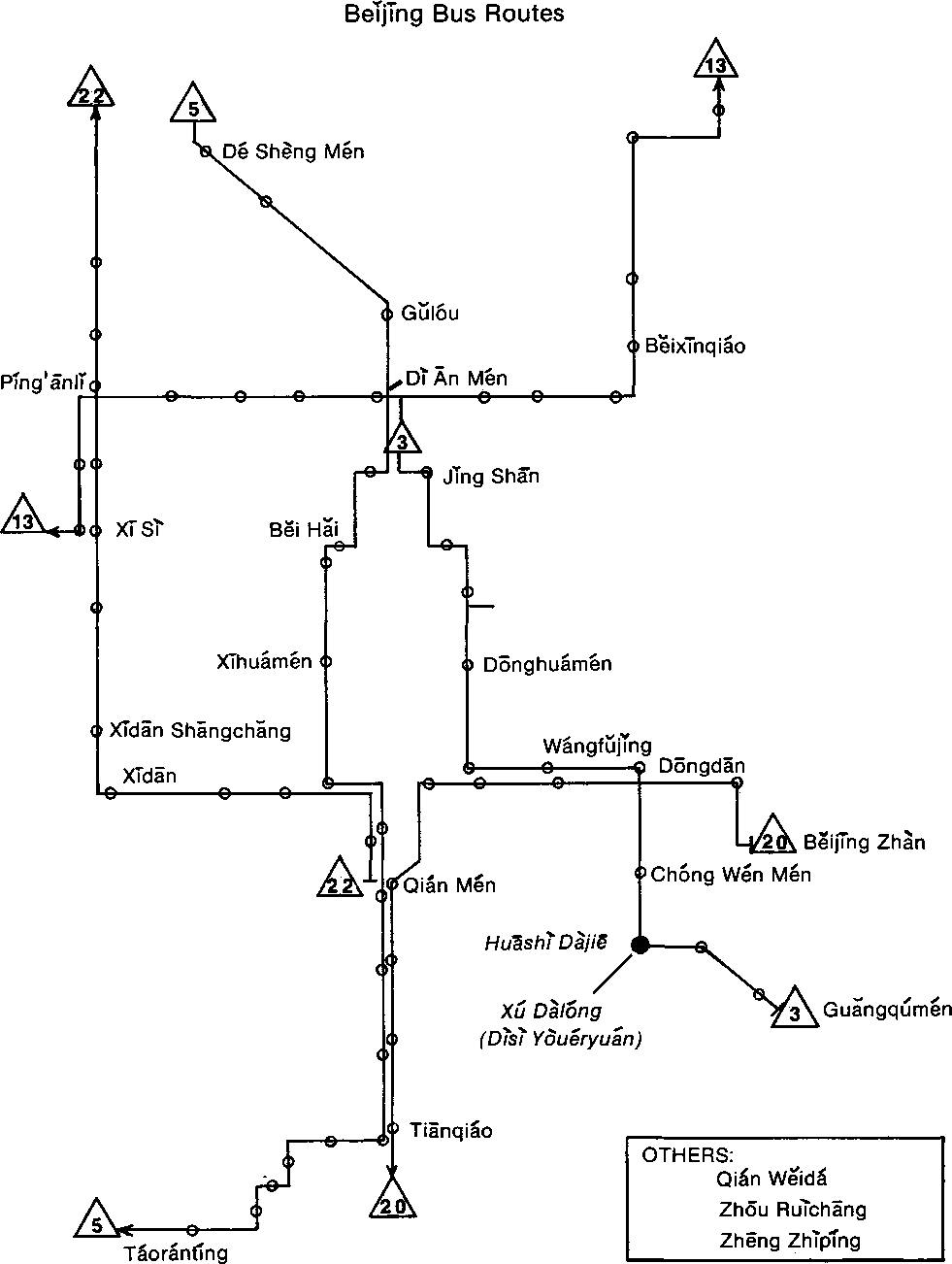
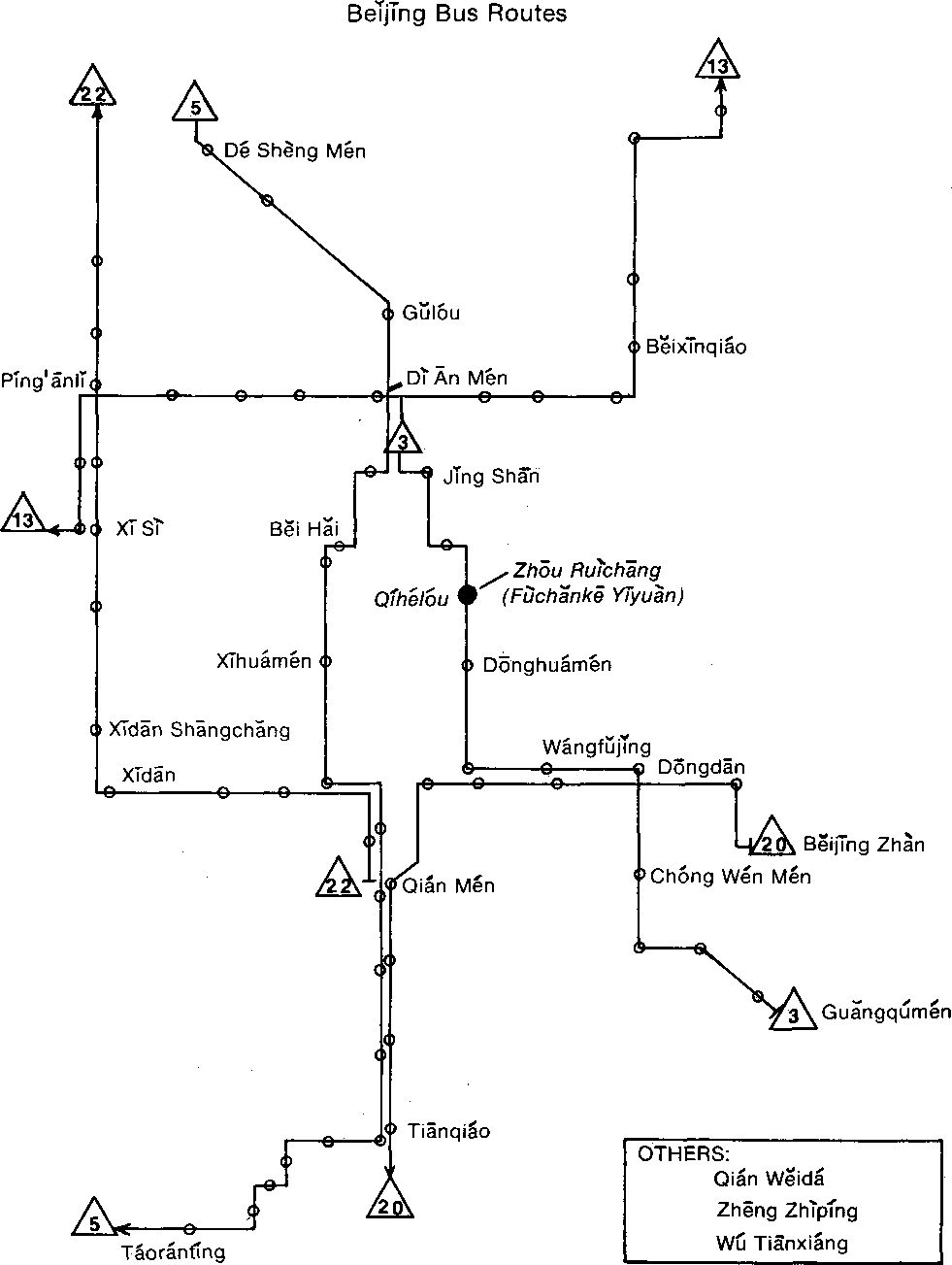
BeíjTng Bus Routes

Ì3'
<>
De Sheng Men
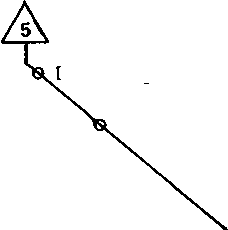
(»
Píng'ānlīo
■e-----e----&
<)<•
13\< 4>o xrsr
Běi Hai
re-
<>
XThuámén
<>
ò Gǔlóu
■e-
■&
<» XTdan Shāngchǎng
XTdan e-------e---e
è-
o
<>
(i
<p
< > BeixTnqiáo
Youyí Yīyuàn
D? Ān Mén —----e--&
v
Jing Shan
■e
<> Dōnghuámén
®-----G-
■e—
Qián Mén

<P Tiānqiáo
*7 7^ Qián Weidá Taorantmg (ySuy{
WángfǔjTng
■o Dōngdān
L-|/2(a BeijTng Zhàn
<>Chóng Wen Men

3\ Guǎngqumén
OTHERS:
Zhōu Ruìchāng Zheng Zhìpíng W(j Tiānxìáng
BeijTng Bus Routes
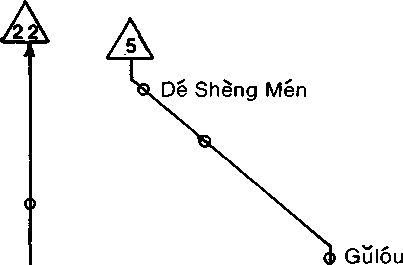
4^ A
o
<?-------------
o
O BeixTnqiáo
Píng'ānlǐo
■&------e-----e-
■e-
DÌ Ān Men -----e---e
■e
(to
-e-
v
—9 Jing Shan
Bei Hai r-e-o
<>
XThuámén
<>
<) Donghuámén
O XTdan Shāngchǎng
XTdan «—-----e---0
©■

®--e---------1
■o o—-0——
Zheng ZhìpTng (BeijTng YTyuan)
WángfǔjTng
Dōngdān
Qian Mén
«-|/2(a BeijTng Zhàn o Chong Wen Men

4>o Tiānqiáo

Táoránfíng

OTHERS:
Qian Wěidá
Wu Tiānxiang
Zhōu Ruìchāng
Beijīng Bus Routes

<>
(i
Píng'ānlT(i
<><>

Guǒzíshì'
De Shèng Men Tiānxiáng (Wèishēngbù)

■e—---e----&
Bēi Hai r& o
<>
XThuámén
<b Gulóu
<> BěixTnqiáo
■e-
■e-
O XTdan Shāngchǎng
XTdan e-------e---&
0°
Dì An Men ----s--&
v
Jing Shan
<> Dōnghuámén
®-----e-
e---e—----©■
Qián Men
<--e—
Táoránfíng

■e
Tiānqiáo
Wángfujing
■q Dōngdān -----Q
Ll/z Ò\ Beijīng Zhàn
<>Chóng Wen Mén

3\ Guǎngqúmén
OTHERS:
Qian Weidá Zhōu Ruìchāng
Zheng Zhìpíng
*A: Shǐ Mìsī Xiǎojiě, wǒ gěi ni jièshao yíwèi péngyou. Zhè-wèi shi Yang Jiàoshòu, zài Taiwan Dàxué jiāo zhèngzhixué. Zhèwèi shi Shǐ Mìsī Xiǎojiě.
B: Yang Jiàoshòu, nín hǎo.
C: Shǐ Mìsī Xiǎojiě hǎo. Nín hui shuō Zhōngwén!
B: Wǒ xǐhuan shuō, kěshi shuōde bù hǎo.
C: Bu kěqi. Nín xuěle jǐniǎn Zhōngwén?
B: Jiù xuele yìniǎn; hěn shǎo shuō.
C: Zhōngguo rén shuō huà, nín dōu tīngdedǒng ba?
B: Yǒude tīngdedǒng, yǒude tīng-budǒng. Wǒ hái xiǎng zài xué yìdiǎn.
C: Wǒ xiǎng zài zhèli zhùle yìliǎng nián yǐhòu, nínde Zhōngguo huà búdàn dōu tīngdedǒng, yě jiù shuōde gēn Zhōngguo rén yíyàng hǎo le.
B: Nín tài kèqi. Wo xiànzài méiyou duōshao Zhōngguo péngyou. Xīwàng yǐhòu Zhōngguo péngyou duō le, shuōde jīhui yě duō le, jiù hǎo yìdiǎn le.
C: Shìde.
Miss Smith, let me introduce a friend to you. This is professor Yang, who teaches political science at Taiwan University. This is Miss Smith.
How are you, Professor Yang?
How are-you, Miss Smith? You can speak Chinese!
I like to speak, but I don’t speak well.
Don’t be so modest. How many years have you studied Chinese?
I have studied for only one year; I speak very little.
When Chinese people speak, you can understand it all, I imagine.
Some I can understand, and some I can’t. I still want to study a little more.
I think that after you have lived here a year or two not only will you be able to understand any Chinese you hear but you will also speak as well as a Chinese person.
You are too flattering. I don’t have many Chinese friends now. I hope that later, when I have more Chinese friends and when I also have more opportunity to speak, my Chinese will get a little better.
That’s right.
*Only the untranslated version of this conversation is on the C-1 tape. The conversation also appears as Exercise 1 on the C-2 tape.
C: E..., xià Xīngqīliù wǎnshang wǒ qǐngle jīge péngyou zài jiāli chi biànfàn. Xīwàng nǐ néng lai.
B: Nà tài kèqi. Búguò, wǒde Zhōngwén shuōde bù hǎo. Kongpà nǐmen wǎnde mei yìsi.
C: Hebì kèqi. Wǒ mei qǐng shénme rén. Zhèxiē péngyou hen suí-biàn. Nín jiù lai ba! Wǒ zhù zai Dàlǐ Jiē Wǔshièr hào.
B: Hǎo, xièxie nín. Qīngwèn, xià Xīngqīliù wǎnshang jīdiǎn zhōng?
C: Qīdiǎn zhōng.
Uh..., Saturday of next week I have invited a few friends to have a simple meal at my house. I hope that you will be able to come.
That’s too kind of you. But. I don’t speak Chinese well. I'm afraid that the party wouldn’t be interesting for you and your friends.
Why is it necessary to be so polite? I haven’t invited anyone special. These friends are very informal.
Why don't you come! I live at 52 Dàlǐ Street.
All right, thank you. May I ask, on Saturday of next week at what time in the evening is it Ithe party1?
Seven o’clock.
In Taipei, Rebecca Smith has been invited to the home of her friend Mrs. Zhǎo, who has also invited another guest. You will hear the conversation twice. As you listen to it for the second time, translate orally during the pauses provided on tape. Compare your translations with the suggested translations given by the speaker.
In this exercise you will hear questions in extending and accepting invitations. The Taipei between two Chinese women, Miss Wú and
You will hear the conversation twice. As second time, answer the questions
Here are expressions you will yuéhǎo (le) chi fan zhèng hǎo méiwèntí hǎode duō
QUESTIONS
and answers typically used conversation takes place in
Miss Tang, who work together
you listen to it for the
below.
hear in the conversation:
(to have made an appointment with)
(to eat, to have a meal)
(just right)
(there’s no problem)
(much better)
1. What day of the week is it?
2. Where does Miss Wú invite her friend to
3. Miss Tang wants to introduce Miss Wú to
Has Miss Wú spoken English recently? (
5. Miss Tang says that she
( ) doesn’t speak English well.
( ) can’t speak English well.
go? ________________________
what person? ______________
) Yes ( ) No
This conversation takes place between a Canadian woman and a Japanese businessman who became acquainted while staying at the same hotel in Beijīng. You will hear the conversation twice. As you listen to it for the second time, answer the questions below.
Here are ten expressions you will Wǔyī Laodòngjié
cānj iā yóuyuánhuì Yihéyuán Tiān An Mén yānhuo jiāo shū chī fan kěxī hē chá
hear in this conversation:
(May Day, Labor Day Cliterally, "May the first, Labor Day"!)
(to attend)
(carnival) (Summer Palace) Cliterally, "Gate of Heavenly Peace"! (fireworks display) (to teach) (to eat, to have a meal) (what a pity) (to drink tea)
QUESTIONS
1. The Japanese businessman has
( ) an invitation to a carnival.
( ) tickets to a carnival.
( ) an appointment for a meeting.
2. Can the Canadian woman go to the fireworks display? ( ) Yes ( ) No
3. Why or why not? __
U. What and when did she hear about the fireworks display on Chinese Labor Day? _________________________________________________________
In Taipei, Mr. Stewart is making a phone call to the office of someone with whom he does business. You will hear the conversation twice. Answer the questions below as you listen for the second time.
You will hear the expressions
ting diànhuà da (ge) diànhuà yídìng zāogāo mei bànfa
(to answer the phone) (to make a phone call) (definitely)
(what a mess; oh, no) (there is no way to)
QUESTIONS
1. Where is Section Chief Wang? _________________________________________
2. What time is it now? _________________________________________________
3. What time is Mr. Stewart told to call back?
H. What is Mr. Stewart’s home phone number?
In this exercise you will compare things which are different as well as stating that some things are alike.
The four charts in Display I give information to be used in comparing various things: Chart 1—the grades of three students; Chart 2—the volume of book and map sales in three Taipei stores; Chart 3—the average unit price of television sets and electic fans in three Taipei stores; Chart U—the distances of four cities from Taipei. Use this information to answer the questions on tape.
Example
TAPE: Wang Huìmín, Lǐ Měiyīn, shéi xué Riwén, xuéde hǎo?
YOU: Wang Huìmín xué Riwén bǐ Lī Měiyīn xuéde hǎo.
TAPE: Lī Meiyīn, Zhāng Xiǎoqiān, shéi xué Riwén, xuéde hǎo?
YOU: Zhāng Xiǎoqiān xué Riwén bī Lī Měiyīn xuéde hǎo.
TAPE: Wang Huìmín, Zhāng Xiǎoqiān, shéi xué Riwén, xuéde hǎo?
YOU: Wang Huìmín xué Riwén gēn Zhāng xiǎoqiān xuéde yíyàng hǎo.
When you use manner adverbs to describe how someone does something (including comparisons), mention the activity first; then describe it with the adverb.
DISPLAY I
|
JAPANESE |
ECONOMICS | |
|
Wang Huìmín |
A- |
B |
|
1. Lǐ Měiyīn |
C |
A |
|
Zhāng Xiǎoqiān |
A- |
A |
BOOK SALES MAP SALES
|
Dìyī Gōngsī |
2500/mo. |
600/mo. |
|
Jīnrì Gōngsī |
2500/mo. |
250/mo. |
|
Dōngfāng Shūdiàn |
3400/mo. |
600/mo. |
PRICE OF A TV PRICE OF AN ELECTRIC FAN
|
Dìyī Gōngsī |
NT$380016 |
NT$950 |
|
Jīnrì Gōngsī |
NT$4500 |
NT$780 |
|
Yuǎndōng Gōngsī |
NT$4500 |
NT$780 |
DISTANCE FROM TAIPEI
|
Hualian |
105 km |
|
Taizhōng |
140 km |
|
Taidong |
280 km |
|
Tainan |
280 km |
In this exercise you will take the part of a travel agent in Hong Kong and give information about various flights in China.
Display II shows the timetables for four flight routes. Use this information to answer the questions on tape. Whenever possible, use the búdàn...yě... construction to give a customer the needed information.
Example
TAPE: Cong Beijing dào Guangzhou zǎoshang you fēijī ma?
YOU: Búdàn zǎoshang you fēijī, xiàwǔ yě you fēijī.
TAPE: Zǎoshangde, xiàwǔde dōu shi zhí fēide ma?
YOU: Bùdōu shi zhí fēide.
TAPE: Něibān shi zhí fēide?
YOU: Zǎoshang jiǔdiǎn ling wǔfēn, xiàwǔ yìdiǎn ling wǔfēn dōu
shi zhí fēide.
TAPE: Zǎoshangde nèibān gēn xiàwǔde nèibān yòngde shíjiān yíyàng duō ma?
YOU: Shì, zǎoshangde nèibān gēn xiàwǔde nèibān yòngde shíjiān
yíyàng duō.
DISPLAY II
BEIJĪNG TO GUANGZHOU
IL-62 IL-62 B-707
|
Beijing |
9:05 a.m. |
1:05 p.m. |
2:15 p.m. |
|
Shànghǎi |
3:55 p.m. | ||
|
(2hr 55m) |
(2hr 55m) |
4:55 p.m. | |
|
Hangzhou |
6:25 p.m. | ||
|
6:45 p.m. | |||
|
Guangzhou |
12:00 noon |
4:00 p.m. |
7:00 p.m. |
GUANGZHOU TO BEIJĪNG
|
IL-62 |
TRID |
IL-62 B-707 | |
|
Guangzhou |
1:15 p.m. |
2:05 p.m. |
4:25 p.m. 7:15 p.m. |
|
Hangzhou |
3:50 p.m. | ||
|
(3 hr) |
4:45 p.m. |
(2hr 35m) | |
|
Shànghǎi |
6:20 p.m. | ||
|
7:05 p.m. | |||
|
Beijing |
4:15 p.m. |
6:30 p.m. |
9:00 p.m. 9:50 p.m. |
|
BĚIJĪNG TO AN-24 |
CHENGDŪ IL-18 | |
|
Beijing |
9:15 a.m. |
4:15 p.m. ~ |
|
Xīān |
1 ? 12:05 p.m. cm |
1 z CM 6:05 p.m. |
|
12:40 p.m. íh |
6:40 p.m. J3 | |
|
Chéngdū |
2:35 p.m. |
8:35 p.m. — |
CHENGDU TO BEIJING
AN-24 IL-18
|
Chéngdū |
7:00 a.m. |
2:00 p.m. |
g |
|
Xīān |
1 JS 9:00 a.m. cm |
3:35 p.m. |
<5 on |
|
9:35 a.m. £ |
4:25 p.m. |
i-! | |
|
Beijing |
12:20 a.m. £ %—* |
6:30 p.m. |
rM O |
In this conversation you will act as an interpreter. An American living in Taiwan is talking with a Chinese businessman.
First, you will hear the conversation in Chinese without interruptions. Then, it will be presented as if the American cannot speak Chinese and the businessman cannot speak English. Each speaker’s lines will be followed by a pause, during which you will translate.
Example
AMERICAN: Section Chief Huang, are you free on Saturday evening of next week?
YOU: Huang Kēzhǎng, nín xiàge Xīngqǐliù wǎnshang you gongfu ma?
CHINESE: You a! You shénme shì ma?
YOU: Yes! Is there something I can do for you?
For this exercise you will need the word chángcháng, "often.”
INSTRUCTIONS:
Type: Rating Panel
Situation: The setting is Taizhōng. You and. three other people have given ratings in speaking and. understanding Chinese to five students (identified, by their adopted Chinese names). You must now find out what ratings have been given by the other panel members and rank the students in both skills.
Goal: To rank the five students in speaking and understanding Chinese.
Number of Players; Groups of four students.
Materials: A work sheet for each player. (See Sample Work Sheets, on the following pages.)
Procedure: Mingle with the players in your group to exchange information. Because yíyàng is introduced in this unit, all information should be exchanged in the form of comparative statements such as "l think Mr. Zhōu speaks better than Mr. Jiāng," and "I think Mr. Mǎ speaks as well as Mr. Jiāng."
Example: You are Speaker 2. In this example you are giving rather than receiving information.
SI: Wang Xiānsheng shuō Zhōngguo huà bǐ Lǐ Xiānsheng shuō Zhōngguo huǎ shuōde hǎo ma?
S2: Duì le , Wang Xiānsheng bī Lǐ Xiānsheng shuōde hǎo.
SI: Lǐ Xiānsheng bǐ Lití Xiānsheng shuōde hǎo ma?
S2: Bù, Lǐ Xiānsheng gēn Liu Xiānsheng shuōde yíyàng hǎo.
SI: Lǐ Xiānsheng gēn Zhāng Xiānsheng shuōde yíyàng hǎo ma?
S2: Bù, Lǐ Xiānsheng bǐ Zhāng Xiānsheng shuōde hǎo.
(etc,.)
Additional Note: You must ask enough questions so that a player’s answers indicate clearly in which ability level students should be placed. This means that you have to remember the answers to several questions (asking the questions again, if necessary). You may decide to make tentative pencil check marks during an interview.
Practice Points: Yíyàng and other comparative constructions.
69T
|
OK | |||||
|
ON S3WII3W0S ‘sax sawiiawos | |||||
|
sax | |||||
|
//////////////////////////////////////////////////////? | |||||
|
ON | |||||
|
ON S3WI13W0S ‘sax sawnawos | |||||
|
sax | |||||
ipres st q.'eqA pu^qsaapun aq saoq
iPpaA qaads aq saoq
npq opqz Supqz jq Sttbm.
s aaawíiN
|
ON | |||||
|
A on sawiiawos f ‘sax sawuawos | |||||
|
sax | |||||
|
/////////////////////////////////////lllllllllllì HUH | |||||
|
ON | |||||
|
on sawiiawos ‘sax sawnawos | |||||
|
sax | |||||
iPpaA qaads aq saoq
JPTBS ST Q.'BqA ptrsqsJapan, aq saoq
npq creqz
SupqZ
SUT3/4
t aagjoi
:133HS 3H0M aidWS
£ q-Tun ‘qooqqaoM f)jw
NUMBER 3
|
Wang |
Lǐ |
Zhāng |
Zhao |
Liú | ||
|
Does he speak well? |
YES | |||||
|
SOMETIMES YES, SOMETIMES NO | ||||||
|
NO |
y^ | |||||
|
Z///Z///ZZ///////////////////////////////////////////// | ||||||
|
Does he understand |
YES | |||||
|
wilclb J.S ScL-L(J.Í |
SOMETIMES YES, SOMETIMES NO | |||||
|
NO | ||||||
NUMBER 4
|
Wang |
Lǐ |
Zhāng |
Zhāo |
Liú | ||
|
Does he speak well? |
YES | |||||
|
SOMETIMES YES, SOMETIMES NO | ||||||
|
NO |
yf | |||||
|
Z/////////////////////////////////////////////////////Z | ||||||
|
Does he understand what is said? |
YES |
yf | ||||
|
SOMETIMES YES, SOMETIMES NO | ||||||
|
NO | ||||||
NUMBER 5
Wang Lí Zhāng Zhao Liu
|
Does he speak well? Does he understand what is said? |
YES | |||||
|
SOMETIMES YES, SOMETIMES NO | ||||||
|
NO | ||||||
|
ìllllllllllllllllllllllllllllllllllllllllllllllllllllll | ||||||
|
YES | ||||||
|
SOMETIMES YES, SOMETIMES NO | ||||||
|
NO | ||||||
*A: Bai Xiǎojiě, qǐng Jin. Wo gěi ni Jièshao Jièshao Tǎidàde Ye Jiàoshòu.
B: Shi bu shi nàwèi Jiāo huàhuàde Yè Jiàoshòu?
A: Shi tā.
B: Hǎojíle. Wǒ hěn xiǎng he ta JiànJian miàn. Wǒ kànguo . tāde huà, búguò měi he ta Jiànguo miàn. Tāde shānshuī huà wo zuì xǐhuan.
Please come in, Miss Bailey. I am going to introduce you to Professor Yè from Taiwan University.
Is that the Professor Yè who teaches painting?
Yes.
Wonderful. I would very much like to meet him. I have seen his paintings, but I haven't met him. I especially like his landscape paintings.
Miss Bailey and Miss Zhōu have now entered the living room.
A: Yè Jiàoshòu, zhèwèi shi Bai Xiǎojiě, gang cóng Měiguo lai bù Jiǔ. Bai Xiǎojiě, zhèwèi shi Yè Jiàoshòu.
B: Yě Jiàoshòu, Jiǔyǎng, Jiǔyǎng.
C: Nǐ hǎo. Nín lǎile duoJiǔ le?
B: Wǒ gang lai yígeduō yuè.
C: Nǐ lai niàn shū ma?
B: Bū shi. Wǒ xiànzài zài Měiguo Yínhǎng gōngzuò.
C: Nà tài hǎo le.
B: Gang lai, hai you hěn duō bù shcuxide dìfang. Yè Jiàoshòu, wǒ hen xǐhuan Zhōngguo huàr. Yīqiǎn xuéguo liǎngniǎn.
C: Nà nǐ dàgài huàde hěn hǎo le.
B: Bù xíng. Yǐhòu xīwang you Jīhui xiàng nín duō qǐngjiào qǐngjiào.
C: Náli, nali. Huānyíng nǐ lai tǎntan.
Professor Yè, this is Miss Bailey, who Just came from America not long ago. Miss Bailey, this is Professor Yè.
Glad to meet you, Professor Yè.
How are you. How long have you been here?
It has been only a month or so since I got here.
Did you come to study?
No. I work at the Bank of America now.
That's wonderful.
Since I have Just come, there's still a lot I'm not familiar with. Professor Yè, I like Chinese paintings very much. In the past I studied painting for two years.
Then you probably paint very well.
Not well enough. Later on I hope to have the opportunity to consult you often.
Thank you (not at all). You are welcome to come have a chat with me.
*The untranslated version of this conversation is on the C-1 tape. The conversation also appears as Exercise 1 on the C-2 tape.
As this conversation begins, Miss Bailey has just knocked on the door of her friend Miss Zhōu. You will hear the conversation twice. As you listen to it for the second time, translate orally during the pauses on tape. Compare your translations with the suggested translations given by the speaker.
Remember that the verb xuě is used for "learning” a skill, as well as for "studying" a subject. In this conversation the adverb zuì means "very much," not "most."
Wǒ zuì xǐhuan tǎde shānshuī (l like his landscape paintings huà. very much.)
In this conversation you will hear some polite expressions typically used by guests and hosts. Mr. and Mrs. Shěn, who were born in Beijing and still speak with a Beijīng accent, have invited some of their American friends for a special treat.
You will hear the conversation between Mrs. Shěn and Professor Liang twice. Answer the questions below as you listen for the second time.
Here are five expressions you will hear in the conversation:
duì...shǒuxi biǎoyǎn xuéxi
song gei bù hǎo yìsi
(to be familiar with)
(to give a demonstration)
(to study)
(to give to)
(embarrassing)
QUESTIONS
1. Why have the Shens invited Professor Liang?
2. According to Mrs. Shěn, how familiar are she and her guests with
Chinese painting? ____________________________________________
3. What has Mrs. Shen prepared for Professor Liang?
U. What kind of picture does Professor Liang paint?
5. What does Mrs. Shen ask Professor Liang to do when he has finished?
As this conversation starts, Miss Wilson has knocked on the door of Professor Cao’s house, in Taipei, and the professor has just opened it.
You will hear the conversation twice. As you listen to it for the second time, answer the questions below.
|
Here are eight expressions you Shi Bai Xiānsheng jièshao wo lāide. |
will hear in the conversation: (it was Mr. Bai who gave me an introduction to you.) |
|
tīngshuō zhǎnlǎn |
(to hear that) (exhibition) |
|
fēicháng zuìjin Ālǐshān |
(unusually, extremely) (recently) (Mount Ali) |
|
sòng gei yánjiu |
(to give to) (to study, to do research) |
QUESTIONS
1. Who gave Miss Wilson an introduction to Professor Cao?
2. When did Miss Wilson hear that Professor Cao’s landscape paintings were very good? ______________________________________________
3. When did. Professor Cao go to Mount Ali?
H. What does Miss Wilson say about the paintings which Professor Cao shows her?
5. What does Professor Cáo say about the painting which he gives to Miss Wilson?
( ) It’s somewhat (a little) interesting.
( ) It’s just a little something.
( ) It’s a good idea.
This exercise will give you a chance to see what you can understand in a conversation containing new vocabulary and new uses of known vocabulary. An American professor, Mr. Seegar, (accompanied by his guide) is visiting the home of a Chinese worker, Wang Mei, who works at the Number 1 Textile Mill in Shanghai.
You will hear the conversation only once. Answer the questions on the next page after listening. Then rewind the tape and check your answers as you listen again.
Here are some expressions you will hear:
|
qǐng zuò |
(please have a seat) |
|
lěng |
(to be cold) |
|
re |
(to be hot) |
|
xiǎoxuě |
(elementary school) |
|
yòuéryuán |
(kindergarten) |
|
zhàogu |
(to take care of) |
|
zuò fan |
(to cook) |
|
mǎi cài |
(to buy groceries) |
|
xǐ yīshang |
(to wash clothes) |
|
bú da hǎo mǎi |
(not very easy to buy) |
QUESTIONS
1. What’s the weather like today? ______________________________________
2. Where is Wang Mei’s husband?
3. How old are Comrade Wang’s children? - -
4. What does Comrade Wang’s husband do when she is picking up the children? ___________________________________________
5. When do they go to the movies? ____________________________________
6. What does Wang Mei hope that Mr. Seegar will have a chance to do in the future? _________________________________________________
In this exercise you will use compound verbs of result in various forms.
Display I lists twelve subjects that you are studying at this time.
The chart shows which subjects you have finished studying this evening and which you have not. Some of the unfinished homework can be completed tonight, and some cannot. Use the information in the display to respond to comments from another student.
Example
STUDENT: Wǒ zuòwánle wǒde Riwén zuòyè le. Nǐ ne?
YOU: Wo yě zuòwán le.
STUDENT: Wǒ zuòwánle wǒde Rìběn Lìshǐ zuòyè le. Nǐ ne?
YOU: Wǒ hái mei zuòwán, kěshi wǒ xiǎng jīntiān wǎnshang zuòdewán.
STUDENT: Wǒ zuòwánle wǒde Rìběn Wénxué zuòyè le. Nǐ ne?
YOU: Wǒ hái néi zuòwán, wǒ xiǎng jīntiān wǎnshang yě zuòbuwán.
In sentences in which it is mentioned that something cannot be done in a certain length of time, yě means ’’even," not "also.”
Zhèiběn shū wǒ yíge yuè yě niànbuwán.
(I can’t finish studying this book even in a month.)
For this exercise you will need the following words:
zuoye
Fǎwén
Dewén
shūxué
(homework)
(French EPRC pronunciation!)
(German)
(mathematics)
DISPLAY I
NOT FINISHED
|
SUBJECT |
FINISHED |
CAN DO TONIGHT |
CAN’T DO TONIGHT |
|
Japanese |
X | ||
|
Japanese History |
X | ||
|
Japanese Literature |
X | ||
|
English |
X | ||
|
French (Fǎwén) |
X ...r. | ||
|
Chinese History |
X | ||
|
Chinese Literature |
X | ||
|
Mathematics |
X | ||
|
Mathematics |
X | ||
|
German (D&wen) |
X | ||
|
English History |
X | ||
|
French History |
X |
In this translation exercise you will use compound verbs of result in various forms. First, you will hear an English sentence. Translate it into Chinese. Then the speaker on tape will give a suggested translation.
Example
|
TAPE: |
One. |
Can you walk up here? |
|
YOU: |
NÌ zSudeshànglǎi ma? | |
|
TAPE: |
Two. |
Yesterday he walked back there. |
|
YOU: |
Zuotiān tā shi zǒuhuíqù de. |
Because this exercise is difficult, you may wish to repeat it.
In this exercise you will act as an interpreter. The conversation is between an American living in Taiwan and her guests—an American who teaches at Taiwan University and a Chinese employee of the Ministry of Education.
First, you will hear the conversation in Chinese without interruptions. Then it will be presented as if the two Americans cannot speak Chinese and the ministry official cannot speak English. Each sentence will be followed by a pause, during which you will translate.
Example
AMERICAN: Section Chief Fang, Mrs. Fang—welcome.
YOU: Fang Kēzhang, Fang Taitai, huānyíng, huānyíng.
AMERICAN: Please come in.
YOU: Qǐng j in.
CHINESE: Wang Taitai, nín hǎo?
YOU: How are you, Mrs. King?
For this exercise you will need the following expressions:
you huà (oil painting)
Jiàoyubù (Ministry of Education)
chǎngcháng (often)
INSTRUCTIONS:
Type: Let’s Get Together Again
Situation: You meet three people at a party in Taipei. All of you are from out of town. With each person, you discuss your backgrounds, present visits to Taipei, and future plans.
Goal: To find topics of mutual interest and make plans to get together again to discuss them further, setting the time and place of the meetings.
Number of Players: Groups of four students.
Materials: A fact sheet for each player. (See Sample Fact Sheets, on the following pages.) Take the man’s name written at the top of your fact sheet if you are male, or the woman’s name if you are female.
Procedure: Mingle with the other players in your group to exchange information.
When you are given your fact sheet, take a minute or two to familiarize yourself with your role. Then you will only have to glance at your fact sheet for an occasional reminder during your conversations.
Since the conversations will vary, you may need to use unknown or forgotten vocabulary items. Feel free to ask your instructor to supply these words.
Example: No single example would be particularly helpful for these open discussions.
Practice Points: General review and everything in the unit except the material about gift giving.
SAMPLE FACT SHEETS:
Mǎ Mínglǐ (M) / Fang Bǎolǎn (f)
You were born in Taidong in 1935- You studied, political science at Taiwan University in Taipei and are currently a professor of political science at Qīnghuǎ University in Xinzhu.
You are visiting Taipei to attend a political science meeting at Taiwan University. You are staying at the Ambassador Hotel. -
After the meeting, you plan to take a vacation trip to Hong Kong.
Liu Huìrǎn (F) / Liu Shìyīng (M)
Your family comes from a city south of Gaoxiong called Linyuan, but you moved to Xinzhu when you were a child. You have two older sisters and three younger brothers. You went to Taiwan University in Taipei, where you studied economics, graduating in 1968. You are currently teaching economics at Qinghuǎ University in Xinzhu.
You arrived in Taipei two days ago, coming up from Xinzhu by train. You are staying with one of your younger brothers and his wife. While here, you want to look up an old friend of your parents, Mr. Sun Zhīyuǎn. But your main reason for coming to Taipei is to visit and talk with friends and professors you know at Taiwan University.
After your stay in Taipei, you are flying to Hong Kong to attend a meeting of economists (jǐngjixuejiā) from Japan, the United States, Great Britain, and other countries.
Song Līróng (F) / Song Déxiǎn (M)
Your family comes from Huìmín in Shandong, but you grew up in Taizhong. You have three older brothers and one younger sister. All of you were educated at Qīnghuǎ University in Xinzhu. You studied economics there.
You graduated in 1971 and went to work for the government as an economist (jǐngjixuějiā) in Taizhong. You were married last year.
You arrived in Taipei last week. You have been staying with your younger sister and her husband. When in Taipei, you like to check the bookstores for the latest English publications in the field of economics. You are hoping to find time to do this during your current trip. But your main reason for coming to Taipei is to attend a meeting being held the day after tomorrow at the Ministry of Economics (Jīngjibù) by Section Chief Lǐ.
After your stay in Taipei, you are flying to Hong Kong to attend a meeting of economists from Japan, the United States, Great Britain, and other countries.
Huang Yùzhēn (f) / Huang Zìqiǎng (m)
Your family comes from a city south of Gaoxiong called Linyuan. For the last few years you have been living in Gaoxiong. You are the oldest of six children, with two brothers and three sisters. You and your brothers are the only ones in your family who attended college. You studied at Dōnghǎi University, majoring in economics. You graduated in 1969 and went to work for the Bank of China in Gaoxiong.
You arrived in Taipei yesterday, coming by bus from Taoyuan, where you were visiting friends. You will be staying at the First Hotel for four or five days. During your stay you would like to look up an old friend of your parents, Mr. Sūn Zhīyuǎn. But your main reason for coming to Taipei is to attend a meeting being held the day after tomorrow at the Ministry of Economics (Jǐngjibù) by Section Chief Lī.
After your stay in Taipei, you will return by train to Gaoxiong via Taizhong. You want to stop in Taizhong for two days to attend a meeting of economists (jǐngjixuéjiā) at Dōnghǎi University, your old school.
Cheng Xīwéi (f) I Cheng YǑngpíng (M)
Your family comes from Nanjing, but fòr the last twenty years you have lived in Tainan. You have an older sister and two younger brothers. Your older sister attended the University of California, where she studied literature. You and your two brothers studied at Taiwan University in Taipei. Your major was economics. You graduated in 1972 and went to work for the Bank of Taiwan in Tainan. You were married two years ago.
Two days ago you arrived in Taipei by train. You will be staying here about a week at the Ambassador Hotel. When in Taipei, you like to check the bookstores for the latest English publications in the field of economics. You are hoping to find time to do this during your current visit. But your main reason for coming to Taipei is to visit and talk with friends and professors you know at Taiwan University.
After your stay in Taipei, you will return by train to Tainan via Taizhōng. You want to stop in Taizhōng for two days to attend a meeting of economists (jīngjixuéjiā) at Dōnghǎi University.
*A: Wài, Wàijiāobù ma? Wǒ zhāo Zhāng Sizhāng shuō huā.
B: Ou, Zhāng Sīzhāng bú zài. Tā qù kāi hui qu le. Nín shi nǎr a?
A: Wǒ shi Fāguo Dàshiguānde Shāngwùguān Lǔyìsī. Qīngwèn, Zhāng Sizhang shénme shíhou huílai?
B: Tā méi shuō. Nín you shénme shi? Yào liú ge huàr ma?
A: Shi. Qing gàosong ta. Shàng xīngqī women yuēhāole shíwǔ-hào xiàwǔ sāndiǎn zhōng jiàn. Kěshi gāngcái women Dàshǐ gàosong wǒ nèitiān women you yàojǐnde shi. Suǒyi wǒ xiǎng gāi dào shíqīhào xiàwǔ sāndiān zhōng. Bù zhīdào xíng bu xíng.
B: Hāo. Wǒ gàosong ta gei nín huí diànhuà. Qingwèn, nínde diànhuà hàomār shi duōshao hào?
A: Wǔ èr yāo, sān sān yāo.
B: Wǔ èr yāo, sān sān yāo.
A: Duì le. Zhèihuīr wǒ děi qù kāi hui. Xièxie nín.
B: Bú kèqi.
Hello. Is this the Ministry of Foreign Affairs? I want to speak to Department Chief Zhāng.
Oh, Department Chief Zhāng is not in. He went to (attend) a meeting Who is this?
I am Commercial Officer Louis from the French Embassy. May I ask, what time is Department Chief Zhāng coming back?
He didn’t say. What can I do for you? Would you like to leave a message?
Yes. Please tell him: Last week we arranged to meet at three o'clock on the afternoon of the fifteenth. But our ambassador just told me that we have some urgent business that day. So I would like to change it Cthe meeting! to three o’clock on the afternoon of the seventeenth. I don’t know whether that would be all right (with him)
Fine. I’ll tell him to call you back. May I ask, what is your phone number?
521-331
521-331
That’s right. I have to goto (attend) a meeting now. Thank you.
You’re welcome.
*Only the untranslated version of this conversation is on the C-1 tape. The conversation also appears as Exercise 1 on the C-2 tape.
You will hear this conversation twice. As you listen to it for the second time, translate orally during the pauses provided on tape. Compare your translations with the suggested translations given by the speaker.
You will need to know the proper name Lǔyìsī, "Louis,” for this exercise.
In this conversation you will hear expressions typically used in leaving a message and setting up a meeting. Miss Lieberman (Lǐ) is calling an official at the Ministry of Foreign Trade in Taipei.
You will hear the conversation twice. Answer the questions below as you listen for the second time.
Here are expressions you will hear in the conversation:
|
TŌngyòng Gōngsī |
(General Electric Company) |
|
qīnzì |
(personally, privately) |
|
jīnglī |
(manager) |
|
(yì)bēi kāfēi |
(a cup of coffee) |
|
zìjī |
(oneself C”myself," '.’yourself," etc.J |
QUESTIONS
1. When is Department Chief Qian expected back?
2. What does Miss Lieberman want Mr. Qian to do when he gets back?
3. What time does Miss Lieberman propose for their meeting?
U. Where does Miss Lieberman want to go if it’s convenient for Mr. Qian to go out? __________________________________________________
5. Do they decide that Miss Lieberman will pick up Mr. Qian in her car? ( ) Yes ( ) No
This exercise will give you more practice with questions and. answers used in leaving a message and will also introduce some useful new words.
As the conversation begins, Comrade Qian Kǎi has just called the Ministry of Education in Beijing.
Listen to the conversation two times. As you listen to it for the third time, answer the questions below.
Here are six expressions you will need for this exercise:
Jiàoyubù jiàoyuán
dàibiǎotuán tuánzhǎng cānguān zhōngxué
(Ministry of Education)
(teacher)
(delegation)
(head of the delegation)
(to visit)
(middle school, high school)
QUESTIONS
1. When Comrade Wú calls, where has Comrade Fang just gone?
2. When will she be back? _____________________________________________
3. What is Comrade Wú’s phone number?
U. When do Comrade Wú and Comrade Fang agree to meet?
5. Where do they agree to meet? ______________________________________
This exercise presents the vocabulary of Unit 5 in a more complicated, conversation.
The first phone call is made by Monsieur Dupre (Dùpùlèi), a French scholar visiting China. The other proper name you will hear is Lānǐěr.
You will hear the conversation twice. Answer the questions below as you listen for the second time.
Here are expressions you will hear in this exercise:
Zhōngguo Luxíngshè tì fángjiān ānpai
Gùgōng chūtǔ wénwù zhǎnlǎn zhōngfàn gǎnbuhuílǎi dǎ dao
(China Travel Agency)
(for, substituting for)
(room)
(to arrange)
(Old Palace)
(exhibit of archaeological finds)
(lunch)
(can’t make it back in time)
(to make a phone call to)
QUESTIONS
1. When was Monsieur Dupre going to go to the Old Palace?
2. Who has arranged for him to go out to eat with some friends?
3. To what time does he want to change the appointment?
U. Where can Comrade Fan call Monsieur Dupre (according to Monsieur
Dupre) ? ___________________________________________________________
5. What is his phone number? ______________________________________
In this exercise you will make business and social telephone calls. Display I is the list of calls you want to make today. Taking the part of Mary White, an American working in Taipei, call the people on your list.
Example
TAPE: Wai, Wài j iāobù.
YOU: Wài. Wo zhao Lǐ Sīzhǎng shuo huà.
TAPE: Wài, nín shi nǎr a?
YOU: Wǒ shi Bai Mali.
TAPE: Ou, Bai Nushì. Nǐ jīntiān xiàwǔ yào dào women zhàli lai gēn Lǐ Sīzhǎng tāntan, shì bu shi?
YOU: Shì, kěshi yīnwei wǒ xiàwǔ you yíjiàn hen yàojǐnde shì, suoyi
xiǎng wen Lǐ Sīzhǎng néng bu néng gǎi dào míngtiān shàngwǔ.
TAPE: Nín děngyiděn^. Wǒ kànkan tā míngtiān shàngwǔ you meiyou shíjiān...,0u, Lǐ Sīzhǎng míngtiān shàngwǔ shíyīdiǎn you shíjiān.
YOU: Hǎo. Wǒ míngtiān shíyīdiǎn zhong lai.
If you compare this example with item 1 in Display I, you will see that your lines are largely determined by the display information. Generally, your replies to comments on tape will be fairly close to the text Reference List sentences. However, your way of saying something may be different from the confirmation which follows. If you are not sure that your way is correct, ask your instructor.
DISPLAY I
LIST OF PHONE CALLS TO MAKE TODAY
1. Call the Ministry of Foreign Affairs to see if you. can change your appointment with Department Chief Lí from this afternoon at two o’clock to tomorrow morning.
a. Ask to speak with Department Chief Lí.
b. Identify yourself.
c. Explain that something has come up and that you would like to change the time.
d. Confirm the new time by saying that you will be there at that time.
2. Call Tang Shàowén, who arranges official transportation for personnel in your office.Arrange to have a car meet your fellow worker Mr. Childs (Jin) at the airport tomorrow.
a. .Ask to speak with Mr. Tang.
b. Inform him that Mr. Childs will arrive tomorrow from America.
c. Ask him to send a car to the airport.
d. Inform him that the plane arrives at 1 p.m.
3. Call the Bank of Taiwan to make an appointment with Mr. Zhāng Shìmín. Talk with him in person. Anytime this week would be fine, but remember that you have made an appointment for tomorrow morning with Department Chief Lí.
a. Ask to speak with Mr. Zhāng.
b. Identify yourself.
c. Ask to speak with him in person.
d. Explain that you are free this week.
H. Call Department Chief Huang at the Ministry of Education (Jiàoyubù). Ask if he and his wife are free next Saturday. If they are, invite them to dinner at your house.
a. Ask to speak with Department Chief Huang.
b. Identify yourself.
c. Tell him that you called to ask if he and his wife are free on Saturday.
d. Invite him and his wife to your house for a simple meal.
e. Explain that you have not seen them for a long time and would really like to see them.
f. Ask if seven o’clock would be all right.
g. Say that you will see them on Saturday.
5. Call Zhōu Zhìyuǎn, who works in another department of your organization. Ask if you can arrange a meeting for sometime this week. Remember that you are busy tomorrow morning with Section Chief Lǐ and the day after tomorrow at two o’clock with Mr. Zhāng.
a. Ask to speak with Mr. Zhōu.
b. Explain that you would like to arrange a meeting.
c. Ask if he is free on Friday morning.
d. Agree on the time.
In this translation exercise you will decide when to use the bǎ construction.
First, you will hear an English sentence. Translate it into Chinese. Then the speaker will give you a suggested translation for comparison.
Example
TAPE: One. Please take the suitcases upstairs.
YOU: Qǐng ni bǎ xíngli ná dao lóushang qu.
TAPE: Two. He gave me two tickets.
YOU: Tā gěile wo liǎngzhāng piào.
You may want to reread the text Reference Notes about bǎ before beginning this exercise. If confirmation comes as a surprise to you, try to find an appropriate explanation in the text notes.
You may want to repeat this exercise.
In this exercise you will act as an interpreter. The conversation takes place between a Canadian who lives in Beijing and someone who works for the Chinese government.
First, you will hear the conversation in Chinese without interruptions. Then it will be presented as if the Canadian cannot speak Chinese and the government employee cannot speak English. Each speaker’s lines will be followed by a pause, during which you will translate.
Example
CHINESE: Wài.
YOU: Hello.
CANADIAN: Hello. Is this the Ministry of Foreign Affairs?
YOU: Wài, shi Wàijiāobù ma?
CHINESE: Shì a.
YOU: Yes.
INSTRUCTIONS:
Type: Moving
Situation: The setting is Taipei. An American is moving his possessions from one house to another, by car, with the help of a Chinese friend. Each person tells the other exactly what to do, step by step.
Goal: To move the possessions out of the old house; to load them onto and into the car; to take them to the new house; and to move them into it, arranging the possessions as they were in the old house.
Number of Players: Pairs of students.
Materials: A ’’board" and a set of cards for each pair of movers. (See Sample Boards and Cards, on the following pages.)
The board represents both the house the American is moving from and the house he is moving into. A side view of the house is shown: upstairs, downstairs, garage, outside the front door, and outside the garage. (There is no door from the garage to the inside of the house.)
The cards represent the items to be moved: two small tables, four chairs a television set, and some luggage—as well as the car and the two movers. (The first Sample Board shows one possible arrangement of the cards in the house.)
Procedure: Each pair of movers arranges the cards on the board. The two players take turns giving each other instructions.
Each time you are told to GO somewhere, move the card that represents you. (Notice that you must take into account your position and your partner’s position to use the directional verbs lai and qù correctly.) When you are told to TAKE something somewhere, move your card and the card for the item. When you are told to PUT something somewhere, move only the card for the item. You may leave your card beside the car as you load and unload it.
Make each instruction as simple as possible. Examples of single instructions are: "Go inside," "Come upstairs," "Take (something) outside," "Bring (something) downstairs," "Put (something) on the car," "Take (something) out of the car," "Drive the car to the new house," "Drive the car into the garage." If your partner is downstairs, telling him to go to the garage may actually be broken down into two instructions: telling him to go outside and then telling him to go to the garage (perhaps even telling him, finally, to go into the garage). If your partner gives you instructions which may be divided into smaller steps, you will break the task down as you do each step and report it.
Example: You are Speaker 1, the ’’American." (You may want to trace your route and the route of your "Chinese friend" on the first Sample Board.) This example is simplified: You are moving only two pieces of furniture, and the example ends as you reach the new house.
SI: Nǐ jìnqu.
|
S2: |
Hǎo. |
Nǐ jìnlai. |
|
SI: |
Hǎo. |
Nǐ bǎ zhuōzi bānchuqu. Ebān, "to move"3 |
|
S2: |
Hǎo. |
Nǐ shàng lóu qu. |
|
SI: |
Hǎo. |
Nǐ bǎ zhuōzi bān dao chēfǎng wàibian qu. Echēfǎng, "garage"3 |
|
S2: |
Hǎo. |
Nǎ yìbǎ yǐzi xiàlai. EThe bǎ construction is not used |
because the chair is UNSPECIFIED. Your friend does not care which of the two chairs you bring down.3
SI: Hǎo. Dào chēfǎngli qù.
S2: Wǒ xiān bǎ zhuōzi fang zai dìshang, rǎnhòu dào chēfǎngli qù.
EYou forgot to tell your friend to put it down, He cannot load it on the car inside the garage.3 Hǎo. Bǎ yīzi nǎ dao wàibian qu. ENow it is a SPECIFIED chair—the one you brought down— and bǎ is used.3
SI: Hǎo. Bǎ qìchē kāi dao wàibian lai.
S2: Wǒ xiān shàng chē, rǎnhòu bǎ chē kāi dao wàibian qu. EHe caught you again!3 Hǎo. Bǎ yizi nǎ dao zhèli lai.
SI: Hǎo. Nǐ xià chē.
S2: Hǎo. Bǎ yǐzi fàng zai qìchē lǐtou. Eqìchē lǐtou, specifically, "inside the car" Fàng zai chēshang would also mean "to put in the car" in most cases, although it could mean, more literally, "to put on the car."3
SI: Hǎo. Bǎ zhuōzi fàng zai qìchē shàngtou. Eqìchē shàngtou, specifically, "on top of the car" for most speakers3
S2: Hǎo. Nǐ shàng chē qu.
SI: Hǎo. Nǐ yě shàng chē lai.
S2: Hǎo. Nǐ kāi dao xīn fǎngzi qu.
SI: Hǎo. Dào le. Nǐ xià chē.
S2: Hǎo. Nǐ yě xià chē.
SI: Hǎo. Bǎ zhuōzi bānxialai.
S2: Hǎo. Bǎ yǐzi nǎxialai.
(etc.)
Additional Note: The word dì means "ground," "earth."
Practice Points:
Bǎ and directional-verb expressions.
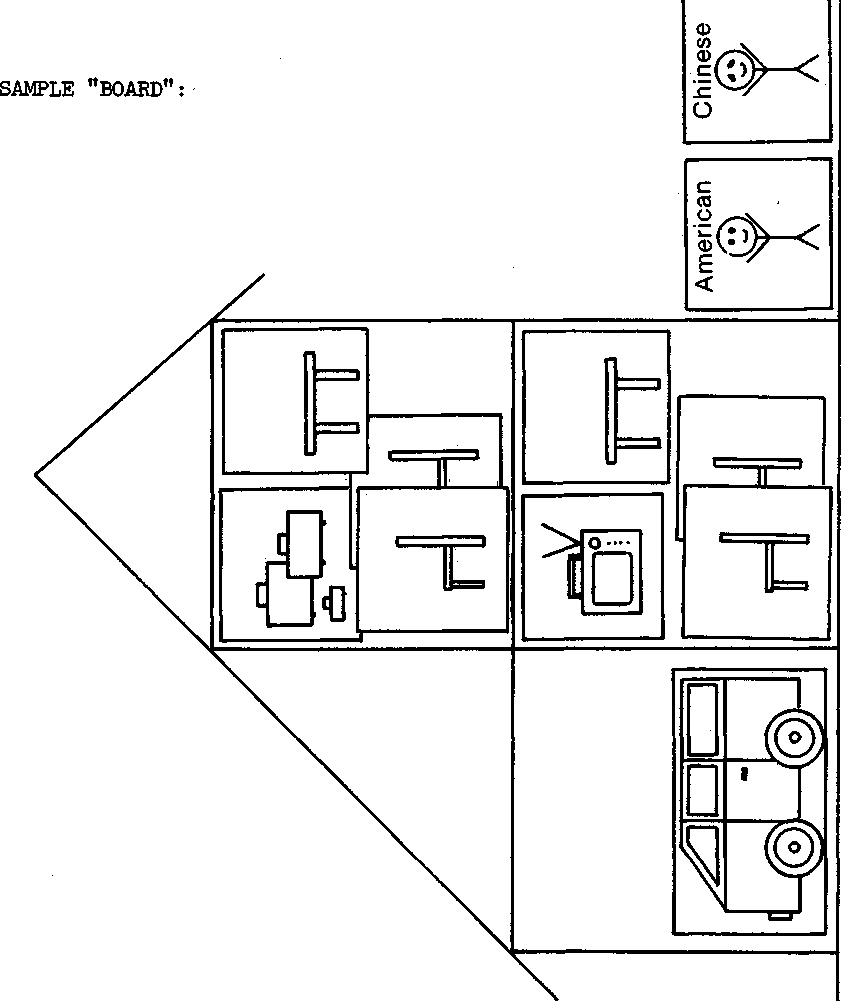
NOTE: The items to be moved, are shown in their starting/ending positions. There are two ways to squeeze several cards into one room: either put one or more cards up near the ceiling, or cover one card with another (as two chair cards are shown here covering two others).
CARDS—MOVING
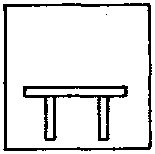
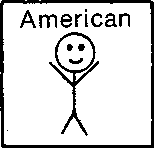

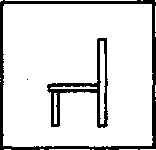
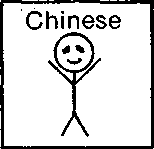


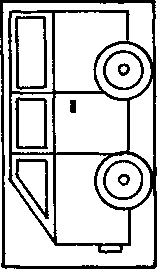





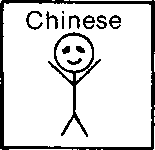


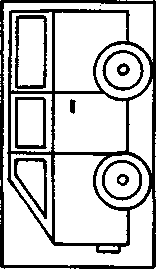

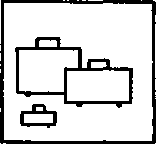
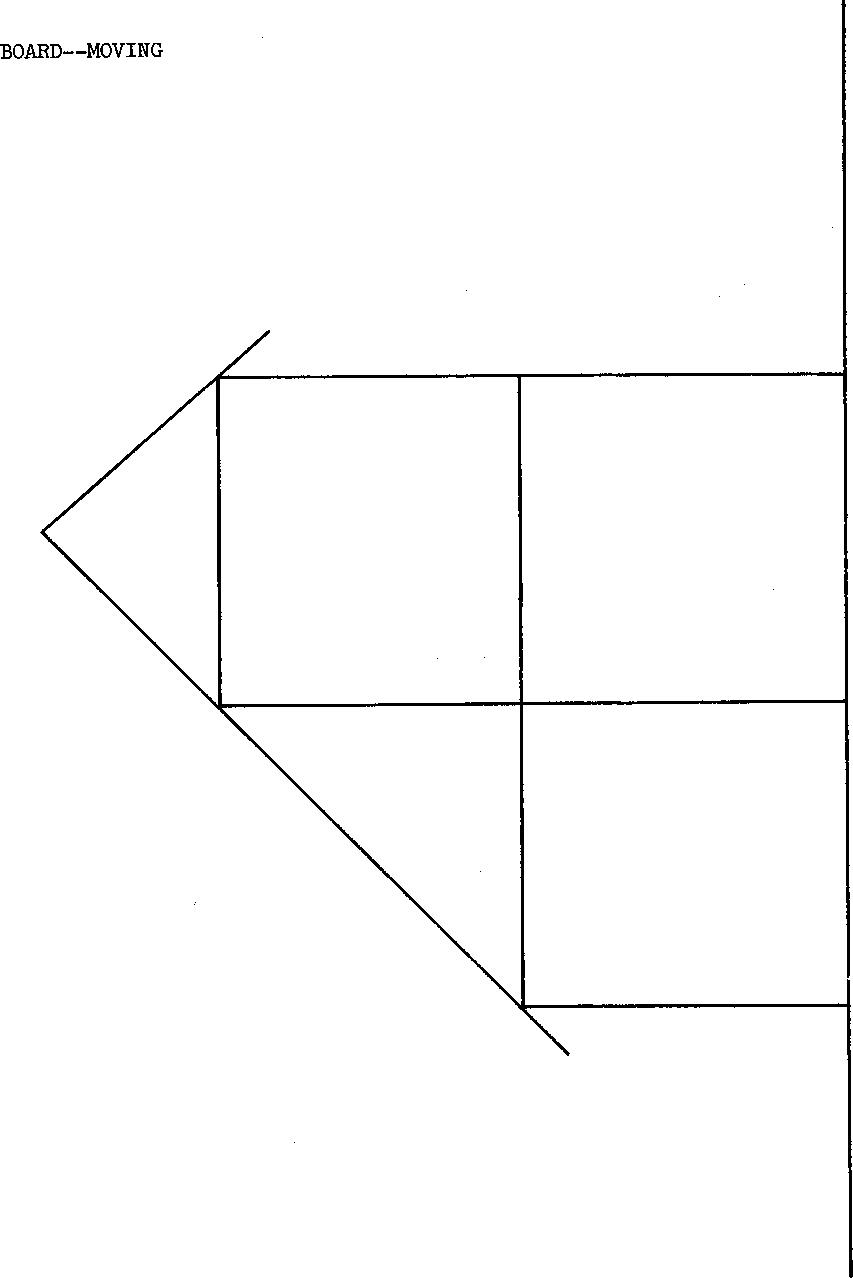
*A: Lin Kēzhǎng ma? Wǒ shi Měiguo Yínhángde Fan Měilì.
K W w
B: Ou, Fan Nushi, nin hao. Hao jiǔ méi jiàn.
A: Hǎo jiǔ méi jiàn. Nín zěnme-yàng? Mang ma?
B: Bù zěnme máng.
A: Lin Kēzhǎng, wo you dian shì yào hé nin dāngmiàn tantan. Nín míngtiān you shíjiān ma?
K. w
B: You. Ei..., Fan Nushi, you yige xīn kāide Sìchuān fànguǎnzi lí women zhèli fēicháng jin. Wǒ míngtiān qīng nín chī zhōngfàn, hǎo ma? Women chī fànde shíhou kéyi tantan.
A: Nà bù hǎo yìsi. Nín yǐjing qīngguo wo hǎoxiē cì le. Zhècì wǒ qǐng nín.
B: Bié kèqi. Wǒ qǐng nín. Wǒ suírán hái méi qùguo, kěshi Lī Banian Xiānsheng qù chīguo le. Tā shuō zhège fànguǎnzide cài you nàge Hunan fànguǎnzide cài nàme hǎo, gěng piányi. Yě you hǎoxiē cài biéde dìfang chībuzhāo.
A: Shì ma.’ You hǎo you piányi, yídìng děi qù chī yícì. Hǎo, míngtiān jīdiǎn zhōng jiàn?
B: Shíèrdiān bàn zěnmeyàng? Duì nín héshì ma?
A: Shíèrdiān bàn hǎo. Nàme wǒ dào nín nàbian qu.
Is this Section Chief Lin? I am Mary Fane from the Bank of America.
Oh, Miss Fane. How .are you. I haven’t seen you for a long time.
Yes, it has been a long time. How are things going? Are you busy?
Not particularly busy.
Section Chief Lin, I have something I would like to talk with you about in person. Do you have time tomorrow?
Yes. Eh..., Miss Fane, there is a newly opened Szechuanese restaurant that is very close-by. I’ll treat you to lunch tomorrow. Okay? We can talk while we are eating.
I couldn’t let you do that. You have already treated me many times. This time I’ll treat you.
Don’t be so polite. I’ll treat you. Although I haven’t gone there yet, Mr. Lī Dànián has gone there to eat. He says the food at that restaurant is as good as the food at that Hunanese restaurant, and it’s even cheaper. They also have many dishes you can’t find in other places.
Is that so.’ If it’s both good and cheap, we certainly must go there to eat once. All right, what time shall we meet tomorrow?
How would twelve-thirty be? Would that be all right for you?
Twelve-thirty would be fine. Well then, I’ll go to your place.
*The untranslated version of this conversation is on the C-l tape. The conversation also appears as Exercise 1 on the C-2 tape.
B: Hǎo. Wǒ zài louxià děng nín.
A: Hǎo, zàijiàn.
B: Zàijiàn.
All right, I'll wait for you downstairs.
All right. Good-bye.
Good-bye.
In this conversation Mary Fane (Fan Měilì) is calling an official in Taipei to discuss business.
You will hear the conversation twice. As you listen to it for the second time, translate orally during the pauses provided on tape. Compare your translations with the suggested translations given by the speaker.
You will hear the vocabulary used in a different context. The conversation takes place between Miss Wilson, who works for an American company in Taiwan, and her friend Professor He.
You will hear the conversation twice. Answer the questions below as you listen for the second time.
|
Here are some expressions you will hear: | |
|
lǎoshi |
(always, all the time |
|
Yúyuán |
(Szechuan Garden) |
|
you míng |
(to be famous) |
|
lián... (yě) |
(even...Ealsol) |
|
jiāoqū |
(suburbs) |
QUESTIONS
1. Why is Miss Wilson embarrassed?
2. Has the East Gate Restaurant been open for a long time?
( ) Yes ( ) No
3. Is it close to Miss Wilson’s office? ( ) Yes ( ) No
U. The food at the Szechuan Garden is
( ) better than the food at the East Gate.
( ) not as good as the food at the East Gate.
5. Is the food at the East Gate expensive? ( ) Yes ( ) No
6. What does Miss Wilson decide about going to the East Gate? ( ) definitely will not go ( ) probably will not go ( ) probably will go ( ) definitely will go
This exercise will give you practice with words and expressions typically used in planning a picnic. Mrs. Billings, a member of a tourist group in Běijīng, is talking with the group’s guide.
You will hear the conversation twice. Answer the questions below as you listen for the second time.
|
Here are expressions you will need for this exercise: | |
|
Chángchéng |
(the Great Wall) |
|
ānpaihǎo le |
(successfully arranged) |
|
Shísānlíng |
(Ming Tombs Eliterally, ’’Thirteen Tombs’’!]) |
|
cānguān |
(to visit) |
|
yěcān |
(picnic) |
|
ziji |
(oneself E"myself," ’’yourself," etc. 3) |
|
dài |
(to bring along) |
|
-bù |
Ecounter for cars and buses!] |
|
chūfā |
(to start a journey) |
QUESTIONS
1. Where is the group going first?
2. Is there a restaurant there? ( ) Yes ( ) No
3. What is the hotel dining room preparing?
U. When will the group leave the hotel?
5. When is the group supposed to come downstairs?
In this exercise you will hear expressions typically used, to discuss plans for going to a restaurant. The conversation takes place between two Chinese people who work in the same office in Taipei.
You will hear the conversation twice. As you listen to it for the second time, answer the questions below.
You will need tīngshuō gānjing zhāodài
(I have heard that....)
(to be clean)
(to be hospitable to)
QUESTIONS
1. Has Miss Gāo eaten yet? ( ) Yes ( ) No
2. Is the food at the Great China Restaurant better or worse than it used to be? _______________________________________________________
3. Does Miss Gāo think they have enough time to go to the East Gate Restaurant? ( ) Yes ( ) No
U. Is the food at the East Gate better or worse than when the restaurant first opened? ._____________________________________________________
In this exercise you will use three different constructions to make comparisons.
.,.bī... Cto indicate that something is MORE!
...méiyou...(nàme) Cto indicate that something is LESS!
...gēn...yíyàng Cto indicate that something is EQUAL!
Display I shows the ratings of six restaurants in Taipei: the more smiles beside a restaurant’s name, the better its rating. Use this information to answer the questions on tape.
Example
TAPE: Dōngmén Cāntīngde cài bǐ Dàhuá Fàndiànde cài hǎo ma?
YOU: Bù, Dōngmén Cāntīngde cài méiyou Dàhuá Fàndiànde cài hǎo.
TAPE: Dōngmén Canting gēn Shāndōng Xiǎo Chīdiàn, nálide cài hǎo?
YOU: Dōngmén Cāntīngde cài bī Shāndōng Xiǎo Chīdiànde cài hǎo.
TAPE: Dōngmén Cāntīng gēn Sān-liù-jiù, nálide cài hǎo?
YOU: Dōngmén Cāntīngde cài gēn Sān-liù-jiùde cài yíyàng hǎo.
DISPLAY I
RESTAURANT
RATING
©© ©©©© ©©©© ©©<3 ©3
©©
Dōngmén Cāntīng
Dàhuá Fàndiàn
Yuyuán
Nánběi Xiǎo Chīdiàn
Shāndōng Xiǎo Chīdiàn
Sān-liù-jiu.
In this exercise you will discuss where you will go to do certain things.
Display II lists five activities, the places you will go to do them, and the reasons for choosing those places. Use this information in your conversations.
Example
TAPE: Jīntiān women yìqǐ qù mǎi cài, hǎo ma?
YOU: Hǎo a. - -
TAPE: Dào nǎli qù mǎi a?
YOU: Dào Xīméndīng Càishichǎng qù ba.
TAPE: Xīméndīng Càishichǎng kǒngpà méiyou Dōngmén Càishichǎng nàme dà.
YOU: Suīrǎn bú tài dà, kěshi lí women zhèli jin.
TAPE: Rúguǒ women dào Dōngmén Càishichǎng qù, women mǎi cài yīhòu kéyi zài nàli chī diǎn dōngxi.
YOU: Hǎo ba.
DISPLAY II
ACTIVITY PLACE REASON FOR GOING THERE
|
shop for food |
Xīméndīng Market |
It’s close-by. |
|
go to the park |
Zhōngshān Park |
Not too many people are there. |
|
go for lunch |
Dōngmén Cāntīng |
It’s not so expensive. |
|
buy books |
Yuǎndōng Bookstore |
It’s larger. |
|
go to a coffeehouse |
Huǎměi Coffeehouse |
It’s close. |
In this exercise you will act as an interpreter for an American woman and. a Chinese man who both work for the same firm in Taiwan.
First, you will hear the conversation without interruptions. Then it will be presented as if the woman cannot speak Chinese and the man cannot speak English. Each speaker’s lines will be followed by a pause, during which you will translate.
Example
AMERICAN: Wang, the weather is very good today. Let’s go out for lunch. Okay?
YOU: Xiǎo Wang, jīntiān tiānqi hěn hǎo. Women chūqu chī zhōng-
fàn hǎo bu hǎo?
CHINESE: Hǎo a.’ Dào Dàhua Cāntīng qù zěnmeyàng?
YOU: Fine.’ How about going to the Great China Restaurant?
For this exercise you will need the following expressions
|
tiānqi yìxiē zǎofan |
(weather) (some) (breakfast) |
|
bù yídìng wǎnfàn |
(it’s not definite.) (dinner) |
|
píngchāng |
(usually) |
INSTRUCTIONS:
Type: Restaurant Rating
Situation: You and your friend are in a hotel in Taipei. You are asking him to compare four Taipei restaurants in terms of quality of food, price, and distance from your hotel.
Goal: For the player who is asking questions to place the restaurant cards on his rating sheet ('’board”) so that the arrangement matches the ratings on his partner’s fact sheet.
Number of Players: Pairs of students.
Materials: A "board," a fact sheet, and a deck of cards for each pair of students. (See Sample "Boards," Sample Fact Sheets, and Cards—Restaurant Rating, on the following pages.)
One player, who is supposed to know about the restaurants, has a fact sheet. Under the headings Food, Price, and Distance, the restaurants are rated, with the DESIRABLE end of the scales on the right-hand side of the fact sheet.
The other player, who will ask questions, has a rating "board" and a deck of twelve cards. The name of a restaurant and a heading (Food, Price, or Distance) appear on each card.
The first Sample "Board" includes cards as they would be arranged at the conclusion of a game. Under the Food heading, Nánběi Xiǎo Chīdiàn and Dōngmén Canting are rated as having the same quality food. Yúyuán has better food, and Dàhua Fàndiàn has worse food. Under Price, Yúyuán and and Nánběi Xiǎo Chīdiàn are rated as having cheap food, and Dàhuá Fàndiàn and Dōngmén Canting as having expensive food.17 All four restaurants are the same distance from your hotel.18
Procedure: The player asking questions draws the cards one at a time from the shuffled deck. The first card drawn for each heading (Food, Price, Distance) is placed in the middle of the appropriate scale. If the first Price card is "Yúyuán," the player puts it in the middle box under Price. When other Price cards are drawn, the player asks how the restaurants compare in price and arranges the cards accordingly. For the price card
"Dàhuá Fàndiàn," he might ask Dàhuá Fàndiànde cài bǐ Yúyuánde cài guì ma? If the answer is affirmative, he puts the "Dàhuá Fàndiàn" card in the left-hand box on the scale and the "Yúyuán" card in the right-hand box. The player continues to arrange all the cards until he is satisfied that his "board" duplicates his partner’s fact sheet.
All questions must be yes/no questions involving comparisons. All answers must be comparison statements. (You may want to make an occasional additional comment that goes beyond these restrictions, however.)
' The player who asks the questions could obtain all needed information by using only the bǐ construction. But he should try out all comparison constructions which have been introduced in this course. Similarly, the other player should use the full range of comparison constructions in his answers. (This may sometimes lead to evasive answers, but these will inspire follow-up questions.)
Example: You are Speaker 2. Speaker 1 is asking the questions. This example shows the final three moves made on the Sample "Board" with cards.
SI: (taking his next card) Dàhuá Fàndiànde cài bǐ Nánběi Xiǎo Chīdiànde cài hǎo ma?
S2: Bù, Dàhuá Fàndiànde cài méiyou Nánběi Xiǎo Chīdiànde cài nàme hǎo.
SI: (putting the "Dàhuá Fàndiàn (food)" card in the left-hand box under the Food heading and moving the two cards already there to the middle box) Xièxie.
(taking his next card) Yuyuán lí zhèr you Dōngmén Canting lí zhèr nàme yuǎn ma?
S2: Duì le, Yúyuán lí zhèr you Dōngmén Canting lí zhèr nàme yuǎn.
SI: Yúyuán lí zhèr bǐ Dōngmén Canting lí zhèr yuǎn ma?
S2: Bù, Yúyuán gēn Dōngmén Canting lí zhèr yíyàng yuǎn.
SI: (putting his "Yúyuán (distance)" card in the middle box under the Distance heading, with the other cards) Hǎo.
(taking his last card) Dōngmén Cāntīngde cài bǐ Nánběi Xiǎo Chīdiànde piányi ma?
S2: Bù, Dōngmén Cāntīngde cài bǐ Nánběi Xiǎo Chīdiànde guì.
SI: Dōngmén Cāntīngde cài you Dàhuá Fàndiànde nàme guì ma?
S2: Duì le, Dōngmén Cāntīngde cài you Dàhuán Fàndiànde nàme guì.
SI: (putting the "Dōngmén Cāntīng (price)" card in the left-hand box under the Price heading) Hǎo, xièxie.
Additional Note: For a second round in this game, switch roles with your partner.
Practice Points: Bǐ, yíyàng, méiyou...nàme, you—nàme, bù...yíyàng.
SAMPLE "BOARD" (with cards):
bad ----
FOOD
good
Dàhuá Fàndiàn (food)
|
Nánběi Xiǎo Chīdiàn (food) |
Yúyuán (food) | ||
|
Dōngmén Cāntīng (food) | |||
expensive ----
PRICE
cheap
|
Dàhuá Fàndiàn |
Yúyuán | |
|
(price) |
(price) | |
|
Dōngmén Cāntīng |
Nánběi Xiǎo Chīdiàn | |
|
(price) |
(price) | |
far
DISTANCE
near
|
Nánběi Xiǎo Chīdiàn (distance) | ||||
|
Yúyuán (distance) | ||||
|
Dàhuá Fàndiàn (distance) | ||||
|
Dōngmén Cāntīng (distance) | ||||
CARDS—RESTAURANT RATING
Dàhua Fàndiàn (food)
Dàhua Fàndiàn (price)
Dàhuá Fàndiàn (distance)
Yúyuán (food)
Yúyuán (price)
Yúyuán (distance)
Nánběi Xiǎo Chīdiàn (food)
Nánběi Xiǎo Chīdiàn (price)
Nánběi Xiǎo Chīdiàn (distance)
Dōngmén Cāntīng (food)
Dōngmén Cāntīng (price)
Dōngmén Cāntīng (distance)
SAMPLE ’’BOARD":
FOOD
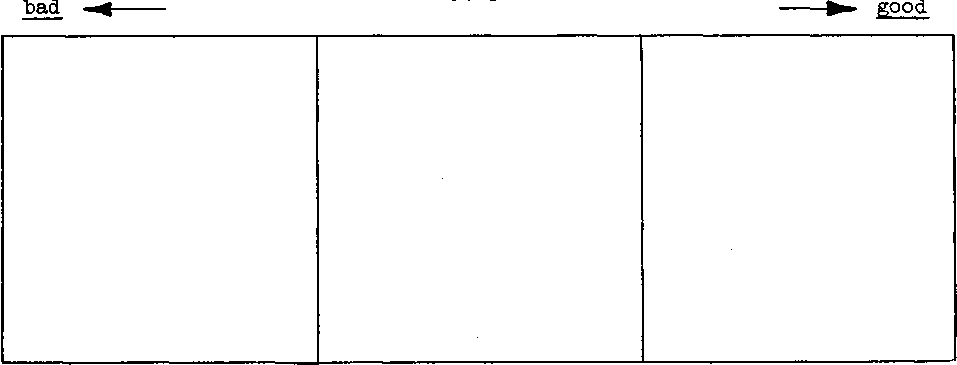
expensive
PRICE
---cheap
far
DISTANCE
---near
SAMPLE FACT SHEET:
bad. good
|
Dàhuá Fàndiàn Yúyuán |
Nánběi Xiǎo Chīdiàn |
Dōngmén Canting |
|
expensive ---- |
PRICE |
----cheap |
|
Yúyuán |
Dàhuá Fàndiàn Nánběi Xiǎo Chīdiàn |
Dōngmén Canting |
far
DISTANCE
near
|
Dōngmén Canting |
Yúyuán Nánběi Xiǎo Chīdiàn |
Dàhuá Fàndiàn |
|
bad. ---- |
FOOD |
---good |
|
Nánběi Xiǎo Chīdiàn |
Dàhua Fàndiàn Yuyuán Dōngmén Cāntīng |
|
PRICE expensive ---- —■—cheap | ||
|
Nánběi Xiǎo Chīdiàn |
Yuyuán Dōngmén Cāntīng |
Dàhuá Fàndiàn |
|
„ DISTANCE _ T,OQV. far near | ||
|
Dàhuá Fàndiàn |
Nánběi Xiǎo Chīdiàn |
Yuyuán . Dōngmén Cāntīng |
bad
FOOD
good
|
Dàhuá Fàndiàn Yúyuán Nánběi Xiǎo Chīdiàn Dōngmén Cāntīng |
expensive
PRICE
cheaP
|
Dàhuá Fàndiàn Dōngmén Cāntīng |
Nánběi Xiǎo Chīdiàn |
Yúyuán |
|
far ---- |
DISTANCE |
---near |
|
Yúyuán |
Nánběi Xiǎo Chīdiàn |
Dàhuá Fàndiàn |
|
Dōngmén Cāntīng |
bad ---
FOOD
----good
|
Dahuá Fàndiàn Nánběi Xiǎo Chīdiàn Dōngmén Canting |
Yúyuán |
PRICE
expensive
|
Dàhuá Fàndiàn Yúyuán Nánběi Xiǎo Chīdiàn Dōngmén Canting | ||
|
far ---- |
DISTANCE |
---near |
|
Dàhuá Fàndiàn |
Yúyuán Dōngmén Canting |
Nánběi Xiǎo Chīdiàn |
*A: Qǐngwèn, Mǎ Kēzhǎng zài bu zai?
B: Bú zài. Tā qù kāi hui qu le. Nín you shénme shi?
A: Wǒ you diǎn shi xiǎng gēn Mǎ Kēzhǎng dāngmiàn tantan.
B: Tā shíyīdiǎn cǎi huílai. Nín yào bu yao zài zhèli děng ta yíxià?
A: Hǎo, xièxie. Qǐngwèn nín guìxìng?
B: Wǒ xing Zhào.
A: Ou, Zhào Nushì. Wǒ shi Luo Bote. Nín shi bu shi xīn láide? Yǐqián wǒ méiyou jiànguo nín.
B: Shide, wǒ shi zuotiān gāng pàilaide.
A: Nín yǐqián zài shénme dìfang gōngzuò?
B: Wǒ yǐqián zài Táizhōngde Táiwān Yínháng gōngzuò.
A: Tīngshuō Táizhōngde Táiwān Yínháng you yíwèi Lǐ Kēzhǎng, shi ma?
B: Shi. Nàbian shi you yíwèi Lī Kēzhǎng. Tāde míngzi jiào Lī Guoān. Nín rènshi ta ma?
A: Bú rènshi. Wǒ xiǎng gēn nín dǎting dating. Tā shi bu shi xué jīngjide?
May I ask, is Section Chief Mǎ in?
He’s not in. He went to a meeting. What can I do for you?
I have something I want to talk with Section Chief Mǎ about in person.
He won’t be back until eleven. Do you want to wait for him here for awhile?
Yes, thank you. What is your name?
My name is Zhào.
Oh, Miss Zhào. My name is Roberts. Did you come here recently?
I haven’t seen you before.
Yes, I was just assigned here yesterday.
Where did you work before?
Before, I worked at the Taichung branch of the Bank of Taiwan.
I’ve heard that there is a Section Chief Lǐ at the Taichung branch of the Bank of Taiwan. Is that right?
Yes. There IS a Section Chief Lī there. His name is Lǐ Guoān. Do you know him?
No. I want to ask you about something. Did he study economics?
*Only the untranslated version of this conversation is on the C-1 tape. The conversation also appears as Exercise 1 on the C-2 tape.
B: Bú cuò.
A: Wǒ péngyou gàosong wo tā shi shénme dàxué bìyède, wǒ wàngji le.
B: Tā shi Táiwān Dàxué bìyède.
A: Duì le, shi Taidà bìyède. Wǒ xiàge yuè yào dào Taizhōng qù; hen xiǎng gēn ta tantan. Nín néng bu néng gěi wo jièshao jièshao?
B: Méi wèntí. Nín qù Taizhōng yīqiǎn gàosong wo. Wǒ gěi ta dǎ ge diànhuà, shuō yíxià.
A: Hǎojíle. Zhen xièxie nín.
B: Bu kèqi. ōu, xiànzài chàbuduō shíyīdiǎn le. Mǎ Kēzhǎng mǎshàng jiù yào huílai le.
A: Hǎo, wǒ zài zhèli děng ta.
That’s right.
ìty friend told me which university he graduated from, but I’ve forgotten.
He graduated from Taiwan University.
That’s right. He graduated from Taiwan University. I’m going to Taichung next month and would very much like to talk with him. Can you give me an introduction to him?
No problem. Before you go to Taichung, tell me. I’ll give him a call and talk with him about it.
That’s great! I really thank you.
You’re welcome. Oh, it’s almost eleven now. Section Chief Mǎ will be back very soon now.
All right. I’ll wait for him here.
In this conversation Mr. Roberts (Luò Bote Xiānsheng) is at the Taipei branch of the Bank of Taiwan. As you listen to the dialogue for the second time, translate orally during the pauses provided on tape. Compare your translations with the suggested translations given by the speaker.
In this exercise the vocabulary for Unit 7 is presented in a new context. Miss Wilson, an American who works in Taipei, is talking with her friend Professor Hé, who teaches at Taiwan University.
You will hear the conversation twice. As you listen to it for the second time, answer the questions below.
Here are expressions you will need for this exercise:
Yēlǔ Daxué yánjiuyuàn cōngming yònggōng Shìjiè Yínháng xiú jià
(Yale University) (graduate school) (to be intelligent) (to be hardworking) (World Bank)
(to take a vacation)
QUESTIONS
1. When did Miss Wilson receive her graduate degree from Yale?
2. Was Yang Shūhuì a good or a bad student at Yale?
3. What did he do after he graduated?
U. What is he going to do soon? ________________________________________
5. How long will it be until he arrives?
In this exercise you will hear expressions typically used to arrange informal meetings. The conversation takes place at the Beijing University library between a Canadian and a Chinese student.
You will hear the conversation twice. Answer the questions below as you listen for the second time.
You will hear the following:
Bǎihuó Dàlōu Dongfeng Shìchǎng duōde duō -tang xià kè kěnéng
Ca department store in Beijing! (Dōngfēng Market CBěijīng!) (much more) Ccounter for classes! (to get out of class) (maybe)
QUESTIONS
1. On what day is the WángfǔjIng Shopping District less crowded?
( ) Saturday ( ) Sunday
2. Does the department store sell more things than the Dōngfēng Market? ( ) Yes ( ) No
3. When does Wang want to go shopping? ( ) morning ( ) afternoon
In this conversation an informal meeting is arranged. Miss Chen is telephoning her American friend Miss Brown (Huang).
You will hear the conversation twice. Answer the questions below as you listen for the second time.
You will hear the following expressions:
yàobushi...jiùshi... yuèdǐ
yuèchū
(if it’s not...then it will be...)
(end of the month)
(beginning of the month)
QUESTIONS
1. Miss Brown (Huang) is soon to return
( ) to school.
( ) home.
( ) to the United States.
2. When does Miss Brown plan to go? .
3. What does Miss Chen invite Miss Brown to do?
U. When and where will the two women meet?
5. Does Miss Huang have a car? ( ) Yes ( ) No
In this exercise you will talk about where and when people went to school and what they studied. Ask questions about the people listed in Display I. For each person, find out where he/she went to college, what class he/she was in, and what subject was his/her major field of study. Complete Display I by filling in the needed information.
Example
YOU: Bai Huìrán shi něige dàxué bìyède?
TAPE: Tā shi Taiwan Dàxué bìyède.
YOU: Tā shi něinián bìyède?
TAPE: Tā shi Yījiǔqīsānnián bìyède.
YOU: Tā zài dàxué niàn shénme?
TAPE: Tā niànde shi lìshǐ.
After completing the display, use this information to answer questions on tape. You will be asked which people know each other. You are to assume that people who studied the same subjects and were in the same college at the same time would probably know each other.
DISPLAY I
COLLEGE CLASS OF MAJOR
|
Bai Huìrán Gāo Bīngyīng Shǐ Guoquán Lǐ Tíngfēng Wáng Défén Dèng Shàowén | |||
In this exercise you will make phone calls to ask for information. Display II lists the calls you want to make today: whom you want to call, what you want to find out, and detailed instructions for making each call.
Take the part of Miss White and make the phone calls. A typical conversation is as follows.
Example
YOU: Wei, Xiǎo Mǎ, zǎo!
TAPE: Zǎo! Shì Xiǎo Bai ba?
YOU: Shì. Wǒ xiǎng gēn ni dǎting yíjiàn shì.
TAPE: Shénme shì a?
YOU: Wáng Kēzhǎng shì bu shi Jīntiān cóng Xiānggǎng huílai?
TAPE: Tā dǎ diànhuà lai shuō tā jīntiān huíbulāi, yào hòutiān cai neng huílai.
YOU: Hǎo, xièxie.
DISPLAY II
1. Call Xiǎo Mǎ to find out if Section Chief Wang is coming back from Hong Kong today.
a. Say good morning to Xiǎo Mǎ.
b. Tell him you would like to ask him something.
c. Ask if it is today that Section Chief Wang is coming back.
d. Thank him.
2. Call Mr. Liu to find out when Mr. White (Huāitè) is returning to his country.
a. Say hello.
b. Ask if this is Mr. Liu.
c. Tell him you would like to ask him something.
d. Ask when Mr. White is returning to his country.
e. Comment on the fact that he is leaving so soon.
f. Say that you didn't want anything important—you just wanted to invite Mr. White for a simple meal.
3. Call Professor Cheng to find out when Professor Wei will be back from America.
a. Ask if this is Professor Cheng.
b. Tell him you would like to ask him something.
c. Ask when Professor Wèi will be back from America.
d. Request that Professor Cheng ask on your behalf.
U. Call Xiǎo Zhang to find out when Lǎo Song is going to Tokyo (Dōngjīng).
a. Say hello to Xiǎo Zhāng.
h. Tell him you would like to ask him something.
c. Ask when Lǎo Song is going to Tokyo.
d. Ask if Xiǎo Zhāng knows how long Lǎo Song plans to stay there.
In this exercise you will act as an interpreter for a young American woman and a Chinese man.
First, you will hear the telephone conversation in Chinese, without interruptions. Then it will be presented as if the woman cannot speak Chinese and the man cannot speak English. Each speaker’s lines will be followed by a pause, during which you will translate.
Example
CHINESE: Wai!
YOU: Hello.'
AMERICAN: Is it Mr. Mǎ?
YOU: Shi Mǎ Xiānsheng ma?
INSTRUCTIONS:
Type: Who’s Who
Situation: The setting is Taipei. A friend is teaching you to recognize pictures of several people and is also telling you several, biographical facts about each person. Then you help your friend learn the same things.
Goal: To learn to recognize the faces and to associate the biographical facts with the faces.
Number of Players: Pairs of students.
Materials: A deck of flash cards for each pair of students. (See Flash Cards, on the following pages.) On one side of each card is a face and a symbol indicating sex (cf for a male and ? for a female). On the other side, biographical facts about that person are given: name, college, graduation year, and major field of study. All of the people listed on the cards are Americans with adopted Chinese names.
Set 1 flash cards are for Round 1 of the game. Set 2 cards are for the second round. (Partners switch roles for a second round.)
Procedure: The flash cards are placed face up between the two players. Either player may choose a card to be discussed. The "teacher” picks up that card so that he can read the back, while the ’’student" sees only the face on the card. The two players then discuss the person described on the card until the "student" is reasonably familiar with the information about that person. Then another card is chosen.
The "student" or the "teacher" may at any time ask to review a card discussed earlier. The "student" may test himself on any card at any time, and the "teacher" may test his partner on any card at any time. The "teacher" may ask the "student" whether he recognizes a face, whether he remembers who the person is, whether he has forgotten where the person went to college, and so forth.
Example: You are Speaker 1, the "teacher." You are checking to see if your "student" remembers information about a person described on a card which was studied previously.
SI: Nǐ rènshi bu renshi zhèige rén?
S2: Wǒ bú rènshi ta.
SI: Nī wàng le, tā shi Mǎ Mínglī.
S2: Ou, wǒ xiǎngqilai le. ("Now I remember." Cxiǎng, "to think," plus qīlái, literally, "to rise"!)
Wǒ hái jìde tā shi Niǔyuē Dàxué bìyède, shi bu shi?
|
SI: |
Bú |
cuò. Nī zhīdao bu zhidao tā shi něinián bìyède? |
|
S2: |
Wǒ |
wàngji le. Nī gàosong wo tā shi neinián bìyède. |
|
SI: |
Tā |
shi Yījiǔliùwǔnián bìyède. |
|
S2: |
Wǒ |
yè wangle tā zài dàxué niànde shi shénme. |
SI: Ni xiǎngyixiāng.
S2: Òu, wǒ jìde le. Tā niànde shi Fǎguo lìshǐ.
SI: Duì le.
Practice Points: Rènshi, wàng, wàngji, J ide, cud, and review of associated vocabulary.
FLASH CARDS—WHO'S WHO





|
Zhào Shàohuá (M) |
Set 1 | |
|
@ a |
New York University '73 English History |




|
Wang Yàozōng (M) |
Set 2 | |
|
University of Pennsylvania ’63 American History | ||
|
Wèi Xiùqín (F) Set 2 | |
|
University of California | |
|
V^x^y o |
’72 |
|
X^z ¥ |
Economics |
|
Wú Tiānxiáng (M) Set 2 University of Washington '59 Political Science |


|
© „■ |
Wang Yàozōng (M) Set 2 University of Pennsylvania ’63 American History |
|
Wèi Xiùqín (F) Set 2 University of California '72 Economics |



In this conversation you will hear expressions which can be used to decline a formal invitation. Mrs. Robinson (Luo) is secretary to the chief executive officer of the Bank of America’s Chinese branch in Taiwan. She has received a telephone call.
You will hear the conversation twice. As you listen to it for the second time, answer the questions below.
Here are some expressions you will need to know:
|
Jīngjibù zǒng jīnglǐ |
(Ministry of Economics) (general manager Echief executive officer!) |
|
nánbù |
(the southern part Cof the island!, the south) |
|
cānjiā xièxie tāde yāoqǐng |
(to participate in, to attend) (to thank him for his invitation) |
QUESTIONS
1. From whom does Mrs. Robinson (Luo) receive a call?
2. Has Minister Sūn received an invitation? ( ) Yes ( ) No
3. Can Minister Sūn attend on July 2? ( ) Yes ( ) No
U. Why, or why not? __________________________________________________
The vocabulary of Unit 8 and. some useful new terms are included in this conversation. Comrade Wang and Comrade Cheng, two cadres of the Ministry of Public Health in Beijing, are talking.
You will hear the conversation twice. As you listen to it for the second time, translate orally during the pauses provided on tape. Compare your translations with the suggested translations given by the speaker.
Here are ten expressions you will need for this exercise:
tóngshì cānguān
Shoudū Gangtie Chang yīsheng dàibiǎotuán yīyuàn láodòng mófàn láodòng zhèngzhi xuéxí shítáng
(fellow worker, colleague)
(to visit)
(Capital Iron and Steel Factory)
(doctor, physician)
(delegation)
(hospital)
(model worker)
(to labor)
(political study session)
(mess hall, dining hall)
You will hear expressions which may be used to decline an invitation. This phone conversation is about an invitation being received by Colonel Lincoln (Lin) in Taiwan.
You will hear the conversation twice. Answer the questions on the next page as you listen for the second time.
Here are expressions you will need to know:
shàngxiào náribù
canguan
jūnshì yǎnxí juéde cānjiā
(colonel)
(southern part)
(to visit)
(military maneuvers)
(to feel)
(to participate in, to attend)
QUESTIONS
1. Who is the woman making the call?
2. From whom is the invitation? ______________________________________
3. For what day is the invitation?
U. For what kind of occasion is the invitation?
5. Where is Colonel Lincoln (Lin) now?
Mr. Anderson is an American economic officer in Beijing. He has just returned from a trip to the United States which was taken for purposes of consultation. In this conversation Mr. Anderson is talking to his counterpart in the Ministry of Foreign Trade.
You will hear the conversation twice. Answer the questions on the next page as you listen for the second time.
Here are some expressions you will hear:
|
dìèrtiān |
(the next day) |
|
qīnzì juéde cānjiā |
(personally, privately) (to feel) (to participate in, to join, to attend) |
|
dù jià zhǔchí jiéhūn |
(to take a vacation) (to preside at a marriage ceremony Ei.e., to give the bride away!) |
|
zhǔchí |
(to preside Eatl) |
|
jiéhūn diǎnlǐ |
(to get married) (ceremony) |
|
dào xǐ |
(to congratulate) |
|
Xiàwēiyí |
(Hawaii) |
QUESTIONS
|
1. |
When did Mr. |
Anderson return? |
|
2. |
When did Mr. |
Anderson receive the invitation? |
|
3. |
Whom did Mr. |
Anderson ask to pass on the message? |
U. Did that person pass on the message? ( ) Yes ( ) No
|
5. |
Where did Mr. |
Anderson |
go |
first? , |
|
6. |
Where did Mr. |
Anderson |
go |
next? |
|
7. |
Where did Mr. |
Anderson |
go |
last, and for how long? ________________ |
This conversation will show you how the vocabulary you are using in this unit might be used in a more informal situation. The phone call concerns an alumni association. Mr. Wang is the secretary, and Mr. Lin is the president.
You will hear the conversation twice. Answer the questions on the next page as you listen for the second time.
Here are words you will hear in this conversation:
|
tīngdechūlái |
(to be able to recognize something from its sound) |
|
jiēdào tóngxuéhuì |
(to receive) (alumni association Eliterally, ’’fellow-student group”H) |
|
tōngzhī |
(announcement CwrittenL], notification) |
|
cānjiā |
(to participate in, to join, to attend) |
|
dàjiā |
(everybo dy, everyone) |
|
yīnggāi |
(should, ought to, must) |
QUESTIONS
1. Does Miss Sòng answer the phone? ( ) Yes ( ) No
2. For what day is the student get-together planned?
3. How long has it been since they got together last?
U. What are some of the former classmates planning to do on the evening of the twenty-first?
In this translation exercise you will review some of the important grammar points covered in the Meeting Module: comparisons, "any” statements, compound verbs of result, and sentences containing bǎ.
First, you will hear an English sentence. Translate it into Chinese. Then, you will hear a suggested translation.
Example
TAPE: One. Can you walk up here?
YOU: Nǐ zǒudeshànglái ma?
TAPE: Two. He gave the apples to his little sister.
YOU: Tā bǎ píngguǒ gěi tā mèimei le.
You are learning from each attempt to produce constructions like these. You may wish to repeat the exercise several times.
In this exercise you will review the aspect markers you have learned: two types of le, guo, and ne.
Display I lists people who studied, are studying, and will study English (four people) and French (four people). It shows the dates and duration of the studies. Use this information to answer the questions on tape.
Example
TAPE: Chen Guoquān xuéguo Yīngwén ma?
YOU: Xuéguo.
TAPE: Tā wué Yīngwén, xuéle duo jiǔ?
YOU: Tā xuéle liǎngniān.
TAPE: Tā you duo jiǔ méi xué Yīngwén le?
YOU: Tā you sānniān méi xué Yīngwén le.
NOTE: Some questions and answers will refer to ongoing actions; some will refer to future actions; and some will refer to completed actions.
For this exercise you need to know that jìhua can he a noun meaning "a plan” as well as a verb meaning "to plan."
Tā you méiyou jìhua xué Fàwén? ___
(Does he have a plan to study French?)
Tā jìhua shénme shíhou kāishǐ xué Fàwén?
(When does he plan to start studying French?)
DISPLAY I
Q Q o o Soo
O Ō Ō O O O PÍ pi
<: < < < O Pi Ea Ph

STUDY FRENCH Fāng Bāolán Mǎ Mínglǐ Bai Huìrán Wang Dànián
|
—1— 1 |
—1— 1 |
—1— 1 |
—1— 1 ■ |
—1— 1 t |
1 |
—j— I |
—J— |
1 1 |
—1— 1 i |
—I— 1 1 |
|
t |
1 |
1 | ||||||||
|
1 1 |
—1— 1 |
—1— |
1 |
1 1 . |
J— |
1 1 |
1 1 |
1 1 |
1 1 |
1 ... 1 . |
|
1 |
r |
। | ||||||||
|
—[— 1 |
" 1 1 |
■■ l "“ ■ 1 |
—I— 1 1 |
“1 1 1 |
l 1 I |
1 1 |
1 1 1 |
1 -1 | ||
|
1 |
1 | |||||||||
|
1 1 |
—I— 1 |
1 1 |
1 |
1 » |
1 |*V |
1 |
1 1 |
1 |
1 |
1 |
In this exercise you will act as an interpreter for an American who works in Taipei and a Chinese government official.
First, you will hear the conversation, in Chinese, without interruptions. Then it will be presented as if the American cannot speak Chinese and the government official cannot speak English. Each speaker’s lines will be followed by a pause, during which you will translate.
Example
CHINESE: Wài.
AMERICAN: Is this Secretary Lǐ?
YOU: Shi Lǐ Mìshū ma?
CHINESE: Shi a! Nín shi Wang Xiǎojie ba!
YOU: Yes. You must be Miss Wang.
In Chinese, the word for ’’secretary," mìshū, can refer to a low-ranking job as well as to a very high-ranking position.
INSTRUCTIONS:
Type: Picnic
Situation: The setting is the neighborhood of your school. Your class is planning a picnic.
Goal: 1) To make a list of people who will attend the picnic, describing them in terms of relationship to class members (e.g., spouse, child, friend of child, friend); 2) to make a shopping list for adequate and appropriate food; 3) to decide who will buy specific items, where he will buy them, and how much they should cost; 4) to determine the total food bill and the expense per person; 5) to choose a place for the picnic and plan transportation (again calculating the cost); and, finally, 6) to set a time schedule for the excursion and a date which fits in with known commitments of your classmates and presumed commitments of their friends and families attending the picnic.
The more ambitious the picnic—the greater the number and variety of picnickers, the more elaborate the menu, the more remote the picnic spot, the more imaginative the planned activities—the better.
Materials: None. All information is taken from your life and from your knowledge of the neighborhood.
Procedure: Discussion by the whole class. Smaller committee groups may be formed, if desired. A class discussion should follow committee meetings so that general approval of committee proposals can be obtained.
Example: No single example would be helpful in view of the possibilities for varied discussions.
Additional Vocabulary: A list of obvious food choices is provided below. You may consult this list during the game. You are free to ask your instructor for additional needed vocabulary items.
|
miànbāo |
(bread) |
|
dàngāo |
(cake) |
|
niúròu |
(beef) |
|
huǒtuǐ |
(ham) |
|
Ji |
(chicken) |
|
Jīdàn |
(eggs) |
|
qìsi |
(cheese) |
|
niúnǎi |
(milk) |
|
fānqié |
(tomatoes) |
|
OR xīhóngshì |
EBeiJingU |
|
xiāngj iāo |
(bananas) |
|
xīguā |
(watermelon) |
|
pi jiǔ |
(beer) |
Practice Points: General review.
Module & Unit
|
a |
oh! |
3.U |
|
a |
(question marker) |
1.2 |
|
ǎi |
to he short (of stature) |
3.3 |
|
àiren |
spouse |
l.U |
|
Alīshān |
Mt. Ali |
6.U* |
|
Andàluè |
Ontario |
l.U |
|
Andìngmén |
(a neighborhood in Běijīng) |
5.2’ |
|
ānpái |
to arrange, to settle |
6.2’, 6.5’ |
|
ānpáihǎo le |
to have successfully arranged |
6.6’ |
|
ba |
eight |
NUM 2 |
|
bǎ |
(prepositional verb which indicates the direct object) |
5.3, |
|
-bǎ |
(counter for things with handles) |
3.3 |
|
ba |
(marker for a question which expresses the speaker’s supposition as to what the answer will be) |
2.2 |
|
ba |
(tone softener) |
5.2 |
|
baba |
papa, dad, father |
2.3 |
|
bái |
to be white |
3.3 |
|
-bǎi |
hundred |
3.5, |
|
Bǎihuò Dalóu |
(name of a department store in Běijīng) |
U.3, |
|
bǎihuò gōngsī |
department store |
U.3 |
|
ban |
to move (furniture, etc.); to move (house) |
5.6 |
|
-ban |
(counter for regularly scheduled trips of buses, planes, subways, trains, etc.) |
5.1 |
|
ban |
half past the hour |
3.6, |
|
ban |
and a half |
5-5 |
|
ban |
half of (followed by a counter or a noun which does not take a counter) |
5-5 |
|
ban |
to manage, to handle, to do, |
5.6 |
|
to take care of | ||
|
bǎnfa |
method, way |
6.8 |
|
bang |
to help |
5.6’ |
|
bàngōngshì (-shǐ) |
office |
U.4°, |
|
ban jiǎ |
to move one’s residence |
^•5’ |
|
bànshìchù |
office |
U.2° |
6.5
T&D 3
NUM 5 6.7
6.1°, 6.5
|
bànyè |
midnight, the middle of the night - |
3.6°, T&D 4 |
|
bào (yífèn) |
newspaper |
3.1 |
|
bàoqiàn |
to be sorry |
6.8 |
|
bàozhí (yífèn) |
newspaper |
3.1 |
|
Báyue (Bāyue) |
August |
2.5, T&D 1 |
|
-bēi |
(counter for cups of something) |
4.4' |
|
běi |
north |
4.2 |
|
běibian(r) |
north side |
4.2 |
|
Běihǎi Gōngyuan^ |
(a famous park in Beijīng) |
5-1° |
|
Beijīng |
Beijīng (Peking) |
1.3 |
|
Beijīng Fàndiàn |
Beijīng Hotel |
2.1 |
|
Beijīng Zhǎnlànguǎn |
Beijīng Exhibition Hall |
5.2 |
|
-ben |
volume (counter for books |
3.1 |
|
and magazines) | ||
|
bī (yìzhī) |
pen |
3.1 |
|
bī |
compared with, than |
6.1 |
|
-bì |
currency |
3.5° |
|
-bian(r) |
side, edge (used in place words) |
4.2 |
|
biànfàn |
a simple, informal meal |
6.3 |
|
biào |
watch (timepiece) |
4.3 |
|
biàoyàn |
to give a demonstration |
6.4' |
|
bié |
don’t |
5.3 |
|
biéde |
other, different |
5.8°, 6.6 |
|
biéde dìfang |
other place |
5.5’ |
|
biéde shíhou |
other time |
5.1’ |
|
biérén (biéren) |
another person, someone |
4.5 |
|
else | ||
|
bījiǎo (bījiào) |
comparatively, relatively; |
5.2° |
|
fairly, rather | ||
|
bìng |
to become ill |
2.8 |
|
bīngxiāng |
refrigerator |
3.4 |
|
Bīnzhōu |
Pennsylvania |
1.3°, 1.4° |
|
bìyè |
to graduate |
6.7 |
|
bù/bu |
not |
1.2 |
|
-bù |
(counter for cars or buses); |
6.6' |
|
(counter for units of machines) | ||
|
bú bì |
not necessary, don’t have to |
5.4 |
|
bú cuò |
not bad, pretty good; that’s |
6.7 |
|
right | ||
|
bú dà hǎomài |
not very easy to buy |
6.4’ |
|
búdàn...yě... |
not only...but also... |
6.3 |
|
búguò |
however, but |
6.3 |
|
bù hǎo yìsi |
to be embarrassing; to feel |
6.4', 6.6 |
|
embarrassed | ||
|
bú kèqi |
you’re welcome |
3.5 |
|
bù qiǎo |
to be inopportune |
6.8 |
|
bú shi |
not to be |
1.2 |
|
bù tong |
to be different |
6.3 |
|
bú xiè |
don’t mention it |
6.2 |
|
"bú yào bù yídìng |
don’t not necessarily; it’s not definite |
5-6' 6.6 |
|
bú yòng |
no need to |
5.3 |
|
bú zài le |
to be deceased |
2.5° |
|
bù zěnme |
not especially, not particularly |
5-7 |
|
bùzhǎng |
minister (of a government |
6.8 |
|
organization) | ||
|
cāi |
then and only then, not until |
5.2 |
|
cài |
food; cooked dish, main dish |
6.6 |
|
càishichǎng |
market |
4.2 |
|
cānchē |
dining car |
5-6 |
|
cānguān |
to observe, to visit (as an |
5.5’, 5.8’, 6.2°, |
|
observer) |
6.5°, 6.6’, 6.8’ | |
|
can j iā |
to attend; to participate in |
6.3’, 6.8’ |
|
cāntīng |
dining room, restaurant |
4.4, 6.6 |
|
cèsuo |
toilet |
4.4 |
|
chá |
tea |
6.3 |
|
chà |
to lack; before the hour |
T&D 4 |
|
chábēi |
teacup |
3.4 |
|
chàbuduō |
almost, about, approximately |
6.7 |
|
cháng |
to be long |
3.3’ |
|
chángchāng |
often |
6.3° |
|
Chángchéng |
the Great Wall |
6.6’, 6.8 |
|
cháo |
to, towards |
4.3 |
|
chāyè |
tea leaves, tea (the |
3.4’ |
|
prepared leaves) | ||
|
chē |
vehicle, car, bus |
5.1 |
|
chēfang |
garage |
6.5’ |
|
chēng |
city |
5.1 |
|
chī |
to eat |
5.6’, 6.2°, 6.3 |
|
chībuzháo |
can’t find to eat |
6.6 |
|
chī fàn |
to eat, to have a meal |
5.3°, 5.6’, 6.3 |
|
chū |
to go out, to exit |
4.2 |
|
chuán |
boat, ship |
5.1’, 5.4 |
|
chū chāi |
to go on a business trip |
5.7’ |
|
chūfā |
to start a journey |
6.6’ |
|
chūkou gongsī |
export company |
6.1' |
|
chūlai |
to come out |
4.3 |
|
chū mén(r) |
to go out; to go out of town, |
5.8 |
|
to go away from home | ||
|
chūqu |
to go out |
4.3 |
|
chūtǔ wénwù zhǎnlǎn |
exhibition of archaeological |
6.5° |
|
finds | ||
|
chùzhǎng |
division chief, section chief, |
5.7’ |
|
head of a department or office | ||
|
chūzū qìchē |
taxi (PRC) |
5.3 |
|
-cì |
occasion, time |
5-2°, 5.5 |
|
cong |
from |
4.1 |
|
cóng cōngming cóngqián cuò |
through, via to be intelligent before, previously to make a mistake, to be wrong |
4.2° 6.7° 2.6 4.5 |
|
dà |
to be large |
2.8°, 3.2, CE 2 |
|
dà dao |
to make a phone call to |
6.5° |
|
dà diànhuà |
to make a phone call |
5.7 |
|
dàfàndiàn |
hotel |
2.2 |
|
dàgài |
probably; approximately |
4.5, 5-5 |
|
Dàhuá Canting |
Great China Restaurant |
6.6 |
|
dài |
to wear, to put on (glasses, |
4.3 |
|
gloves, a hat, a watch, | ||
|
jewelry, etc.) | ||
|
dài |
to bring (along), to take |
6.6* |
|
(along) | ||
|
dài hiào |
to wear a watch |
4.3° |
|
dàibiàotuán |
delegation |
6.5’, 6.8’ |
|
dàifu |
doctor |
5.2° |
|
dàjiǎ |
everybody, everyone |
6.8 |
|
dàjiē |
boulevard |
4.3 |
|
Dàlǐ Jiē |
Dàlǐ Street (Taipei) |
2.2 |
|
dàlóu |
building (multistoried) |
4.3 |
|
dàmén(r) |
main entrance, main gate |
4.3, 4.5 |
|
dàngāo |
cake |
6.8’ |
|
dāngmiàn |
in person, face to face |
6.1 |
|
dāngrán |
naturally, of course |
5.6’ |
|
dànshi |
but |
6.3 |
|
dào |
to arrive |
2.4, T&D 4 |
|
dào |
to, towards |
4.1 |
|
-dào |
route, path |
4.5 |
|
-dào (-dao) |
(indicates success in getting |
6.6 |
|
or obtaining something) | ||
|
dào xǐ |
to congratulate |
6.8’ |
|
dàren |
adult |
3.2 |
|
dàshǐ |
ambassador |
2.2’, 6.2 |
|
dàshiguān |
embassy |
6.2 |
|
dàsuàn (dàsuan) |
to plan to |
5.5 |
|
dàting |
to inquire about, to ask about |
6.2’, 6.7 |
|
dàxué |
university |
2.7 |
|
dàxuēshēng |
college student |
6.2’ |
|
-de |
(possessive marker) |
2.2 |
|
-de |
(marker of modification) |
3.2 |
|
-de- |
to be able to |
6.1 |
|
-deduō |
much more (following a state verb) |
6.6 |
|
Déguó (Déguo) |
Germany |
1.3 |
|
děi |
must |
3.6 |
|
děng |
to wait, to wait for |
3.6 |
|
děng |
when, by the time |
6.2 |
|
děngyiděng |
to wait a moment |
3.6 |
|
-de shíhou |
when |
5.1 |
|
De wen |
German language |
2.7°, 2.8 |
|
Dezhōu |
Texas |
1.1+ |
|
dì- |
(used in forming ordinal numbers Li.e., dìyī, "the first," dìer, "the second"!) |
NUM 1+ |
|
dì |
ground, earth |
6.5° |
|
diān(r) |
a little, some |
3.2 |
|
-diǎn |
(counter for hours on the clock) |
3.6, T&D 3 |
|
diànhuà |
telephone; phone call |
6.2 |
|
diànhuà hàomǎ(r) |
telephone number |
6.2°, 6.3’ |
|
diànshàn |
electric fan |
3.5 |
|
diànshì |
television |
3.5 |
|
diàntī |
elevator |
1+.1+ |
|
diǎnxin (yíkuài) |
pastry, snack |
3.2 |
|
diànyíng(r) |
movie, film |
1+.2 |
|
dìdí |
younger brother |
2.3 |
|
dìèrtiān |
the next day |
6.8° |
|
dìfang |
a place |
3.1+ |
|
ding |
to reserve, to order |
5-7 |
|
dìnghǎo le |
to have (been) reserved |
5.7 |
|
dìtān (yìzhāng) |
rug |
3.1+ |
|
dìtiě |
subway (abbreviation for dìxià tiědào) |
5.4 |
|
dìtú (yìzhāng) |
map |
3.1 |
|
dīxia |
underneath |
1+.3 |
|
dìxià |
underground |
1+.5 |
|
dìxià huǒchē |
underground train, subway |
5.1+ |
|
dìxià xíngrěn dào |
pedestrian underground walkway |
1+.5 |
|
dìyīcì (dìyícì) |
the first time |
5-5 |
|
Dìyī Dàfàndiàn |
the First Hotel (name of a hotel in Taipei) |
2.2° |
|
Dìyī Gōngsī |
the First Company (department store in Taipei) |
3.1+ |
|
dìzhǐ |
address |
2.2 |
|
dong |
east |
1+.2 |
|
dong |
to understand |
2.8’, CE 1 |
|
dōnghěi |
northeast |
1+.2’ |
|
dōngbian(r) |
east side |
1+.2 |
|
Dōngdān |
a neighborhood in Beijīng |
1+.2 |
|
Dōngfēng Shìchǎng |
the Dōngfēng Market |
6.7’ |
|
Dōngjīng |
Tokyo |
5.1’ |
|
Dōngmén Cāntīng |
East Gate Restaurant |
6.6 |
|
dōngnán |
southeast |
1+.2’ |
|
dòngwuyuān |
zoo |
5.2°, 5.1+’, 5.8 |
|
dōngxi |
thing |
3.1+ |
|
dōu |
all, both |
2.3 |
|
duān |
to be short |
3.3’ |
|
-duàn |
section, block |
U.5 |
|
duì |
to he correct |
2.8°, 4.1, CE 1 |
|
duì |
to, towards; with regard to, |
6.1 |
|
with respect to | ||
|
duìbuqi |
I’m sorry, excuse me |
1.1+°, 3.1 |
|
duì le |
yes, that’s right |
2.1, CE 1 |
|
duìmiàn(r) |
across from, opposite, facing |
4.4 |
|
duì... shóuxi |
to he familiar with |
6.4° |
|
dù jià |
to spend one’s vacation |
6.2° |
|
duō |
to he many/much/more; too |
3.4’, 5.1, 6.4 |
|
many/much | ||
|
-duō |
over, more than |
5-5 |
|
duō (duō) |
how (to what extent) |
4.3 |
|
duō dà |
how old |
2.5 |
|
duōde duō |
much more |
6.7’ |
|
duō jiǔ |
how long |
2.6 |
|
duōshao (duōshao) |
how much, how many |
3.1 |
|
duōshao hao |
what size (shoe), what number |
5.5° |
|
duō yuan |
how far |
4.3 |
|
Éguō (Èguō) (-guo) |
Russia |
1.3 |
|
Èng |
um, mm, uh-huh (actually |
3.3 |
|
pronounced like ng or mm) | ||
|
èr |
two |
NUM 1 |
|
X • w erqie |
furthermore, moreover |
6.3 |
|
Èryǔè (Èryǔe) |
February |
2.5, ' |
|
érzi |
son |
2.4 |
|
fa chē |
to depart (from the first terminal of a train route) |
5.6 |
|
Fǎguō (Fàguō) (-guo) |
France |
1.3 |
|
fan |
(cooked) rice |
6.3 |
|
fānchéng |
to translate into |
CE 2 |
|
fàndiàn |
hotel; restaurant |
2.1 |
|
fàng |
to put |
5-3 |
|
fāngbiàn (fāngbian) |
to be convenient |
4.1°, 5.4 |
|
fāngfǎ |
method, way, means |
6.4 |
|
fàng jià |
to take time off for a holiday |
5.1’ |
|
fángjiān |
room |
6.5’ |
|
fànguǎnr |
restaurant (Beijing) |
4.1 |
|
fànguǎnzi |
restaurant |
4.1 |
|
fángzi |
house |
4.1 |
|
fànwǎn |
rice bowl |
3.4 |
|
Fǎwén (Fàwén) |
French language |
2.7°, 2.8 |
|
fāyīn |
pronunciation |
CE 2 |
|
fázi |
method, way (Beijing) |
6.4 |
|
fēi |
to fly |
5.5’, 5.7 |
|
fēicháng |
very, extremely, highly |
6.4’, 6.6 |
|
fēijī |
airplane |
5.3', 5.5°, 5-7 T&D 4 |
|
fēijīchǎng |
airport |
5.7 |
|
fé i zào (yíkuài) |
soap |
3.2 |
|
-fēn |
cent |
3.2 |
|
-fēn |
a minute |
5.1, T&D 3 |
|
-fen(r) |
copy (counter for magazines or newspapers) |
3.1 |
|
fùjìn (fǔjìn) |
area, vicinity |
4.2 |
|
fùmǔ |
parents |
2.3 |
|
fùqin |
father |
2.3 |
|
fūren |
Mrs., Lady, Madame; a very polite word for the wife of a high-ranking person |
1.4 |
|
gǎi |
to change |
6.5 |
|
gǎi dào |
to change to |
6.5 |
|
gǎnbuhuílai |
can’t rush back in time |
6.5° |
|
gànbushàng |
can’t catch up to |
5.7° |
|
gang |
only a short time ago, just |
5.8 |
|
gāngcái |
just now, a moment ago |
6.5 |
|
gānjìng (gānjing) |
to be clean, to be neat |
6.6° |
|
gāo |
to be tall, to be high |
3.3 |
|
gàosong (gàosu) |
to tell, to inform |
5.1 |
|
gàosu (gàosong) |
to tell, to inform |
5.1 |
|
gāoxìng |
to be happy |
3.3 |
|
gé |
to separate, to divide off |
5.1 |
|
-ge |
(general counter) |
2.1, 2.3 |
|
gēge |
older brother |
2.3 |
|
gěi |
to give |
3.2 |
|
gěi |
for |
3.5 |
|
gēn |
and |
2.3 |
|
gēn |
with |
4.3°, 5.8°, 6.1, |
|
CE 1° | ||
|
gèng |
even more |
6.6 |
|
gōngchǎng |
factory |
5.5°, 5.8°, 6.1° |
|
gōngfu |
time, free time, spare time |
6.1 |
|
gōnggōng qìchē |
public bus (local) |
5.2 |
|
gōnglǐ |
kilometer |
5.5 |
|
Gōnglùjú |
Bureau of Highways (Taiwan) |
5.1°, 5.4 |
|
Gōnglùjú(de chē) |
bus between cities (Taiwan) |
5.4 |
|
gōngsī |
company |
3.4 |
|
gōngxiāo hézuōshè |
marketing and supply |
3.2°, 4.2° |
|
cooperative (PRC) | ||
|
gōngyuán |
park |
4.2 |
|
gōngzuò |
to work |
2.2, T&D 2 |
|
gòu |
to be enough |
4.2°, 5.1 |
|
guǎi |
to turn |
4.3 |
|
guān |
to close |
3.6 |
|
-guān |
government official, military-official |
6. 5 |
|
Guāngmíng Rìbào |
The Guāngmíng Daily (an official publication of the Chinese Communist Party Central Committee) |
3.2 |
|
Guangzhou |
Guangzhou (Canton) |
5.7 |
|
guān mén |
to close (for the business day); to close down, to go out of business |
3.6 |
|
guānxi |
relation, relationship, connection |
6.2 |
|
Gùgōng Bowuyuàn |
Palace Museum |
4.2° |
|
guì |
to be expensive |
3.3 |
|
guìxìng |
honorable surname |
1.2 |
|
guò |
past the hour |
T&D 4 |
|
guò |
to cross, to pass |
4.5 |
|
-guo |
country |
1.3 |
|
-guo |
(experience marker) |
2.6 |
|
guobīn |
(official) state guest |
2.2° |
|
Guobīn Dàfàndiàn |
the Ambassador Hotel (name of a hotel in Taipei) |
2.2 |
|
Guówùyuàn (Měiguo) |
U.S. Department of State |
2.7 |
|
hái |
still |
2.3 |
|
hái |
also, additionally |
3.2 |
|
hái |
fairly, pretty, rather |
5.7°, 5.8’ |
|
hái bù yídìng |
not yet certain |
4.1’ |
|
hái hǎo |
fairly good/well |
5.7°, 5.8° |
|
hǎijūn |
navy |
2.8 |
|
háishi |
or |
3.3 |
|
háishi |
still |
5.3°, 6.5 |
|
háizi |
child |
2.3 |
|
Hángzhōu |
(a city in Zhèjiāng Province, |
5.8 |
|
formerly spelled Hangchow) | ||
|
Hàn-Rì zìdiǎn |
Chinese-Japanese dictionary |
4.3° |
|
Hàn-Yīng zìdiǎn |
Chinese-English dictionary |
3.1 |
|
hǎo |
to be good, to be well |
2.2 |
|
hǎo |
to be better |
3.3 |
|
-hǎo |
to complete satisfactorily |
5-7 |
|
hǎo |
very |
5.8 |
|
-hào |
number (in address, etc.); |
2.2, T&D 2 |
|
day of the month | ||
|
hǎodeduō |
much better |
6.3 |
|
hǎojíle |
to be wonderful, to be great |
5.4’, 5.5°, 5.6 |
|
hǎo jiǔ |
a long time |
5.8 |
|
hǎo jiǔ méi jiàn |
I haven’t seen you for a |
5.8 |
|
long time |
|
hǎokǎn |
to he good looking, to look nice |
3.3 |
|
-hǎo le |
to he satisfactorily completed |
5.7 |
|
hàomǎ(r) |
number |
6.5 |
|
hǎowán(r) |
to he enjoyable, to be fun |
5.1°, 5-4" |
|
hǎoxiē |
a good many, a lot |
6.6 |
|
he |
to drink |
6.3 |
|
he |
and |
5.6 |
|
hebì |
why is it necessary (to) |
6.3 |
|
he chá |
to drink tea |
6.2’ |
|
hēi |
to be black |
3.3 |
|
hēibǎn |
blackboard |
6.5° |
|
hen |
very |
2.1 |
|
Hepíng Dōnglù |
Hepíng East Road |
4.5° |
|
he shì |
to be suitable, to be |
6.1 |
|
appropriate; to fit | ||
|
hong |
to be red |
3.3 |
|
hong chá |
black tea |
5.6’ |
|
Hongqí |
"Red Flag" (name of a commune) |
6.2’ |
|
hòu |
back |
4.4 |
|
hòubian(r) |
back side |
4.4 |
|
hòulái |
later, afterwards, later on |
6.2’ |
|
hòunián (-nian) |
the year after next |
2.5, T&D 2 |
|
hòutiān (-tian) |
the day after tomorrow |
2.4, T&D 2 |
|
hú |
lake |
5.4’ |
|
huá |
glorious; abbreviation for |
4.1’ |
|
China | ||
|
huǎ |
language, words, speech |
2.7 |
|
huǎ |
to paint |
6.4 |
|
huà(r) (yìzhāng) |
painting, drawing, picture |
6.4 |
|
huá chuán |
to row a boat |
5.4’ |
|
huǎ kāile |
the flowers have bloomed |
5.8" |
|
Huáměi Kāfēitīng |
Huáměi Coffeehouse (Taipei) |
4.1 |
|
huǎn |
to change, to exchange |
3.5 |
|
huáng |
to be yellow, to be brown |
3.3 |
|
huānyíng |
to welcome |
6.4 |
|
huāpíng |
(flower) vase |
3.3 |
|
huǎxue |
chemistry |
3.1 |
|
huí |
the opposite direction, back |
4.5° |
|
huí |
to return to, to go back to |
5.4", 5-8 |
|
huì |
to know how to, can; to have |
2.7, 2.8 |
|
the skill or knowledge of, to know | ||
|
hui |
will |
5.1’ |
|
huíhulái |
to be unable to get back |
6.1 |
|
huídá |
to answer, to reply |
CE 2 |
|
huídelái |
to be able to get back |
6.1 |
|
huí guó |
to return to one’s native |
5.8 |
|
huí jiā |
country to return home |
5.8 |
|
huì kè |
to receive guescs |
6.1" |
|
• JI |
to he anxious, to worry, to he impatient, to he hurried |
5.6 |
|
• V Jl- |
how many |
2.3 |
|
jǐ- (ji-) |
a few |
4.3 |
|
jiào |
to call; to be called, to he |
1.2 |
|
given-named | ||
|
jiā |
plus; to add |
NUM 4 |
|
jiā |
home |
2.2 |
|
-jiā |
(counter for institutions) |
2.3’ |
|
jiāli |
family |
2.3 |
|
jiāli |
household |
3.4 |
|
jiàn |
to meet, to see |
3.6, 5.8 |
|
-jiàn |
(counter for items or articles |
4.3°, 5.3, 5-7 |
|
such as suitcases, clothing); (counter for matters, affairs) |
6.2 | |
|
Jiānáda |
Canada | |
|
j iǎng |
to discuss (something), to talk |
6.2 |
|
about (s omething) | ||
|
jiǎng huà |
to speak, to talk |
6.2 |
|
jiǎnghuà |
a speech |
6.2 |
|
jiānglái |
in the future |
5.8° |
|
jiàn miàn |
to meet someone, to see someone |
6.4 |
|
jiao |
to teach |
6.3 |
|
jiāoqū |
suburbs |
6.6° |
|
jiàoshòu |
professor |
6.4 |
|
jiao shú |
to teach |
6.3 |
|
j iàoyuǎn |
teacher |
6.5° |
|
Jiàoyubù |
Ministry of Education |
6.4’ |
|
Jiāzhōu |
California |
1.3 |
|
jìchéngchē |
taxi (Taiwan) |
5.3 |
|
jìde |
to remember |
6.7 |
|
jǐdiǎn zhōng |
what hour, what time |
3.6, T&D 3 |
|
jiē |
street |
2.2 |
|
jiē |
to meet/pick up/get (someone) |
5.3°, 5.7 |
|
jiē |
to receive (mail, messages, |
6.8 |
|
jiēdàishì (-shǐ) |
guests, phone calls) waiting room |
5.6 |
|
jiēdao |
to receive |
6.8 |
|
jiejie |
older sister |
2.3 |
|
jiēmèi |
sisters |
2.3 |
|
jieshao |
to introduce |
6.3 |
|
jiēzháo |
to receive |
6.8 |
|
jǐge |
how many |
2.3 |
|
jǐge (jige) |
several |
4.3 |
|
jǐge xīngqī |
how many weeks |
2.6 |
|
jǐge yuè |
how many months |
2.6 |
|
j Shao |
what day of the month |
2.5, T&D 1 |
|
jìhua |
to plan to |
5.5 |
|
jīhui |
opportunity, chance |
5.8 |
|
-jíle |
extremely, awfully |
5.6 |
|
jǐlóu |
what floor |
4.4 |
|
jǐlù chē |
what number bus |
5.1 |
|
-jīn |
catty (1.1 pounds) |
3.2 |
|
jin |
to be close, to be near |
4.1°, 4.3 |
|
jin |
to enter |
4.4, 6.4 |
|
jīngguo |
by way of, via; to pass through |
4.1° |
|
Jīngj ibù |
Ministry of Economics |
6.8 |
|
jīngjiguān |
economics officer |
6.5 |
|
jīngjixué |
economics |
2.7 |
|
jīnglǐ |
manager |
6.5° |
|
jǐnián |
how many years |
2.6 |
|
jìnliàng |
to exert all one’s effort, to do |
5.3’ |
|
one’s best to | ||
|
jīnnián (-nian) |
this year |
2.5, T&D 2 |
|
jīntiān (-tian) |
today |
2.4, T&D 1 |
|
jǐsuì |
how old |
2.5 |
|
jǐtiān |
how many days |
2.6 |
|
jiù |
nine |
NUM 2 |
|
jiù |
to be long (period of time) |
5.8 |
|
jiù |
only |
2.3 |
|
jiù |
right, immediately, exactly |
3.1, 3.6 |
|
(with reference to space or | ||
|
time) | ||
|
jiù |
to be old, to be used, to be worn |
3.1*, 3.3 |
|
jiù |
then |
4.1 |
|
j iùyang |
I’ve been looking forward to |
6.4 |
|
meeting you for a long time | ||
|
Jiùyuè (Jiùyue) |
September |
2.5, T&D 1 |
|
jǐyuè |
what month |
2.5 |
|
jù |
to assemble |
6.8 |
|
juéde |
to feel (that) |
5.8’, 6.8’ |
|
jūnguān |
military officer |
2.8 |
|
jūnrěn |
military person |
2.8 |
|
jūnshì yǎnxí |
military maneuvers |
6.8’ |
|
Jùyiju |
to get together |
6.8 |
|
jùzi |
tangerine; (loosely) orange |
3.2 |
|
kāfēi kāfēitīng kāi |
coffee coffeehouse to open |
6.5° 4.1 3.6 |
|
kāi |
to drive (a vehicle) |
5.3 |
|
kāi |
to leave (of a train, etc.) |
5-6 |
|
kāi chē |
to drive |
5-3 |
|
kāidechūlāi |
to he able to drive out |
6.1 |
|
kāideshàngqu |
to be able to drive up |
6.1 |
|
kāi huì |
to attend a meeting |
5.7°, 6. |
|
kāi mén |
to open (for the business day); to open for business |
3.6 |
|
kāishī |
to start, to begin |
3.6° |
|
kāiwán huì |
to finish a meeting |
6.2 |
|
kāi xué |
to begin school |
4.1’ |
|
kàn |
to read; to look at; to visit |
3.3 |
|
kàn |
to think (hold an opinion) |
3.3 |
|
kànbuj iàn |
not able to see |
6.1 |
|
kàndedong |
to be able to understand by reading |
6.1 |
|
kàndej iàn |
to be able to see |
6.1 |
|
kànfa |
opinion, view |
6.6 |
|
kànj ian |
to see |
4.4 |
|
kànkan |
to look at, to look around, to sightsee, to visit |
3.3, 5.5 |
|
kè |
class |
2.8 |
|
-kè |
quarter of an hour |
T&D 3 |
|
kěnéng |
maybe |
6.7’ |
|
kèqi |
to be polite |
6.3 |
|
kěshi |
but |
3.4 |
|
kěxī |
unfortunately, what a pity |
6.3°, 6.1 |
|
kéyi |
may, can, to be permitted to; to be all right, to be okay, to be feasible, to be possible |
3.6, 4.3 |
|
kēzhǎng |
section chief |
6.1 |
|
kòng(r) |
free time |
6.1 |
|
kōngjūn |
air force |
2.8 |
|
kongpà |
to be afraid that (something is or is not the case); probably |
6.3 |
|
-kuài |
dollar |
3.1 |
|
-kuài |
piece (counter) |
3.2 |
|
kuài |
to be fast |
5-3 |
|
kuài |
soon |
5.6 |
|
lai |
to come |
2.4 |
|
lāibuj í |
can’t make it in time |
5-3 |
|
lāidejí |
can make it in time |
5-3 |
|
lai (ge) diànhuà |
to make a phone call here |
6.3 |
|
láilai wāngwǎng |
comings and goings |
5.6 |
|
lán |
to be blue |
3.3 |
|
lǎo |
to be old (in years) |
3.3°, 5.7 |
|
Lǎo |
(used before a surname) |
5.3° |
|
lǎodong |
to do manual labor |
6.2’ |
|
lǎodòng mófàn |
model worker |
6.8’ |
|
lǎoj iā |
"original home” |
1.1+ |
|
lǎoj ià |
excuse me (Beijīng) |
1+.3 |
|
lǎoshī |
teacher |
CE 2 |
|
lǎoshi |
always, all the time |
6.6* |
|
le |
(combined le, new-situation |
2.1+ |
|
and completion marker) | ||
|
le |
(new-situation marker) |
2.5 |
|
le |
(completion marker) |
2.6 |
|
lí |
from, apart from |
1+.3 |
|
lǐ |
inside |
1+.2 |
|
-li |
in (locational ending) |
5-2 |
|
liǎn...(yě)... |
even...(also)... |
6.6* |
|
liǎng |
two |
2.3 |
|
liǎngsǎn- |
two or three |
5.U |
|
lǐbǎi |
week |
T&D 2 |
|
lǐbǎijǐ |
what day of the week |
T&D 2 |
|
Lǐbǎirì |
Sunday |
T&D 3 |
|
Lǐbǎitiǎn |
Sunday |
T&D 1 |
|
Lǐbǎiyī (èr...) |
Monday (Tuesday...) |
T&D 2 |
|
lǐbian(r) |
inside |
1+.2 |
|
Lǐbīnsī |
Protocol Department (PRC) |
6.8 |
|
lǐfǎ (lǐfǎ) |
to cut hair |
1+.1+ |
|
lǐfǎde dìfang (-fà-) |
a place where hair is cut |
1+.1+ |
|
líkǎi |
to leave |
5-5 |
|
ling |
zero |
NUM 1, 3.2 |
|
lǐngshiguǎn |
consulate |
6.2 |
|
lìshǐ |
history |
2.7 |
|
liú |
to leave (someone or something), |
6.5 |
|
to keep (someone or something), | ||
|
to stay, to remain | ||
|
liù |
six |
NUM 1 |
|
liú (ge) huà(r) |
to leave a message |
6.5 |
|
Liùyuè (Liùyue) |
June |
2.5, T&D 1 |
|
-long (-nòng) |
alley |
1+. 5 |
|
-16u |
floor, story of a building |
1+.1+ |
|
lóushàng |
upstairs |
6.1 |
|
loutī |
staircase, stairway, stairs |
1+.1+ |
|
lóuxià |
downstairs |
6.1 |
|
lù |
road |
2.2 |
|
lu |
to be green |
3.3 |
|
lubei |
north side of the street |
1+.3 |
|
lú chǎ |
green tea |
5.6’ |
|
lùdōng |
east side of the street |
1+.3 |
|
luguǎn |
hotel |
2.1’, 5.7 |
|
lùjūn |
army |
2.8 |
|
lùkou(r) |
intersection |
l+.l |
|
lùnǎn |
south side of the street |
4.3 |
|
lùxī |
west side of the street |
4.3 |
|
luxíng |
to travel; trip |
3.5 |
|
luxíngzhěng |
travel permit |
5.6 |
|
luxíng zhīpiào |
traveler’s check |
3.5 |
(yìzhāng)
|
ma |
(question marker) |
1.2 |
|
mafan ni |
sorry to "bother you |
3.5 |
|
mǎi |
to buy |
3.1 |
|
mǎi |
to sell |
3.1 |
|
mǎi cài |
to buy groceries |
6.4° |
|
mǎimai |
business |
3.2 |
|
màiwán le |
to be sold out |
5.4 |
|
mama |
momma, mom, mother |
2.3 |
|
mámahūhū |
so-so, fair |
3.6 |
|
man |
to be slow |
5.3, CE 2 |
|
mǎng |
to be busy |
5-7 |
|
-mao |
dime |
3.2 |
|
mǎshàng |
immediately, right away |
6.7 |
|
méi |
not; not to have |
2.3 |
|
měi |
to be beautiful |
4.1 |
|
měi- |
each, every |
5.1 |
|
méi bànfa |
there’s no way out, it can’t be helped |
6.8 |
|
Měidàsī |
Department of American and Oceanic Affairs |
6.2 |
|
měigé |
every (certain amount of time) |
5.1 |
|
méi guānxi |
it doesn’t matter |
6.2 |
|
Měiguo Guójì Jiǎoliú Zongshǔ |
International Communications Agency (USICA, formerly United States Information Agency CUSIAO) |
2.2°, 2.3 |
|
Měiguo Guowùyuàn |
U.S. Department of State |
2.7 |
|
Měiguo (Měiguo) |
America, United States |
1.3 |
|
Měiguo Yínháng |
Bank of America |
2.2’ |
|
Měijin |
U.S. currency |
3.5 |
|
mèimei |
younger sister |
2.3 |
|
méi shenme |
it’s nothing |
3.6 |
|
měitiān |
everyday |
5.1 |
|
méi wèntí |
there’s no problem |
6.3’, 6.7 |
|
méi(you) |
not; not to have, there isn’t/aren’t |
2.3 |
|
méiyou...name/ zhème... |
is not as...as... |
6.6 |
|
méi(you) yìsi |
to be uninteresting |
5.8 |
|
mén(r) |
door, gate |
3.6, 4.5 |
|
-men |
plural suffix |
2.3 |
|
Měngtèruì |
Monterey |
2.7' |
|
ménkǒu(r) |
doorway, gateway, entrance |
H.5 |
|
-mian(r) |
surface (used in place words) |
U.ú |
|
míngnián (-nian) |
next year |
2.5, T&D 2 |
|
míngtiān (-tian) |
tomorrow |
2.5, CE 2, T&D 2 |
|
míngzi |
given name |
1.2 |
|
mìshū |
secretary, executive assistant |
6.8 |
|
mótuōchē |
motorcycle |
5-3° |
|
mùdi |
objective, aim, purpose |
6.2 |
|
mìíqin |
mother |
2.3 |
|
ná |
to hold, to take, to pick up |
5-6 |
|
nā- |
which? |
H. 5 |
|
nā |
that |
2.2 |
|
nà |
then, in that case |
U.2°, U.U* |
|
nābian |
which side, where |
1+.1+ |
|
nabian (nèibianr) |
that side, there |
1+.1+ |
|
nábushànglái |
can’t carry up |
6.1 |
|
nābuxiālái |
can’t get (it) down |
6.1 |
|
náchulai |
to take out |
5.6 |
|
náchuqu |
to take out |
5.3°, 5.6 |
|
nāge |
which? |
H.U’, U.5 |
|
nàge |
that |
u.ir, u.5 |
|
náli |
where |
2.2 |
|
náli |
Not at all! |
2.7 |
|
nàli |
there |
2.2 |
|
nàme |
so, to that extent, in that way; |
5.3, 6.1 |
|
well then, in that case | ||
|
nan |
to be difficult |
2.7 |
|
nan |
south |
k.2 |
|
náhbian(r) |
south side |
k.2 |
|
nāhbù |
the southern part (i.e., of the |
6.8’ |
|
island) | ||
|
nánháizi |
boy |
2.3 |
|
Nanjing Dōnglù |
Nanjing East Road |
H.5 |
|
Nanjing Xīlù |
Nanjing West Road |
H.5 |
|
nānkàn |
to be ugly |
3.3 |
|
nánpéngyou |
boyfriend |
2.3° |
|
nār |
where |
l.U |
|
nàr (nèr) |
there |
l.U |
|
náshanglai |
to bring up |
5-6 |
|
náshangqu |
to take up |
5.6 |
|
náxialai |
to bring down |
5.6 |
|
náxiaqu |
to take down |
5.6 |
|
ne |
(question marker) |
1.2, 5.H |
|
ne |
(marker of absence of change) |
2.8’, 5.2°, 5.6 |
|
něi |
which |
2.1 |
|
nèi- |
that |
2.1 ' |
|
něibian(r) |
which side, where |
l+.H |
|
nèibian(r) |
that side, there |
|
něig'e |
which |
2.1 |
|
nèige |
that |
2.1 |
|
něiguó |
which country |
1.3 |
|
něinián |
which year |
2.5 |
|
něitiān |
which day |
2.1+ |
|
neitiān |
the other day |
6.5 |
|
nèixie (nàxie) |
those |
3.1+ |
|
néng |
can, to be able to |
5.8 |
|
nèr (nàr) |
there |
1.1+ |
|
ni |
you |
1.1 |
|
niàn |
to study |
2.7 |
|
niàn |
to be pronounced as, to be |
1+.3* |
|
read as | ||
|
-nian |
year |
2.5, T&D 2 |
|
niánji |
age, years old |
2.5° |
|
niánnián |
every year |
2.5 |
|
niánqīng |
to be young |
3.3° |
|
niàn shū |
to study |
2.7 |
|
nǐmen |
you (plural) |
2.3 |
|
nín |
you (polite) |
1.2 |
|
nín kàn |
in your opinion, do you think... |
6.5 |
|
Niǔ Yuē |
New York |
2.6 |
|
Niǔ Yuē Zhōu |
New York State |
1.1+' |
|
-nòng (-long) |
alley |
H.5 |
|
nóngmín |
peasant, farmer |
6.2° |
|
nuér |
daughter |
2.1+ |
|
núhaizi |
girl |
2.3 |
|
nushì |
Ms., Miss; lady |
1.1+°, 2.1 |
|
nutóngzhì |
(female) comrade |
2.3’ |
|
pài |
to send/assign (a person |
5.7, 6.7 |
|
to do something) | ||
|
pài dao |
to send to |
6.7 |
|
páijià |
exchange rate (currency) |
3.5 |
|
pàilai |
to send here |
6.7 |
|
pángbiān(r) |
beside, next to, alongside of |
1+.3 |
|
pánzi |
plates |
3.1+ |
|
pánziwǎn |
dishes |
3.1+ |
|
pǎo |
to run |
5.6 |
|
péi |
to accompany |
5.8 |
|
péngyou |
friend |
2.2 |
|
piányi |
to be inexpensive, to be cheap |
3.3 |
|
piào (yìzhāng) |
ticket, coupon |
5.2 |
|
piàoliang piàozi |
to be beautiful bills (currency) |
5.8 3.6 |
|
píjiǔ |
beer |
3.2 |
|
-ping ' |
bottle (counter) |
3.2 |
|
píngcháng |
usually |
6.6’ |
|
píngguǒ (píngguo) |
apple |
3.2 |
pixie (yìshuāng)
pùbù
pùzi
(leather) shoes waterfall
shop, store (Beijing)
5-5°
2.3°
4.1
|
qī |
seven |
NUM 2 |
|
qián |
one thousand |
3.6, NUM 6 |
|
qian |
money |
3.1 |
|
qian |
front, ahead |
4.4 |
|
qiǎribian(r) |
front side, the place ahead |
4.5 |
|
qiánnián (-nian) |
the year before last |
2.5 |
|
qiǎntiān (-tian) |
the day before yesterday |
2.4 |
|
qiǎo |
bridge |
4.5 |
|
qiǎo |
to be timely, to be opportune |
6.8 |
|
qìchē |
car; bus (short for gōnggòng |
5.3 |
|
qìchē | ||
|
qìchēzhàn |
bus stop |
5.2 |
|
qǐdiǎnzhàn |
station where a train |
5.6’ |
|
originates | ||
|
qǐfēi |
to take off (airplane) |
5.7 |
|
qǐng |
please |
3.2 |
|
qǐng |
to request, to ask (someone |
5.8 |
|
to do something) | ||
|
qǐng |
to invite, to treat |
5.3°, 6.6 |
|
Qíngbàosī |
Intelligence Bureau |
6.2’ |
|
qīngchu |
to be clear, to be intelligible |
5.1° |
|
Qīngdǎo |
Qīngdǎo (a city in Shandong |
1.4 |
|
Province) | ||
|
qǐngjiào |
to ask advice, to consult |
6.4 |
|
qǐng jin |
please come in |
4.4°, 6.4 |
|
qǐngtiě (qǐngtiē) |
written invitation |
6.8 |
|
qǐngwèn |
May I ask.'.. |
1.4 |
|
qǐng zuò |
please sit down |
6.4 |
|
qīnzì |
personally, privately, by |
6.5°, 6.8° |
|
oneself, in person | ||
|
qìshuǐ |
soda, carbonated soft drink |
3.2 |
|
qìsi |
cheese |
6.8’ |
|
Qīyuè (Qíyue) |
July |
2.5, T&D 1 |
|
qù |
to go |
2.6, 4.1 |
|
qùnián (qùnian) |
last year |
2.5, T&D 2 |
|
rǎnhòu |
afterwards, after that |
4.1 |
|
rè |
to be hot |
4.2 |
|
ren |
person |
1.3 |
|
rènao |
to be lively/bustling/noisy |
5.8 |
|
rènde |
to recognize, to know |
6.7 |
|
renkǒu |
population |
6.1 |
|
rénmín |
people |
3.5 |
|
huìkèshì (huìkèshǐ) huílai |
reception room to come hack |
|
huíqu |
to go hack |
|
huochē |
train |
|
huǒchēzhàn |
train station |
|
huòshi |
or |
|
huòzhě (huòzhe) |
or |
|
hútong (hutòngr) |
narrow street, lane |
|
(Beijing) | |
|
hùzhào |
passport |
6.1
5.2’, 5.3
5.6’, 5.8
5.8
5-4
5.3
5-5
5.5
4.5
5-6
|
Renminbi rénmín gongshè Rénmín Huàbào |
People’s currency, Renminbi, RMB (PRC) people’s commune The People’s Pictorial |
3.2 , 6.2° 3.2° |
3.5 |
|
Rénmín Rìbào |
The People’s Daily |
3.2° | |
|
rènshi |
to recognize, to know |
4.r, |
6.7 |
|
rènshi zì Rìběn |
to know how to read (literally, ”to recognize characters") Japan |
6.7 1.3 | |
|
Rì-Hàn zìdiān Rìwén rongyi |
Japanese-Chinese dictionary Japanese language to be easy |
4.3* 2.7 2.7 | |
|
rúguǒ (rúguo) |
if |
5-7 |
sān sàn bu Sānlǐtǔn
Sānyuè (Sānyue) shābù shān
Shāndōng shàng
shàng--shang -shang shàng ban shàngbian(r) shàng chē shāngdiàn shàngge
shàngge xìngqī shàngge yuè Shànghǎi shàng kè shāngliang shàng lóu shàng lōu (qu) shāngwù shāngwùguān shàngwǔ (-wu) shàngxiào shàng xué shānshuǐ
|
three to take a walk |
NUM 1 5.4' |
|
(an area in Beijing where many |
5.7 |
|
foreign diplomats and Chinese | |
|
people from other countries live) | |
|
March |
2.5, T&D 1 |
|
gauze |
5.H* |
|
mountain |
5.4’ |
|
Shāndōng (a province of China) |
1.4 |
|
to go up; to get on/in (a bus, |
4.4, 5.1 |
|
car, plane, etc.) | |
|
last, previous (something) |
5.1 |
|
on (locational ending) |
5.2 |
|
onto (directional ending) |
5.6 |
|
to go to work, to start work |
5.1°, 5.2 |
|
the upper surface, above |
4.3 |
|
to get on/in a bus/train/car |
5.1 |
|
shop, store |
4.1 |
|
last, previous (i.e., "last |
2.5°, T&D 2 |
|
month," shàngge yuè) | |
|
last week |
2.5°, T&D 2 |
|
last month |
2.5° |
|
Shànghǎi |
1.3 |
|
to begin class, to attend class |
CE 1 |
|
to discuss, to talk over |
6.1 |
|
to go upstairs |
4.4 |
|
to go upstairs |
4.4' |
|
commercial business |
6.5 |
|
commercial officer |
6.5 |
|
forenoon, morning |
3.6, T&D 4 |
|
colonel (military title) |
6.8' |
|
to go to school |
5.8° |
|
mountains and rivers, scenery |
6.4 |
with hills and water
|
shānshuǐ huà(r) |
landscape painting |
6.1+ |
|
(yìzhāng) | ||
|
shǎo |
to be few/little/less; too few/ |
5.1, 6.1+ |
|
little | ||
|
shàoxiào |
major (military title) |
2.2 |
|
shèhuixué |
sociology |
6.1+ |
|
shéi |
who |
1.1 |
|
shēng |
to be born, to give birth |
2.5 |
|
shēng hìng |
to get sick |
5.2° |
|
shēnghuó |
life |
6.2° |
|
shēngyin |
voice |
CE 2 |
|
shénme |
what |
1.1 |
|
shénme (shenme) |
anything |
3.2 |
|
shénme dìfang |
where, what place |
3.1+ |
|
shénme shíhou |
when, what time |
3.6 |
|
shi |
ten |
NUM 2 |
|
shi |
to be |
1.1 |
|
shi |
yes, that’s so |
2.1 |
|
shi (yíjiàn) |
matter, affair, business |
U.5, 6.2 |
|
shi hu shi... |
is it..., is it so that... |
3.5 |
|
shìhīng |
enlisted man |
2.8 |
|
shi de |
yes, that’s so |
2.2 |
|
shi...-de |
(focus construction) |
2.1+ |
|
Shíèryuè (Shíèryuè) |
December |
2.5, T&D |
|
shi guān |
sergeant |
2.8° |
|
shíhou |
time |
2.1+ |
|
shij iān |
time |
5-3 |
|
Shijie Yínháng |
World Bank |
6.7° |
|
shìqing (yíjiàn) |
matter, affair, business, thing |
6.2 |
|
Shísānlíng |
Ming Tombs (literally, "Thirteen |
6.6° |
|
Tombs") | ||
|
shítáng |
dining hall, mess hall |
6.8° |
|
Shíyīyuè (Shíyīyue) |
November |
2.5, T&D |
|
Shíyuè (Shíyue) |
October |
2.5, T&D |
|
shōu |
to accept, to receive |
3.5 |
|
shǒubiǎo (yìzhī) |
wristwatch |
3.5 |
|
shoudao |
to receive |
5.8° |
|
Shǒudū Gangtie Chang |
Capital Iron Works (Beijing) |
6.8° |
|
shóuxi (shúxi) (-xí) |
to be familiar |
6.1+ |
|
shōuyīnjī |
radio |
3.5 |
|
shū (yìběn) |
book |
3.1 |
|
shuāng |
a pair (counter) |
5.5’ |
|
shūdiàn |
bookstore |
1+.1°, 1+. |
|
shūfu |
to be comfortable; to feel good; |
5.6 |
|
to be well | ||
|
shuí |
water; rivers and lakes |
5.1+’ |
|
shūj iàzi |
bookcase |
3.1+ |
|
shuō |
to speak, to speak (a |
1+.5 |
|
language); to say that | ||
|
shuōcuò |
to speak/say incorrectly |
CE 2 |
|
shuōhǎo le |
to have come to an agreement |
5.7 |
|
shuō huà |
(about something), (something) has been agreed upon to speak, to talk |
6.2 |
|
shùxué |
mathematics |
3.1 |
|
si |
four |
NUM 1 |
|
sījǐ^ |
driver of a hired vehicle |
5.1’, 5.7° |
|
Sìyuè (Sìyue) |
April |
2.5, t&d 1 |
|
sizhang |
department chief |
6.2 |
|
sòng |
to see someone off, to escort |
5.3°, 5-7 |
|
sòng gei |
someone to a train station, airport, bus, depot, etc.; to accompany/take (someone to a place) to give to | |
|
-suì |
year (of age) |
2.5 |
|
suíbiàn |
to be informal, to be casual; |
6.3 |
|
suīrán (suírán)... |
as you like, as you wish, whatever suits you although/even though...(still)... |
6.6 |
|
kěshi... suìshu(r) |
age |
2.5° |
|
suóyi (suǒyǐ) |
therefore |
5.8, 6.5 |
|
Sūzhōu |
(a city in Jiangsu Province, |
5-8 |
formerly spelled Soochow)
|
tā |
he, she, it |
1.1 |
|
tài |
too (excessively) |
3.3 |
|
Taibi |
Taiwan currency (NT0) |
3.6 |
|
Taidà |
Taiwan University |
6.4 |
|
tài hǎo le |
wonderful |
6.3 |
|
tàitai |
Mrs., wife; lady |
1.1 |
|
Taiwan Wéntán |
Taiwan Literary Magazine |
3.1’ |
|
Taiwan Yínháng |
Bank of Taiwan |
2.2’ |
|
tāmen |
they |
2.3 |
|
tan |
to chat, to talk about |
6.1 |
|
tang |
sugar, candy |
3.6°, 4.2 |
|
-tang |
(counter for class periods) |
3.6° |
|
-tàng |
(counter for trips of a train, bus, etc.) |
5-5 |
|
tèbié |
especially |
6.4 |
|
tèkuài |
express train |
5-5 |
|
tì |
for, substituting for, in place of |
6.5’j 6.8 |
|
-tiān |
day |
2.4 |
|
Tiān Ān Men |
Tiān Ān Mén (the Gate of Heavenly Peace) |
6.3’ |
|
tiānqì (-qi) |
weather |
5.4*, 6.6 |
|
tiānqiáo |
pedestrian overpass |
4.5 |
|
tiāntiān |
every day |
2.4 |
|
-tiáo |
(counter for long, winding |
4.5 |
|
things) | ||
|
ting |
to listen |
2.8°, CE 1, CE 2 |
|
ting |
to stop, to park |
5.3 |
|
tīngbudǒng |
cannot understand |
6.3 |
|
tīngdechūlài |
to be able to recognize what |
6.8° |
|
something is from the sound | ||
|
tīngdedǒng |
can understand |
6.3 |
|
ting diànhuà |
to answer the phone |
6.3° |
|
tīngshuō |
to hear that |
6.7 |
|
tóngshì |
fellow worker |
6.8 |
|
tóngxué |
classmate |
6.8 |
|
tóngxuéhuì |
alumni association |
6.8° |
|
tóngyì |
to agree |
6.2° |
|
Tōngyong Gōngsī |
General Electric |
6.5° |
|
tongzhi |
announcement; to announce |
6.8° |
|
tongzhì |
comrade |
1.1 |
|
tóu- |
first (something) |
5.1 |
|
-tóu |
one of two ends of something | |
|
-tou |
end (used in place words) |
4.4 |
|
tuánzhang |
head of the delegation |
6.5° |
|
túshūguǎn |
library |
6.4 |
|
wài |
hello (greeting on the phone) |
6.1 |
|
wàibian(r) |
outside |
4.2 |
|
wàiguo |
outside one’s own country, |
6.5 |
|
abroad, foreign country | ||
|
wàiguo rén |
foreigner (non-Chinese) |
6.3°, 6.5 |
|
Wàij iāobù |
Ministry of Foreign Affairs |
6.5 |
|
Wàijiao Xuéyuàn |
Foreign Service Institute |
2.7° |
|
Wàimàohù |
Ministry of Foreign Trade |
6.2° |
|
wàizǔfù |
maternal grandfather |
2.3 |
|
wàizǔmǔ |
maternal grandmother |
2.3 |
|
wàn(r) |
to play, to relax, to enjoy |
5.2°, 5-4 |
|
oneself | ||
|
-wan |
to be finished (used in compound |
5.4 |
|
verbs of result) | ||
|
wan |
bowl |
3^ |
|
wan |
to be late |
5.6 |
|
wàn |
ten thousand |
NUM 6 |
|
wǎnfàn |
dinner, supper |
6.6 |
|
wàng (wàng) |
to, towards |
4.1 |
|
wàng |
to forget |
4.4°, 6.7 |
|
Wǎngfujīng Dàjiē |
Wǎngfǔjīng Boulevard (Beijing) |
4.2 |
|
wàngJi |
to forget |
6.7 |
|
wánquán |
completely |
6.7 |
|
wǎnshang (wǎnshàng) |
evening |
3.6, T&D 4 |
|
wéi |
hello (greeting on the phone) |
6.1 |
|
-wèi' |
(polite counter for people) |
2.1 |
|
wèishénme (wèishenme) why |
5.1’, 5.8 | |
|
wen |
to ask, to inquire |
4.5 |
|
wèntí |
question, problem |
6.7, CE 2 |
|
wenxue |
literature |
2.7 |
|
wǒ |
I, me |
1.1 |
|
women |
we, us |
2.3 |
|
wǔ |
five |
NUM 1 |
|
Wǔguānchù |
Defense Attache’s Office |
2.2 |
|
Wǔyī Láodòngjie |
May Day, Labor Day (literally, "May the first, Labor Day”) |
6.3’ |
|
Wǔyuè (Wǔyue) |
May |
2.5, T&D : |
|
wūzi |
room |
6.5 |
|
xī |
west |
4.2 |
|
xī |
to wash |
6.4° |
|
xià |
to go down; to get off (a vehicle) |
4.4, 5.1 |
|
xià- |
next (something) |
5.1 |
|
xià ban |
to get off from work, to leave |
5.1°, 5.2 |
|
work | ||
|
xiàbian(r) |
the bottom side, the under |
4.3 |
|
surface | ||
|
xià che |
to get off the bus J "Out, |
5.1 |
|
please!” | ||
|
xiàge |
next (i. e., ’’next month, " |
2.5°, T&D 2 |
|
xiàge xingqī |
xiàge yuè) | |
|
next week |
2.5°, T&D 2 | |
|
xiàge yuè |
next month |
2.5° |
|
xià kè |
to end class |
6.7°, CE 1 |
|
-xiàlái |
down (verb ending) |
6.5 |
|
xià lou |
to go/come downstairs |
4.4 |
|
xià lou (lai) |
to come downstairs |
4.4’ |
|
xiān |
first; ahead of time, |
4.1, 5.4 |
|
beforehand | ||
|
xiǎng |
to think that; be thinking of |
3.1 |
|
(doing); to want to, would like to | ||
|
xiàng |
towards; from |
4.1, 6.4 |
|
xiàng |
lane |
4.5 |
|
xiǎngfa |
idea, opinion |
6.6 |
|
xiǎnghǎo le |
to have reached a conclusion |
5.7 |
|
xiǎngqilai |
(about something); (something) has been thought out | |
|
to think of, to remember |
6.7 | |
|
xiǎngyixiǎng |
to think it over |
3.1 |
|
xiānsheng |
Mr., sir |
1.1 |
|
xiànzài |
now |
1.4, T&D 3 |
|
xiǎo |
to be small |
3.2 |
|
Xiǎo |
(before a surname or given name, a familiar form of address) |
5.2° |
|
xiǎohǎizi |
child |
3.2 |
|
xiǎojiě (xiáojie) |
Miss, young lady |
1.1 |
|
xiǎomǎibù |
variety shop |
4.2 |
|
xiǎoshí |
hour |
5.5 |
|
xiǎoxué |
elementary school |
4.1*, 4.2 |
|
xiǎo yìsi |
a token of appreciation |
6 A |
|
xiǎwǔ (xiǎwu) |
afternoon |
3.6, T&D 4 |
|
xīběi |
northwest |
4.2* |
|
xībian(r) |
west side |
4.2 |
|
Xīcǎn |
Western food |
5.6 |
|
Xīdǎn |
(a district in Běijīng) |
5.2 |
|
-xiē (-xie) |
(counter for an indefinite |
3.4 |
|
plural number of things) | ||
|
xiě |
to write |
2.8 |
|
xiè |
to thank |
2.2 |
|
-xie (-xiē) |
(counter for an indefinite |
3.4 |
|
plural number of things) | ||
|
xiěxialai |
to write down |
6.5 |
|
xièxie |
thank you |
2.2 |
|
xīhuan |
to like |
3.4 |
|
Xīméndīng |
(an area of Taipei) |
5.1 |
|
xīn |
to be new |
3.1°, 3.3 |
|
xìn (yìfēng) |
letter |
5.8 |
|
xīnǎn |
southwest |
4.2* |
|
xíng |
to be all right |
3.6 |
|
|
to be surnamed |
1.1 |
|
xíngli (yíjiàn) |
luggage, suitcase |
5.3 |
|
xīngqī |
week |
2.6, T&D 2 |
|
xīngqījī |
what day of the week |
2.5, T&D 2 |
|
Xīngqīrì |
Sunday |
T&D 3 |
|
Xīngqītiǎn |
Sunday |
2.5, T&D 2 |
|
Xīngqīyī (-èr...) |
Monday (Tuesday...) |
2.5, T&D 2 |
|
xíngrén |
pedestrian |
4.5 |
|
Xīnhuǎ Shūdiǎn |
New China Bookstore (PRC) |
4.3 |
|
Xīnhuǎ Zìdiǎn |
New China Dictionary |
3.2° |
|
xiōngdì |
brothers |
2.5 |
|
xiōngdì jiěmèi |
brothers and sisters |
2.3 |
|
xióngmǎo |
panda |
5.2° |
|
xǐshǒujiān |
washroom |
4.4 |
|
xiū jià |
to take a vacation |
6.7* |
|
xiūxi |
to rest, to relax |
5.6 |
|
xīwǎng (-wang) |
to hope, to wish to |
5.5, 6.3 |
|
xǐ yīshang |
to wash clothes |
6 A* |
|
xué |
to study |
2.7 |
|
xuéshěng (xuésheng) |
student |
2.7 |
|
xuéxiǎo |
school |
4.1 |
|
xuéxí (-xi) |
to study, to learn |
2.7 |
|
ya |
(alternate form of marker a.) |
5.2 |
|
yānhuo |
fireworks display |
6.3° |
|
yánj iu |
to study, to do research |
6.4’ |
|
yánj iuyuàn |
graduate school |
6.7° |
|
yánsè |
color |
3.4 |
|
yāo |
one (1) (telephone |
6.5 |
|
pronunciation) | ||
|
yào |
to want |
3.2 |
|
yào |
should, must, to have to; to need, |
5-3°, 5.5 |
|
it is necessary; to take (a | ||
|
certain amount of time) | ||
|
yào |
will, going to |
5-6 |
|
yàobushi...jiù shi.. |
. if it’s not...then it is... |
6.7° |
|
yàojǐn |
to be important, to be |
6.2°, 6.5 |
|
urgent | ||
|
yāoqǐng |
invitation |
6.8’ |
|
yàoshi |
if |
4.4°, 5.7 |
|
yě |
also |
1.4 |
|
yěcān |
picnic |
6.6’ |
|
yèli |
at night |
3.6, T&D 4 |
|
Yēlǔ Dàxué |
Yale University |
6.7° |
|
yěxǔ |
perhaps, maybe |
6.1 |
|
yi |
one |
NUM 1 |
|
yìbēi |
one cup of |
4.4’, 6.5° |
|
yícì |
one time |
CE 1 |
|
yìdiǎn (yìdiǎnr) |
a little |
2.7, CE 2 |
|
yídìng |
certainly, definitely |
5-8’, 6.3°, 6.6 |
|
yíge |
a, an |
4.3 |
|
yíge rén |
singly, alone |
2.4 |
|
yígòng |
altogether |
3.1 |
|
yíhàn |
to regret |
6.8 |
|
yíhào (yīhào) |
the first day of the month |
2.5 |
|
Yìhéyuán (Yihéyuán) |
the Summer Palace (in Beijing) |
6.3’ |
|
yǐhòu |
after |
4.2 |
|
yǐhòu |
afterwards, later on; in the |
5-5 |
|
future | ||
|
yìhuǐr |
a moment |
5.3°, 6.1 |
|
yíjiàn shì |
a piece of business |
6.2 |
|
yǐjīng (-jing, |
already |
2.4 |
|
-jìng) | ||
|
Yījiǔ__nián |
the year 19___ |
2.5 |
|
yīliáo |
medicine, medicinal treatment |
6.8’ |
|
yīnggāi |
should, ought to |
6.8 |
|
Yíngguó (-guo) |
England |
1.3 |
|
Yīng-Hàn zìdiǎn |
English-Chinese dictionary |
3.1 |
|
yíng le |
to have won |
2.3 |
|
Yīngwén |
English language |
2.7, CE 2 |
|
yínhǎng |
bank |
2.2 |
|
yīnwèi (-wei) |
because |
5.8 |
|
yìqǐ |
together |
5.1’, 5.2’, 5.3 |
|
5.8 |
|
yǐqián |
before |
4.2 |
|
yǐqián |
ahead of time, beforehand; |
5.5 |
|
previously, in the past | ||
|
yǐqián |
ago |
5.8 |
|
yīshang (yíjiàn) |
clothing |
4.3* |
|
yīshēng (-sheng) |
doctor |
6.8’ |
|
yìsi |
meaning |
CE 1 |
|
yíxià (yixia) |
a short amount of time |
5.3 |
|
yíxià |
(similar to reduplicating a verb) |
6.8 |
|
yìxiē |
some, several, a few |
6.6 |
|
yíyàng |
to be alike, to be equal |
6.3 |
|
yīyuàn |
hospital |
6.8° |
|
Yíyuè (Yíyuè) (-yue) |
January |
2.5, T&D |
|
yìzhí |
straight |
4.1 |
|
yǐzi (yìhǎ) |
chair |
3.4 |
|
yònggōng |
to be hardworking |
6.7° |
|
you |
to have; there is/are |
2.3, CE 2 |
|
you |
right (direction) |
4.1 |
|
you |
again (with completed actions) |
5.8 |
|
you |
also |
5.8’ |
|
yòubian(r) |
right side |
4.2 |
|
yǒude |
some |
3.4 |
|
yǒude shíhou |
sometimes |
3.6', 5-1, 6.3 |
|
yòuéryuán |
kindergarten |
6.4" |
|
you gōngfu |
to have free time |
6.1 |
|
you guānxi |
to relate to, to have a bearing |
6.2 |
|
on, to matter | ||
|
yóuhuà(r) |
oil painting |
6.4" |
|
you kòng(r) |
to have free time |
6.1 |
|
you míng |
to be famous |
5.8", 6.6" |
|
you shíhou (you |
sometimes |
3.6", 5.1, 6.3 |
|
shihou) | ||
|
Yǒuyí Shāngdiàn (-yì) |
Friendship Department Store |
3.5°, 4.2", 4.3 |
|
you yìsi |
to be interesting |
5.8 |
|
yóuyǒng |
to swim |
5.4" |
|
you yòng |
to be useful |
6.1" |
|
you...you... |
both...and... |
5.5°, 6.6 |
|
youyuánliuì |
carnival |
6.3" |
|
yóuzhèngjú |
post office |
2.2 |
|
-yuán |
garden |
4.2" |
|
yuan |
to be far |
4.3 |
|
-yuan |
hall |
4.2" |
|
yuē |
to make arrangements with; to |
6.5 |
|
invite in advance | ||
|
yuè |
month |
2.5, T&D 1 |
|
yuèdǐ |
the end of the month |
6.7° |
|
yuēhǎo le |
to have (successfully) made |
6.3", 6.5 |
|
arrangements, to have | ||
|
(successfully) made an | ||
|
appointment | ||
|
Yuènán |
Vietnam |
1.3 |
Yúyuán Chongqing (Chungking) Garden
|
zài |
to he in/at |
l.U |
|
zài |
in, at, on (prepositional verb) |
2.2 |
|
zài |
then (in commands, suggestions, |
U.l |
|
etc.) | ||
|
zài |
again (with uncompleted actions) |
5.8, CE 1 |
|
zài |
in the midst of (marker of |
6.2 |
|
ongoing action) | ||
|
zàijiàn |
good-bye |
3.2 |
|
zài jiē diànhuà |
to be receiving a phone call, |
6.2° |
|
to be on the phone | ||
|
zánmen |
we (specifically includes the |
5.2 |
|
listener) | ||
|
zǎo |
Good morning. |
2.1, CE 1 |
|
zào |
to be early |
U.3*, 5.6 |
|
zǎochen (-chén) |
early morning |
3.6 |
|
zǎofàn |
breakfast |
6.6 |
|
zāogāo |
Oh, no; how awful; what a mess |
6.3° |
|
zǎoshang (-shàng) |
morning |
3.6, T&D U |
|
zázhì (yíběn) |
magazine |
3.1 |
|
zěnme |
how; why, how come |
3.5, 6.7, CE 2 |
|
zènme |
so, to this extent, in this way |
5.3 |
|
zěnmeyàng |
how (someone or something) is; |
3.3 |
|
how is...? | ||
|
zhàn |
a stop, a station |
5.1 |
|
-zhāng |
(counter for flat things: |
3.1 |
|
tables, paper, pictures, etc.) | ||
|
zhǎnlǎn |
to exhibit; exhibition |
5.2°, 6.U’ |
|
zhǎnlǎnguǎn |
exhibition hall |
5.2 |
|
zhàntái |
train platform |
5-6 |
|
zhǎo |
to give change |
3.2 |
|
zhǎo |
to look for |
H.5 |
|
-zháo (-zhao) |
to succeed in getting or |
6.6 |
|
obtaining something | ||
|
zhǎodài |
to be hospitable to; hospitality |
6.6’ |
|
zhàogu |
to take care of, to look after |
6.V |
|
zhè- |
this |
U.5 |
|
-zhe |
(marker of duration) |
U.3 |
|
zhèhian |
this side, here |
U.4 |
|
zhège |
this |
H.5 |
|
zhèi |
this |
2.1 |
|
zhèibian(r) |
this side, here |
u.u |
|
zhèicì |
this time |
5.2’ |
|
zhèige |
this |
2.1 |
|
zhèige yuè |
this month |
2.U’, 2.5 |
|
zhèige xīngqī |
this week |
2.6 |
|
zhèihuīr |
this moment, at the moment |
6.5 |
|
zhèixie (zhèxie) |
these |
3.U |
|
zhèi yícì |
this time |
5-8 |
|
zhèli |
here |
2.2 |
|
zhème |
so, to this extent, in this way |
5.3 |
|
zhēn |
really |
3.3 |
|
zhèng hǎo |
just right |
5.3°, 6.3° |
|
zhèngzhixué |
political science |
2.7. |
|
zhèngzhi xuéxí |
political study session |
6.8 |
|
zhèr |
here |
1.1+ |
|
zhí |
directly |
5-7 |
|
zhǐ |
only |
2.3 |
|
zhí (yìzhāng) |
paper |
3.1 |
|
-zhī |
(counter for straight, |
3.1 |
|
sticklike objects) | ||
|
zhídáchē |
direct, nonstop bus |
5.2 |
|
zhīdao |
to know |
l+.l |
|
zhīpiǎo (yìzhāng) |
check (e.g., banker’s or |
3.5 |
|
personal) | ||
|
zhōng |
clock |
3.5 |
|
zhōng |
o’clock |
3.6, T&D 3 |
|
Zhōngcān |
Chinese food |
5.6^ |
|
zhōngfàn |
lunch |
6.5°, 6.6 |
|
Zhōngguo huǎ |
Chinese (spoken) language |
2.7 |
|
Zhōngguo Luxíngshè |
China Travel Agency |
6.2’, 6.5° |
|
Zhōngguo Wénxué Shǐ |
History of Chinese Literature |
3.1’, l+.l’ |
|
Zhōngguo (Zhōngguo) |
China |
1.3 |
|
zhōngjiān(r) |
the middle, in between |
1+.3 |
|
zhōngj iànr) | ||
|
Zhōngshān Běilù |
Chungshan North Road |
1+.5 |
|
zhōngtóu |
hour |
5.1+’, 5.5 |
|
Zhōngwén |
Chinese language |
2.7, CE 2 |
|
zhōngwǔ (zhōngwu) |
noon, midday |
3.6, T&D 1+ |
|
zhōngxué |
middle school (the equivalent of |
1+.2 |
|
junior and senior high school) | ||
|
zhù |
to stay at, to live in |
2.1, 2.6 |
|
zhuǎn |
to turn |
1+.3 |
|
zhuǎngào |
to pass on a message, to inform |
6.8 |
|
zhǔchí j iéhūn |
to preside at a marriage |
6.8’ |
|
ceremony (i. e., to give the | ||
|
bride away) | ||
|
zhùnbèi |
to prepare, to get ready; to |
5.1’, 5.6 |
|
plan to | ||
|
zhuōzi (yìzhāng) |
table |
3.1+ |
|
zhǔrèn |
director |
6.5’ |
|
zhù yīyuùn |
to stay at a hospital |
5.2’ |
|
zhù zai |
to stay at, to live in |
2.1 |
|
zìdiǎn (yìběn) |
dictionary |
3.1 |
|
zìjǐ |
oneself (yourself, myself, etc.) |
6.5’ |
|
zǒng jīnglǐ |
general manager, chief |
6.8’ |
executive officer
|
zǒngshi zou |
always to leave |
6.5° 2.4, T&D 4 |
|
zǒu |
to go |
4.1 |
|
zǒu ta |
let’s go |
5.1° |
|
zǒucuò le |
to have gone the wrong way | |
|
zǒu dào |
to walk to |
4.3° |
|
zou dào tǒu |
to walk to the end (of something) |
4.4’ |
|
zǒudexiàqu |
to he ahle to walk down |
6.1 |
|
zǒuguò le |
to have walked past |
4.5 |
|
zǒuláng |
corridor |
4.4 |
|
zǒuzhe |
walking |
4.3 |
|
zǒuzou |
to take a walk |
4.2° |
|
zǔfù |
paternal grandfather |
2.3 |
|
zuì |
most, -est |
5.1 |
|
zuì hǎo |
it would he hest to/that |
4.2°, 4.5’, 5.4 |
|
zuìhòu |
final, last (something) |
5.1 |
|
zuìjin |
recently |
5.8°, 6.4° |
|
zǔmǔ |
paternal grandmother |
2.3 |
|
zuǒ |
left (direction) |
4.1 |
|
zuò |
to do, to make |
2.7 |
|
zuò |
to ride, to travel hy (a hus, etc.); hy (prepositional verb) |
4.4 |
|
zuò |
to sit |
6.4 |
|
zuǒbian(r) |
left side |
4.2 |
|
zuòbuwǎn |
to he unahle to finish doing |
6.1 |
|
zuò dao |
to ride to |
5-2 |
|
zuòdewan |
to he ahle to finish doing |
6.1 |
|
zuò fa |
way of doing things, practice |
6.6 |
|
zuò fàn |
to cook |
6.4° |
|
zuòguò |
to ride past |
5.2 |
|
zuòhǎo le |
to have finished doing (something), (something) has been finished |
5.7 |
|
zuò mǎimai |
to do business |
3.2 |
|
zuò shi |
to work |
2.8 |
|
zuǒtiān (zuótian) |
yesterday |
2.5, T&D 2 |
|
zuòwán |
to finish doing |
6.1’ |
|
zuòyè |
homework |
6.4° |
|
zuǒyòu |
approximat ely, about |
6.7 |
268
GPO 785-001/63147
Label these stops on the map .
Label these stops on the map.
Label these stops on the map.
Wǔhào Dàlù is an invented way of saying "Fifth Avenue." There is no standard Chinese translation.
This conversation, without the translation into English, is on the C-1 tape.
The Wade-Giles spelling is Kueilin. The former map spelling is Kweilin.
Běijīng usage.
This first work sheet lists Taiwan train routes and distances/traveling time from Taipei. The other four work sheets show PRC train routes and distances/traveling time from Beijing. Use these work sheets for the game.
The names in parentheses are traditional standard map spellings.
The names in parentheses are traditional standard map spellings.
The names in parentheses are traditional standard map spellings.
The names in parentheses are traditional standard map spellings.
The names in parenthese are traditional standard map spellings.
This conversation, without the translation into English, is on the C-l tape.
Wǔhàn is a conglomerate of three cities: Hànkǒu, Hànyǎng, and Wǔchāng.
NT$ stands for "New Taiwan Dollar."
Notice that the two boxes at the ends of the scale are used for the two categories under the Price heading.
Notice that the middle box on the scale is used for the single category under the Distance heading.